We’re sorry, this site is currently experiencing technical difficulties. Please try again in a few moments. Exception: request blocked
You are using an outdated browser. Upgrade your browser today or install Google Chrome Frame to better experience this site.

Iran Traveler View
Travel health notices, vaccines and medicines, non-vaccine-preventable diseases, stay healthy and safe.
- Packing List
After Your Trip
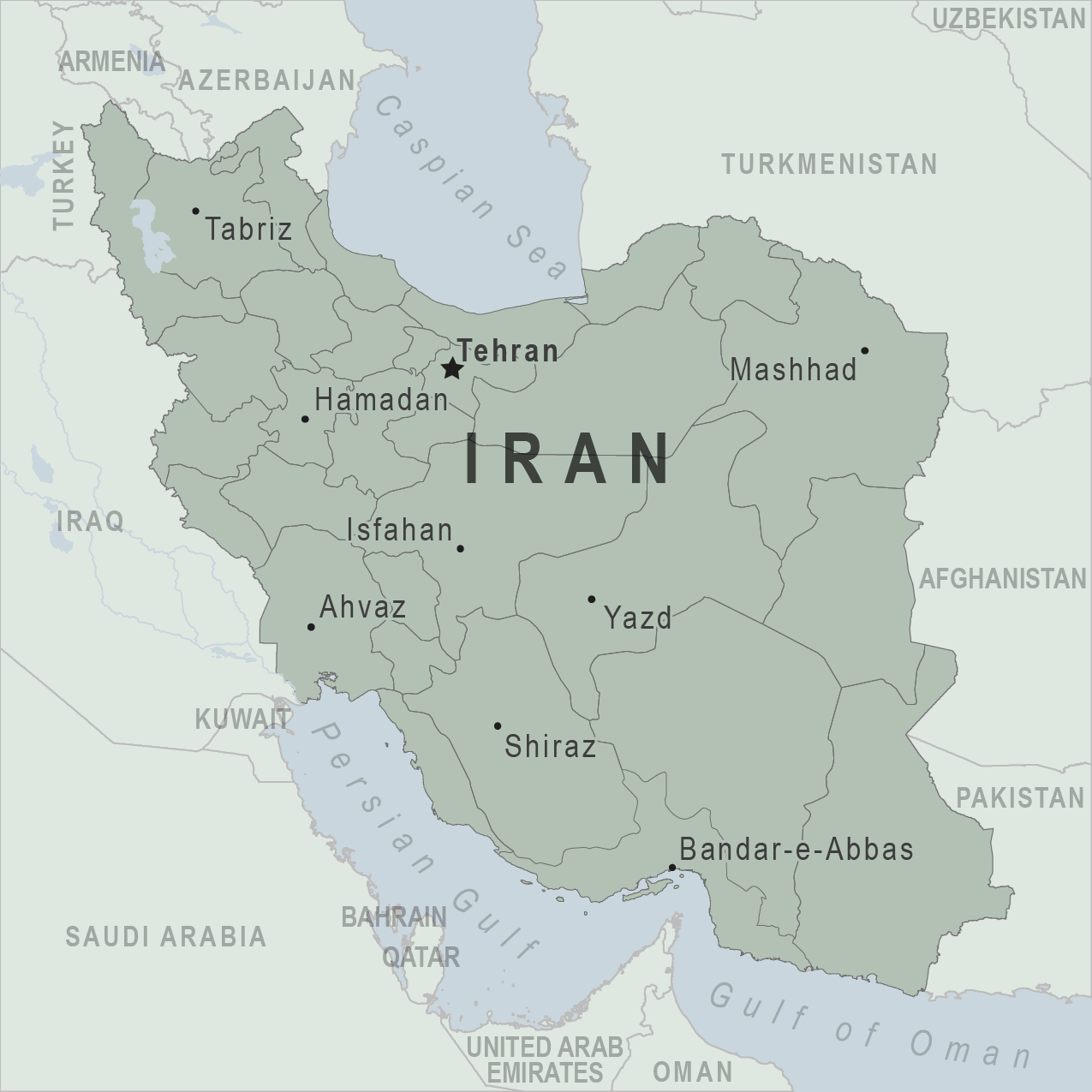
There are no notices currently in effect for Iran.
⇧ Top
Check the vaccines and medicines list and visit your doctor at least a month before your trip to get vaccines or medicines you may need. If you or your doctor need help finding a location that provides certain vaccines or medicines, visit the Find a Clinic page.
Routine vaccines
Recommendations.
Make sure you are up-to-date on all routine vaccines before every trip. Some of these vaccines include
- Chickenpox (Varicella)
- Diphtheria-Tetanus-Pertussis
- Flu (influenza)
- Measles-Mumps-Rubella (MMR)
Immunization schedules
All eligible travelers should be up to date with their COVID-19 vaccines. Please see Your COVID-19 Vaccination for more information.
COVID-19 vaccine
Hepatitis A
Recommended for unvaccinated travelers one year old or older going to Iran.
Infants 6 to 11 months old should also be vaccinated against Hepatitis A. The dose does not count toward the routine 2-dose series.
Travelers allergic to a vaccine component or who are younger than 6 months should receive a single dose of immune globulin, which provides effective protection for up to 2 months depending on dosage given.
Unvaccinated travelers who are over 40 years old, immunocompromised, or have chronic medical conditions planning to depart to a risk area in less than 2 weeks should get the initial dose of vaccine and at the same appointment receive immune globulin.
Hepatitis A - CDC Yellow Book
Dosing info - Hep A
Hepatitis B
Recommended for unvaccinated travelers younger than 60 years old traveling to Iran. Unvaccinated travelers 60 years and older may get vaccinated before traveling to Iran.
Hepatitis B - CDC Yellow Book
Dosing info - Hep B
Cases of measles are on the rise worldwide. Travelers are at risk of measles if they have not been fully vaccinated at least two weeks prior to departure, or have not had measles in the past, and travel internationally to areas where measles is spreading.
All international travelers should be fully vaccinated against measles with the measles-mumps-rubella (MMR) vaccine, including an early dose for infants 6–11 months, according to CDC’s measles vaccination recommendations for international travel .
Measles (Rubeola) - CDC Yellow Book
Rabid dogs are commonly found in Iran. If you are bitten or scratched by a dog or other mammal while in Iran, there may be limited or no rabies treatment available.
Consider rabies vaccination before your trip if your activities mean you will be around dogs or wildlife.
Travelers more likely to encounter rabid animals include
- Campers, adventure travelers, or cave explorers (spelunkers)
- Veterinarians, animal handlers, field biologists, or laboratory workers handling animal specimens
- Visitors to rural areas
Since children are more likely to be bitten or scratched by a dog or other animals, consider rabies vaccination for children traveling to Iran.
Rabies - CDC Yellow Book
Recommended for most travelers, especially those staying with friends or relatives or visiting smaller cities or rural areas.
Typhoid - CDC Yellow Book
Dosing info - Typhoid
Yellow Fever
Required for travelers ≥9 months old arriving from countries with risk for YF virus transmission; this includes >12-hour airport transits or layovers in countries with risk for YF virus transmission. 1
Yellow Fever - CDC Yellow Book
- Avoid contaminated water
Leptospirosis
How most people get sick (most common modes of transmission)
- Touching urine or other body fluids from an animal infected with leptospirosis
- Swimming or wading in urine-contaminated fresh water, or contact with urine-contaminated mud
- Drinking water or eating food contaminated with animal urine
- Avoid contaminated water and soil
Clinical Guidance
Schistosomiasis
- Wading, swimming, bathing, or washing in contaminated freshwater streams, rivers, ponds, lakes, or untreated pools.
Avoid bug bites
Crimean-Congo Hemorrhagic fever
- Tick bite
- Touching the body fluids of a person or animal infected with CCHF
- Avoid Bug Bites
- Mosquito bite
Leishmaniasis
- Sand fly bite
Airborne & droplet
Avian/bird flu.
- Being around, touching, or working with infected poultry, such as visiting poultry farms or live-animal markets
- Avoid domestic and wild poultry
- Breathing in air or accidentally eating food contaminated with the urine, droppings, or saliva of infected rodents
- Bite from an infected rodent
- Less commonly, being around someone sick with hantavirus (only occurs with Andes virus)
- Avoid rodents and areas where they live
- Avoid sick people
Middle East Respiratory Syndrome (MERS)
- Scientists do not fully understand how the MERS virus spreads
- May spread from to others when an infected person coughs or sneezes
- May spread to people from camels.
Middle East Respiratory virus syndrome (MERS)
Tuberculosis (TB)
- Breathe in TB bacteria that is in the air from an infected and contagious person coughing, speaking, or singing.
Learn actions you can take to stay healthy and safe on your trip. Vaccines cannot protect you from many diseases in Iran, so your behaviors are important.
Eat and drink safely
Food and water standards around the world vary based on the destination. Standards may also differ within a country and risk may change depending on activity type (e.g., hiking versus business trip). You can learn more about safe food and drink choices when traveling by accessing the resources below.
- Choose Safe Food and Drinks When Traveling
- Water Treatment Options When Hiking, Camping or Traveling
- Global Water, Sanitation and Hygiene | Healthy Water
- Avoid Contaminated Water During Travel
You can also visit the Department of State Country Information Pages for additional information about food and water safety.
Prevent bug bites
Bugs (like mosquitoes, ticks, and fleas) can spread a number of diseases in Iran. Many of these diseases cannot be prevented with a vaccine or medicine. You can reduce your risk by taking steps to prevent bug bites.
What can I do to prevent bug bites?
- Cover exposed skin by wearing long-sleeved shirts, long pants, and hats.
- Use an appropriate insect repellent (see below).
- Use permethrin-treated clothing and gear (such as boots, pants, socks, and tents). Do not use permethrin directly on skin.
- Stay and sleep in air-conditioned or screened rooms.
- Use a bed net if the area where you are sleeping is exposed to the outdoors.
What type of insect repellent should I use?
- FOR PROTECTION AGAINST TICKS AND MOSQUITOES: Use a repellent that contains 20% or more DEET for protection that lasts up to several hours.
- Picaridin (also known as KBR 3023, Bayrepel, and icaridin)
- Oil of lemon eucalyptus (OLE) or para-menthane-diol (PMD)
- 2-undecanone
- Always use insect repellent as directed.
What should I do if I am bitten by bugs?
- Avoid scratching bug bites, and apply hydrocortisone cream or calamine lotion to reduce the itching.
- Check your entire body for ticks after outdoor activity. Be sure to remove ticks properly.
What can I do to avoid bed bugs?
Although bed bugs do not carry disease, they are an annoyance. See our information page about avoiding bug bites for some easy tips to avoid them. For more information on bed bugs, see Bed Bugs .
For more detailed information on avoiding bug bites, see Avoid Bug Bites .
Stay safe outdoors
If your travel plans in Iran include outdoor activities, take these steps to stay safe and healthy during your trip.
- Stay alert to changing weather conditions and adjust your plans if conditions become unsafe.
- Prepare for activities by wearing the right clothes and packing protective items, such as bug spray, sunscreen, and a basic first aid kit.
- Consider learning basic first aid and CPR before travel. Bring a travel health kit with items appropriate for your activities.
- If you are outside for many hours in heat, eat salty snacks and drink water to stay hydrated and replace salt lost through sweating.
- Protect yourself from UV radiation : use sunscreen with an SPF of at least 15, wear protective clothing, and seek shade during the hottest time of day (10 a.m.–4 p.m.).
- Be especially careful during summer months and at high elevation. Because sunlight reflects off snow, sand, and water, sun exposure may be increased during activities like skiing, swimming, and sailing.
- Very cold temperatures can be dangerous. Dress in layers and cover heads, hands, and feet properly if you are visiting a cold location.
Stay safe around water
- Swim only in designated swimming areas. Obey lifeguards and warning flags on beaches.
- Practice safe boating—follow all boating safety laws, do not drink alcohol if driving a boat, and always wear a life jacket.
- Do not dive into shallow water.
- Do not swim in freshwater in developing areas or where sanitation is poor.
- Avoid swallowing water when swimming. Untreated water can carry germs that make you sick.
- To prevent infections, wear shoes on beaches where there may be animal waste.
Schistosomiasis, a parasitic infection that can be spread in fresh water, is found in Iran. Avoid swimming in fresh, unchlorinated water, such as lakes, ponds, or rivers.
Keep away from animals
Most animals avoid people, but they may attack if they feel threatened, are protecting their young or territory, or if they are injured or ill. Animal bites and scratches can lead to serious diseases such as rabies.
Follow these tips to protect yourself:
- Do not touch or feed any animals you do not know.
- Do not allow animals to lick open wounds, and do not get animal saliva in your eyes or mouth.
- Avoid rodents and their urine and feces.
- Traveling pets should be supervised closely and not allowed to come in contact with local animals.
- If you wake in a room with a bat, seek medical care immediately. Bat bites may be hard to see.
All animals can pose a threat, but be extra careful around dogs, bats, monkeys, sea animals such as jellyfish, and snakes. If you are bitten or scratched by an animal, immediately:
- Wash the wound with soap and clean water.
- Go to a doctor right away.
- Tell your doctor about your injury when you get back to the United States.
Consider buying medical evacuation insurance. Rabies is a deadly disease that must be treated quickly, and treatment may not be available in some countries.
Reduce your exposure to germs
Follow these tips to avoid getting sick or spreading illness to others while traveling:
- Wash your hands often, especially before eating.
- If soap and water aren’t available, clean hands with hand sanitizer (containing at least 60% alcohol).
- Don’t touch your eyes, nose, or mouth. If you need to touch your face, make sure your hands are clean.
- Cover your mouth and nose with a tissue or your sleeve (not your hands) when coughing or sneezing.
- Try to avoid contact with people who are sick.
- If you are sick, stay home or in your hotel room, unless you need medical care.
Avoid sharing body fluids
Diseases can be spread through body fluids, such as saliva, blood, vomit, and semen.
Protect yourself:
- Use latex condoms correctly.
- Do not inject drugs.
- Limit alcohol consumption. People take more risks when intoxicated.
- Do not share needles or any devices that can break the skin. That includes needles for tattoos, piercings, and acupuncture.
- If you receive medical or dental care, make sure the equipment is disinfected or sanitized.
Know how to get medical care while traveling
Plan for how you will get health care during your trip, should the need arise:
- Carry a list of local doctors and hospitals at your destination.
- Review your health insurance plan to determine what medical services it would cover during your trip. Consider purchasing travel health and medical evacuation insurance.
- Carry a card that identifies, in the local language, your blood type, chronic conditions or serious allergies, and the generic names of any medications you take.
- Some prescription drugs may be illegal in other countries. Call Iran’s embassy to verify that all of your prescription(s) are legal to bring with you.
- Bring all the medicines (including over-the-counter medicines) you think you might need during your trip, including extra in case of travel delays. Ask your doctor to help you get prescriptions filled early if you need to.
Many foreign hospitals and clinics are accredited by the Joint Commission International. A list of accredited facilities is available at their website ( www.jointcommissioninternational.org ).
In some countries, medicine (prescription and over-the-counter) may be substandard or counterfeit. Bring the medicines you will need from the United States to avoid having to buy them at your destination.
Malaria is a risk in some parts of Iran. If you are going to a risk area, fill your malaria prescription before you leave, and take enough with you for the entire length of your trip. Follow your doctor’s instructions for taking the pills; some need to be started before you leave.
Select safe transportation
Motor vehicle crashes are the #1 killer of healthy US citizens in foreign countries.
In many places cars, buses, large trucks, rickshaws, bikes, people on foot, and even animals share the same lanes of traffic, increasing the risk for crashes.
Be smart when you are traveling on foot.
- Use sidewalks and marked crosswalks.
- Pay attention to the traffic around you, especially in crowded areas.
- Remember, people on foot do not always have the right of way in other countries.
Riding/Driving
Choose a safe vehicle.
- Choose official taxis or public transportation, such as trains and buses.
- Ride only in cars that have seatbelts.
- Avoid overcrowded, overloaded, top-heavy buses and minivans.
- Avoid riding on motorcycles or motorbikes, especially motorbike taxis. (Many crashes are caused by inexperienced motorbike drivers.)
- Choose newer vehicles—they may have more safety features, such as airbags, and be more reliable.
- Choose larger vehicles, which may provide more protection in crashes.
Think about the driver.
- Do not drive after drinking alcohol or ride with someone who has been drinking.
- Consider hiring a licensed, trained driver familiar with the area.
- Arrange payment before departing.
Follow basic safety tips.
- Wear a seatbelt at all times.
- Sit in the back seat of cars and taxis.
- When on motorbikes or bicycles, always wear a helmet. (Bring a helmet from home, if needed.)
- Avoid driving at night; street lighting in certain parts of Iran may be poor.
- Do not use a cell phone or text while driving (illegal in many countries).
- Travel during daylight hours only, especially in rural areas.
- If you choose to drive a vehicle in Iran, learn the local traffic laws and have the proper paperwork.
- Get any driving permits and insurance you may need. Get an International Driving Permit (IDP). Carry the IDP and a US-issued driver's license at all times.
- Check with your auto insurance policy's international coverage, and get more coverage if needed. Make sure you have liability insurance.
- Avoid using local, unscheduled aircraft.
- If possible, fly on larger planes (more than 30 seats); larger airplanes are more likely to have regular safety inspections.
- Try to schedule flights during daylight hours and in good weather.
Medical Evacuation Insurance
If you are seriously injured, emergency care may not be available or may not meet US standards. Trauma care centers are uncommon outside urban areas. Having medical evacuation insurance can be helpful for these reasons.
Helpful Resources
Road Safety Overseas (Information from the US Department of State): Includes tips on driving in other countries, International Driving Permits, auto insurance, and other resources.
The Association for International Road Travel has country-specific Road Travel Reports available for most countries for a minimal fee.
Maintain personal security
Use the same common sense traveling overseas that you would at home, and always stay alert and aware of your surroundings.
Before you leave
- Research your destination(s), including local laws, customs, and culture.
- Monitor travel advisories and alerts and read travel tips from the US Department of State.
- Enroll in the Smart Traveler Enrollment Program (STEP) .
- Leave a copy of your itinerary, contact information, credit cards, and passport with someone at home.
- Pack as light as possible, and leave at home any item you could not replace.
While at your destination(s)
- Carry contact information for the nearest US embassy or consulate .
- Carry a photocopy of your passport and entry stamp; leave the actual passport securely in your hotel.
- Follow all local laws and social customs.
- Do not wear expensive clothing or jewelry.
- Always keep hotel doors locked, and store valuables in secure areas.
- If possible, choose hotel rooms between the 2nd and 6th floors.
Healthy Travel Packing List
Use the Healthy Travel Packing List for Iran for a list of health-related items to consider packing for your trip. Talk to your doctor about which items are most important for you.
Why does CDC recommend packing these health-related items?
It’s best to be prepared to prevent and treat common illnesses and injuries. Some supplies and medicines may be difficult to find at your destination, may have different names, or may have different ingredients than what you normally use.
If you are not feeling well after your trip, you may need to see a doctor. If you need help finding a travel medicine specialist, see Find a Clinic . Be sure to tell your doctor about your travel, including where you went and what you did on your trip. Also tell your doctor if you were bitten or scratched by an animal while traveling.
For more information on what to do if you are sick after your trip, see Getting Sick after Travel .
Map Disclaimer - The boundaries and names shown and the designations used on maps do not imply the expression of any opinion whatsoever on the part of the Centers for Disease Control and Prevention concerning the legal status of any country, territory, city or area or of its authorities, or concerning the delimitation of its frontiers or boundaries. Approximate border lines for which there may not yet be full agreement are generally marked.
Other Destinations
If you need help finding travel information:
Message & data rates may apply. CDC Privacy Policy
File Formats Help:
- Adobe PDF file
- Microsoft PowerPoint file
- Microsoft Word file
- Microsoft Excel file
- Audio/Video file
- Apple Quicktime file
- RealPlayer file
- Zip Archive file
Exit Notification / Disclaimer Policy
- The Centers for Disease Control and Prevention (CDC) cannot attest to the accuracy of a non-federal website.
- Linking to a non-federal website does not constitute an endorsement by CDC or any of its employees of the sponsors or the information and products presented on the website.
- You will be subject to the destination website's privacy policy when you follow the link.
- CDC is not responsible for Section 508 compliance (accessibility) on other federal or private website.
Update April 12, 2024
Information for u.s. citizens in the middle east.
- Travel Advisories |
- Contact Us |
- MyTravelGov |
Find U.S. Embassies & Consulates
Travel.state.gov, congressional liaison, special issuance agency, u.s. passports, international travel, intercountry adoption, international parental child abduction, records and authentications, popular links, travel advisories, mytravelgov, stay connected, legal resources, legal information, info for u.s. law enforcement, replace or certify documents.
Share this page:
Iran Travel Advisory
Travel advisory january 11, 2024, iran - level 4: do not travel.
Updated to add the Terrorism Risk Indicator and risk of surrogacy tourism.
Do not travel to Iran due to the risk of terrorism, civil unrest, kidnapping and the arbitrary arrest of U.S. citizens . Exercise increased caution due to wrongful detentions .
Country Summary: U.S. citizens should not travel to Iran for any reason. U.S. citizens visiting or residing in Iran have been kidnapped, arrested, and detained on spurious charges.
Iranian authorities continue to unjustly detain and imprison U.S. nationals, particularly dual national U.S.-Iranian nationals--including students, journalists, business travelers, and academics--on charges including espionage and posing a threat to national security. Iranian authorities routinely delay consular access to detained U.S. nationals and consistently deny consular access to dual U.S.-Iranian nationals.
Violent extremist groups, including U.S. government-designated terrorist organizations, operate in Iran. ISIS and affiliated groups have claimed responsibility for bombings and other attacks in Iran. The threat of terrorist activity persists, as does the risk of death or injury to bystanders.
The U.S. government does not have diplomatic or consular relations with the Islamic Republic of Iran. The U.S. government is unable to provide routine or emergency consular services to U.S. citizens in Iran.
Companies offering surrogacy services in Iran are misrepresenting the security situation in Iran and the risks of the unregulated surrogacy tourism industry. Private companies that arrange such visits and services put U.S. citizens in danger.
Due to the risks of operating civilian aircraft within or in the vicinity of Iran, the Federal Aviation Administration (FAA) has issued a Notice to Air Missions (NOTAM) and/or a Special Federal Aviation Regulation (SFAR). For more information U.S. citizens should consult the Federal Aviation Administration’s Prohibitions, Restrictions and Notices .
Read the country information page for additional information on travel to Iran.
If you are currently in Iran:
- Consider the risks involved in possessing dual U.S. Iranian nationality .
- Review your personal security plan and visit our website for Travel to High-Risk Areas .
- Draft a will and designate appropriate insurance beneficiaries and/or power of attorney.
- Discuss a plan with loved ones regarding care/custody of children, pets, property, belongings, non-liquid assets (collections, artwork, etc.), funeral wishes, etc.
- Establish your own personal security plan in coordination with your employer or host organization or consider consulting with a professional security organization.
- Leave DNA samples with your medical provider.
- Have a plan for departing Iran that does not rely on U.S. government assistance.
- Enroll in the Smart Traveler Enrollment Program (STEP) to receive Alerts and make it easier to locate you in an emergency.
- Follow the Department of State on Facebook and Twitter/X .
- Visit the CDC page for the latest Travel Health Information related to your travel.
- Prepare a contingency plan for emergency situations. Review the Traveler’s Checklist .
Travel Advisory Levels
Assistance for u.s. citizens, search for travel advisories, external link.
You are about to leave travel.state.gov for an external website that is not maintained by the U.S. Department of State.
Links to external websites are provided as a convenience and should not be construed as an endorsement by the U.S. Department of State of the views or products contained therein. If you wish to remain on travel.state.gov, click the "cancel" message.
You are about to visit:
- Politics & Security
- Economy & Business
Iran lifts COVID-related travel bans
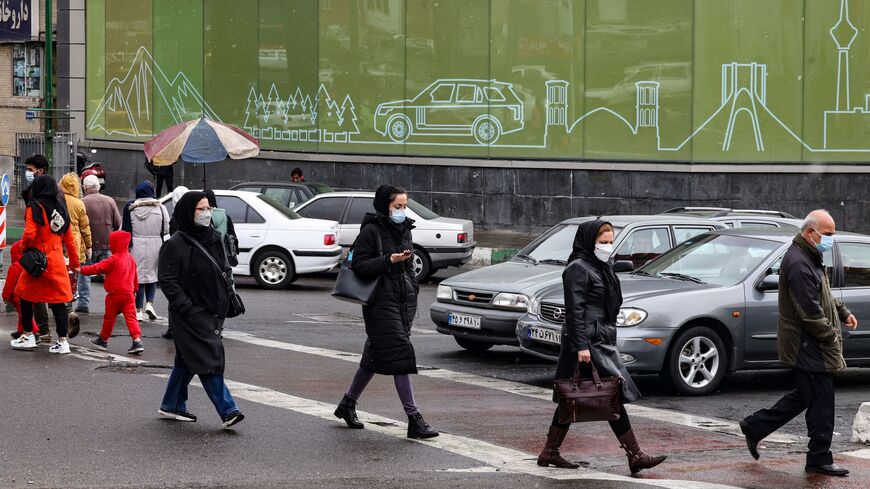
The Iranian government Wednesday removed coronavirus-related restrictions on citizens entering the country.
The Civil Aviation Authority made the decision following a meeting with the Islamic Republic’s COVID-19 task force. There are no more travel bans from any country related to the virus. Travelers can enter Iran provided they have received at least two doses of a COVID-19 vaccine and have a negative PCR test. This applies to travelers who are more than 12 years old, the official Islamic Republic News Agency reported .
Access the Middle East news and analysis you can trust
Join our community of Middle East readers to experience all of Al-Monitor, including 24/7 news, analyses, memos, reports and newsletters.
Only $100 per year.
Sign up for our newsletter
Daily briefing, the takeaway, week in review, business & tech briefing, security briefing, china-middle east briefing, gulf briefing, turkey briefing, israel briefing, palestine briefing, us confrontation with iran’s proxies: live q&a with jared szuba and elizabeth hagedorn.

The Israel-Hamas War: Live Q&A with Amb. David Satterfield (Part 2)

Choose your path to continue reading
Enjoy your complimentary article.
Provide your email and get free access to one article.
Thank you! Check your email to view your article.
You have already accessed your free article. Please consider subscribing to access all of Al-Monitor.
Or get unlimited all-access
Subscribe now to access all Al-Monitor content.
- All News & Analysis
- Memos & Reports
- All Newsletters
Oops! It looks like you already enjoyed your free article
To continue reading Al-Monitor articles, please subscribe.
Get unlimited all-access

Guidance for travel to Iran during the coronavirus (COVID-19) pandemic
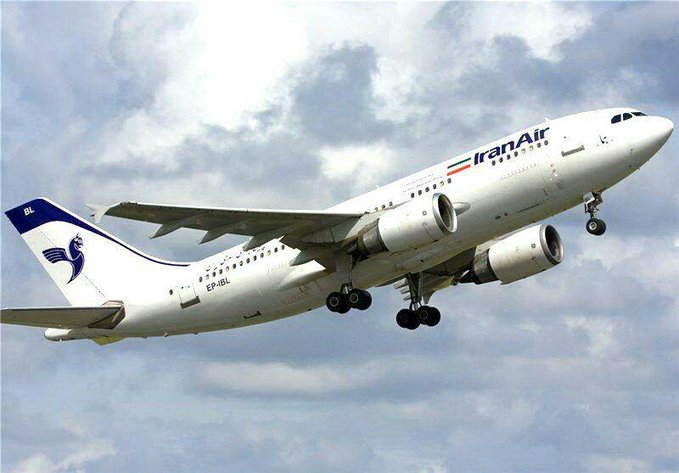
Foreign Nationals
Foreign Nationals travelling to Iran are required to present at the port of entry (POE) a negative Covid-19 (PCR) test result in English (approved by the Iranian Embassy, if in local language) taken maximum 96 hours before arrival. Failure to do so would result in the return of passengers to the ports of departure. In case of expiry of 96- hour validity of the test results passengers will be screened at the port of entry and a new test will be taken of anyone displaying symptoms of Covid-19. The tested individuals will be quarantined in a specified location until the test results are out. 14-day quarantine will be mandatory for those with positive Covid-19 test results. All costs relating to tests, accommodation and upkeep will be borne by the passengers
Iranian Nationals
Iranian nationals returning to the country after an absence of more than 2 weeks will be required to present a negative Covid-19 (PCR) test result in English (approved by the Iranian Embassy, if in local language). In case, and for justifiable reasons attested by the Iranian Embassy, it is impossible to obtain a PCR test in the country or territory of departure, airlines can conditionally allow Iran-bound passengers to board. These passengers will, however, immediately upon arrival, and without regard to clinical symptoms, undergo a Covid-19 test. They will be required to give written guarantees for self-isolation until test results are known and those with positive test results or symptoms of the disease will be subjected to a further 14-day self-isolation. Costs of tests and possible quarantine will be borne by the passengers.
Diplomats and International Agencies
Diplomats, political delegates, and employees of international agencies (based on act of reciprocity) will NOT be required to present test results but will be screened upon arrival. A test will be taken of those displaying symptoms of Covid-19. The tested individuals will be required to leave a contact telephone number and a letter guaranteeing to self-isolate at their local Embassy or specified locations until test results are out and in case of a positive test result, spend 14 days in quarantine.
All Iranian and foreign nationals (even with certificates of negative test results) will be screened upon arrival. Health service procedures will be followed for individuals with Covid-19 symptoms at specified medical and diagnostic centres.
All passengers entering the country will be required to present completed self-declaration forms obtained from the airline during or before flight. The airline, if requested by the border health authorities, is required to make available the passenger list and self-declaration forms.
All passengers leaving the country must be screened at a health service centre or at the airport. A health certificate will be issued if required by the destination country.
The international situation is very closely being monitored and this advice will be under constant review.
فایل های ضمیمه
- CurrentRate

Eid Mubarak to all Muslims around the world!

Statement of the Ministry of Foreign Affairs of the Islamic Republic of Iran on the Occasion of International Quds Day – 2024
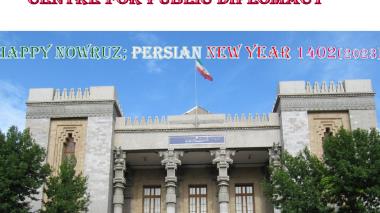
NOWRUZ TRADITIONS

Introducing a leading Iranian company in the field of transportation: Lian Visman

Pharmaceutical Companies Directory

45 YEARS OF PROGRESS

Information and Admission Requirements for International Applicants at Alzahra University

Message of H.E. Seyyed Ebrahim Raisi President of the Islamic Republic of Iran on the occasion of The International Day of Solidarity with Palestini
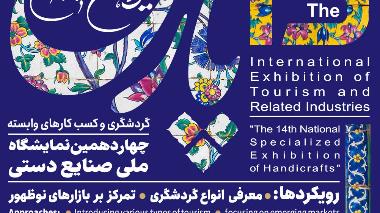
13th Intl Exhibition of Tourism Related Industries
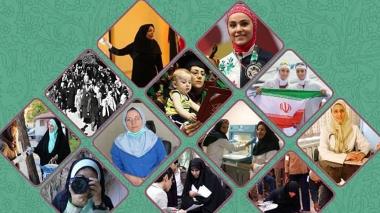
Islamic Republic of Iran’s most important achievements in the field of women and family

Amirabdollahian: Undoubtedly, the future is for Palestine

The 21th International Specialized Exhibition of Livestock, Poultry Aquaculture, Veterinary & Exportable Dairy Product
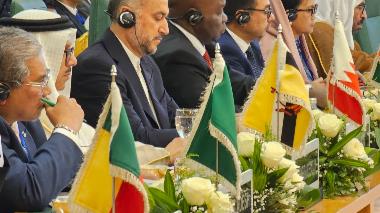
Full text of the speech by Dr. Amir Abdullahian

Embassy Statement on the Missile Strike on Hospital in Gaza

Iranian FM writes to UN Human Rights Chief, calls for measures to stop “Gaza genocide”
Iran orders travel ban and shutdown amid COVID surge
- Medium Text
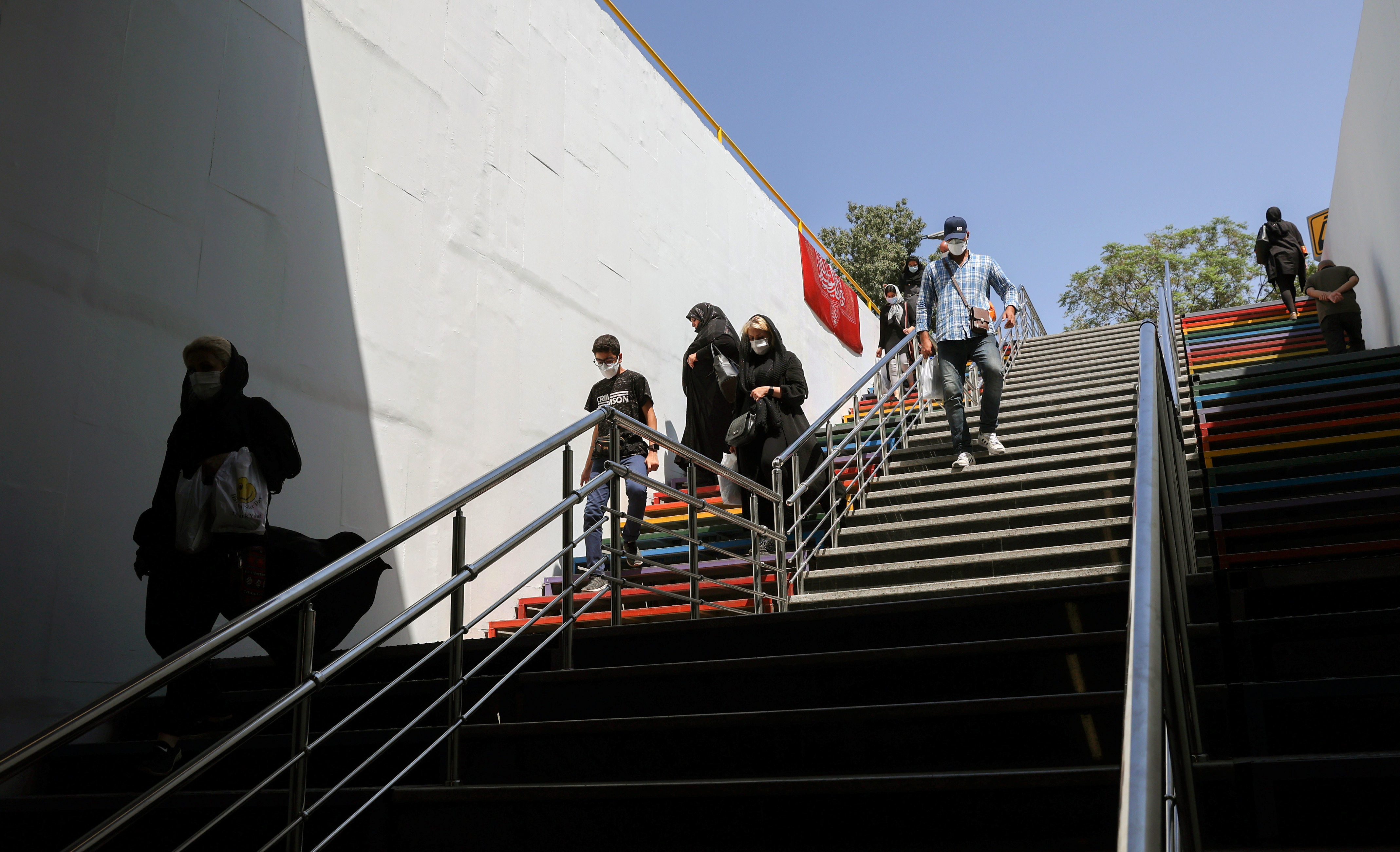
Sign up here.
Reporting by Dubai newsroom; Editing by Andrew Cawthorne
Our Standards: The Thomson Reuters Trust Principles. New Tab , opens new tab
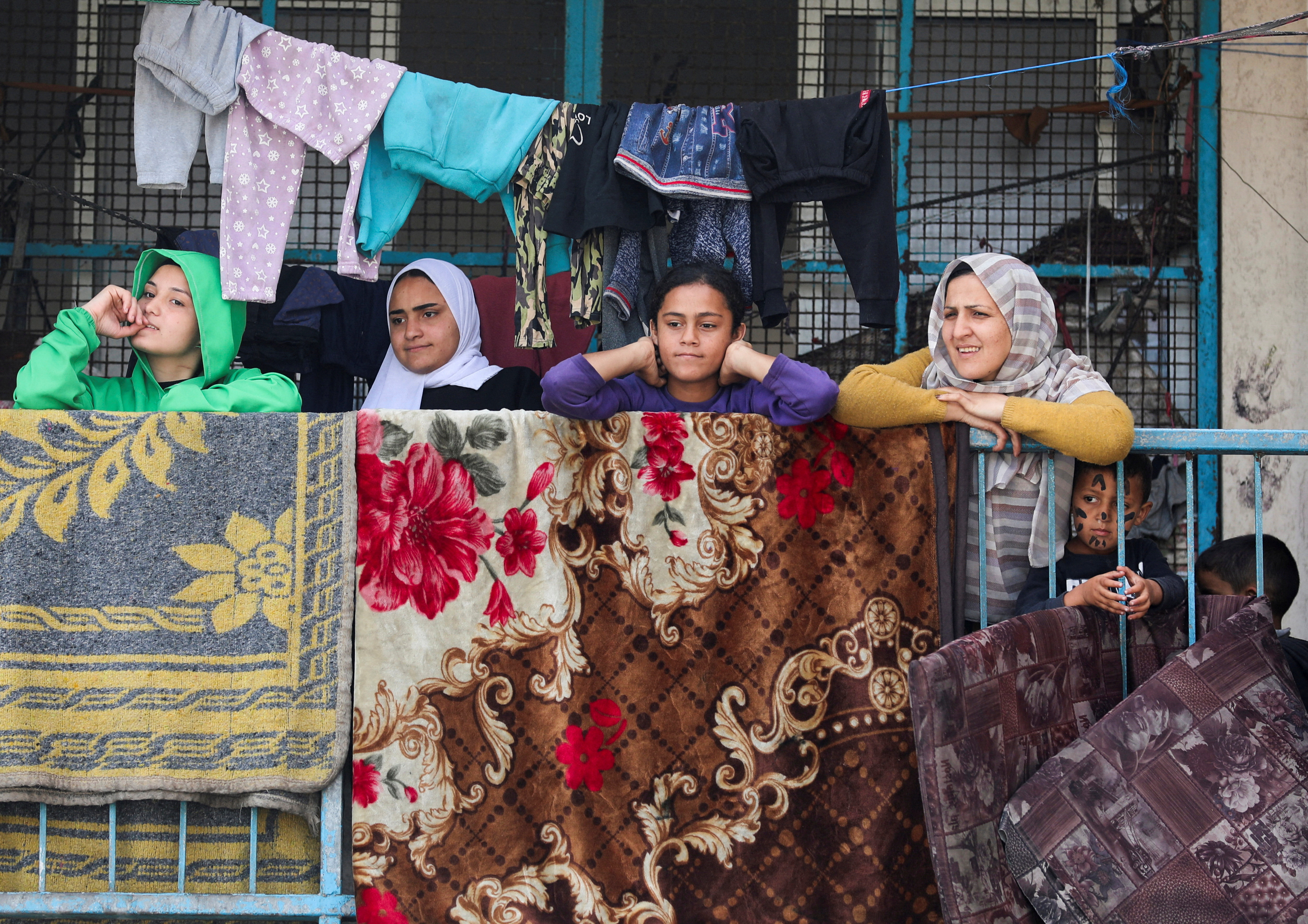
The Israeli military said artillery and fighter jet strikes had hit around 40 targets in southern Lebanon on Wednesday as the intense fighting of recent days continued to escalate, with Hezbollah firing dozens of rockets at an Israeli border village.

World Chevron
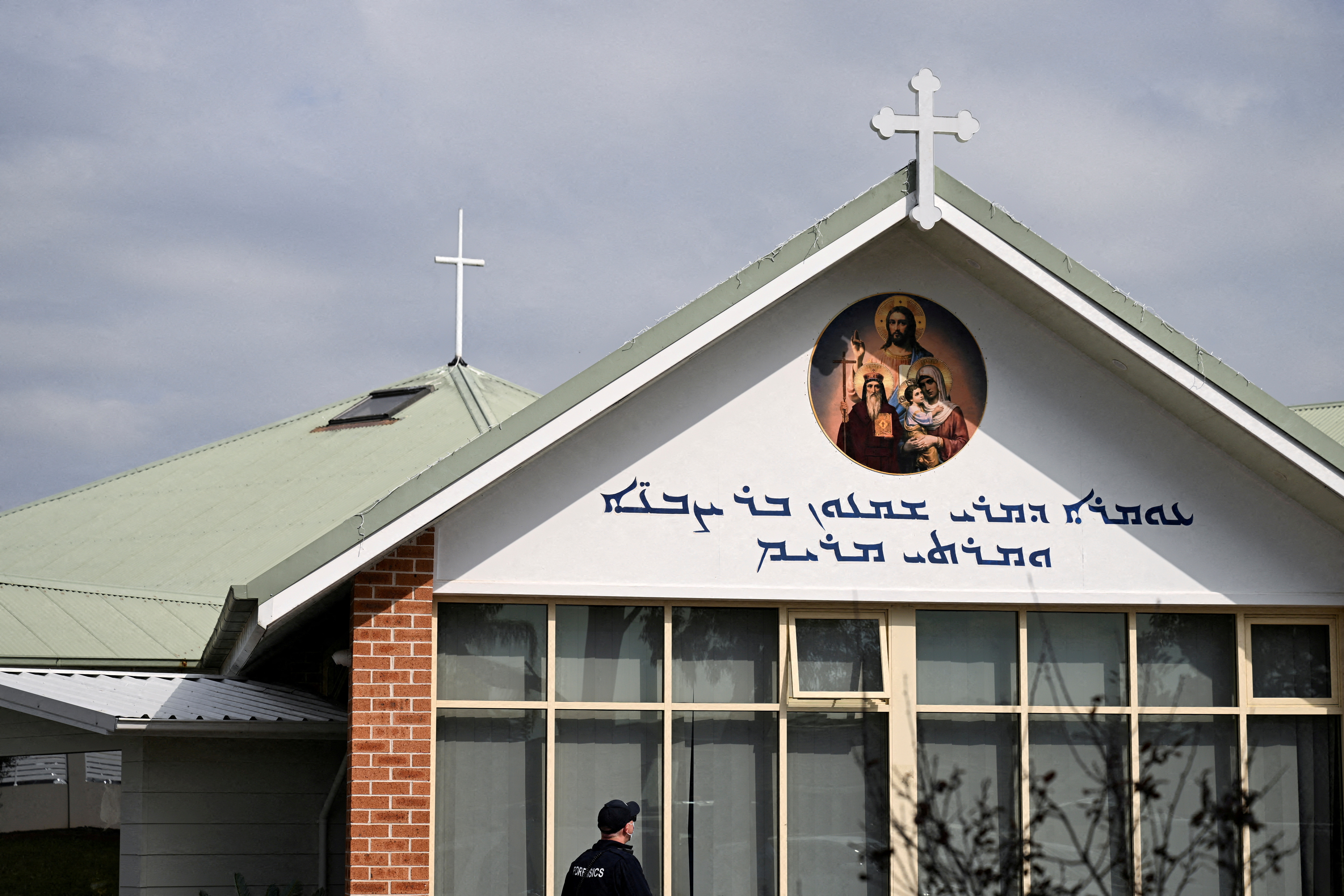
Australian police charge five teenagers in Sydney cleric's stabbing
Australian police said on Thursday they charged five teenagers with terrorism-related offences in investigations following the stabbing of an Assyrian Christian bishop while he was giving a livestreamed sermon earlier this month.
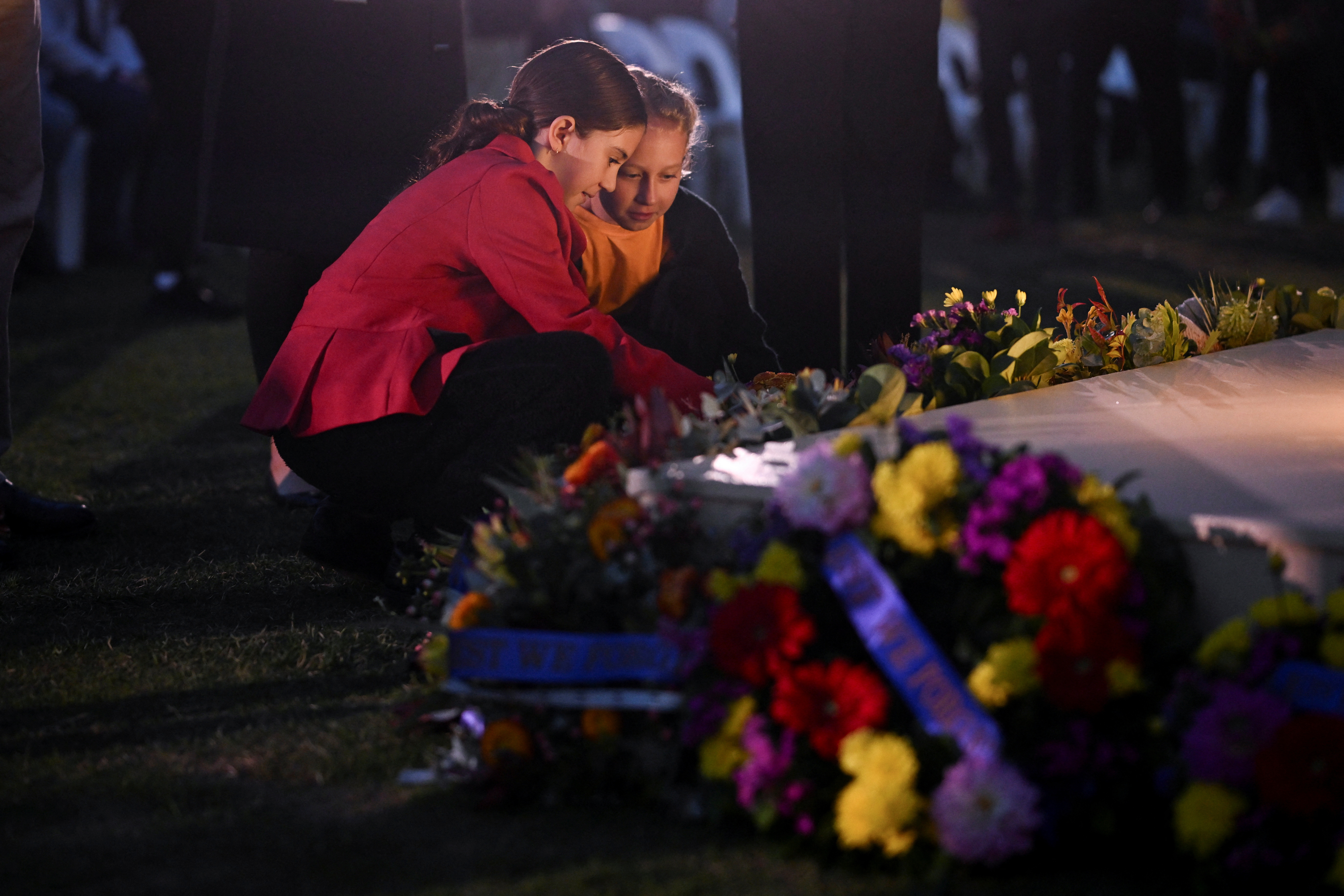
Iran imposes restrictions on unvaccinated in new COVID plan
Iran announces a new COVID-19 plan that will limit some public spaces to those with a digital pass showing they have been fully vaccinated.
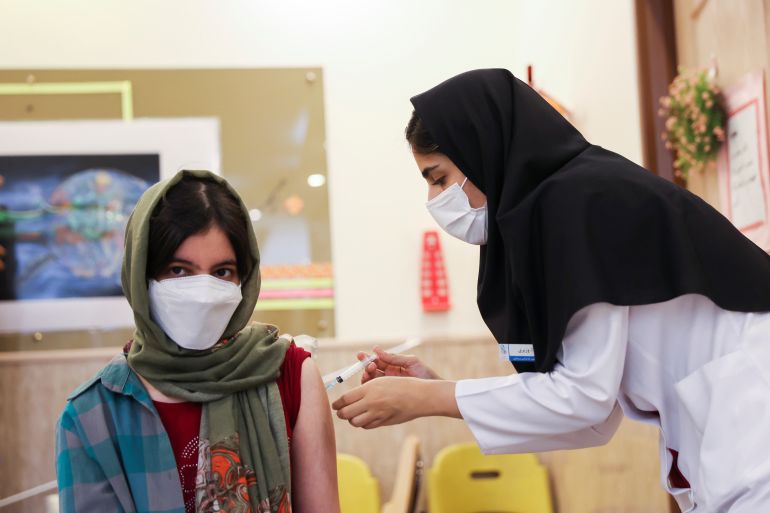
Tehran, Iran – The Iranian government has launched a “smart protocols” plan that will impose some restrictions on those unvaccinated against COVID-19, as it aims for the country to learn to “co-exist” with the coronavirus.
The plan was rolled out on Monday across the country, where a fifth deadly wave of the pandemic has been contained but concerns remain over another spike in infections , according to the health ministry.
Keep reading
Omicron: what we know about the new covid variant, brazil orders probe into bolsonaro linking covid vaccine and aids, jordan court jails health officials over covid-19 oxygen deaths.
Participation in activities in indoor public spaces and the use of public transport will be contingent on obtaining a digital vaccine pass issued by the health ministry.
The passes will be available to those who have been fully vaccinated.
Activities including attending school, going to the cinema and travelling on aeroplanes or buses to other provinces would require a digital pass, the government said.
Residents who are classed as unvaccinated would still be able to engage in indoor activities if they provide a valid negative PCR test, the government said.
Those who are either unvaccinated or infected and attempt to enter cities that are classified as “red” or “orange” in a weekly updated colour-coded map denoting the severity of outbreaks will face fines, according to the roads ministry.
It also said penalties have been considered for infected citizens who exit their homes during the period of their illness. It remains unclear how those patients are to be monitored – as Iran does not engage in widespread contact tracing – and how high the fines will be.
The health ministry wants the same protocols implemented in city-wide public transport such as metro stations and buses as well, but it appears the online infrastructure is not in place yet. More details are expected in the coming weeks.
The national anti-coronavirus task force said last month that a nighttime curfew for vehicles has been scrapped after much deliberation as it was deemed not effective enough. Last month, spectators were also allowed into a football match in Tehran’s Azadi Stadium for the first time in 22 months.
The plan was initially meant to be implemented two weeks ago but faced delays as the national vaccine rollout had not reached its target. A pilot programme was earlier implemented in three provinces to identify potential problems.
According to the latest health ministry figures, more than 58 million Iranians have received at least one dose of a COVID-19 vaccine while more than 48 million are fully vaccinated, for a nationwide rate of close to 60 percent.
After starting with healthcare workers and then moving to immunocompromised citizens and those more than 60 years of age, Iran is now offering third doses to those more than 40 who received their second dose at least three months earlier.
The pace at which jabs are being administered has slowed recently after gaining significant pace in the past three months when more jabs were imported.
The majority of vaccines imported into Iran were those of China’s Sinopharm, followed by AstraZeneca jabs. Imports were halted in September after the administration of President Ebrahim Raisi said enough doses had been stockpiled and production capacity for several locally developed vaccines had increased.
After announcing its first coronavirus deaths in February 2020, Iran has recorded the highest number of coronavirus deaths in the Middle East, with more than 130,000 officially registered deaths. The country has recorded more than 6.13 million cases since the beginning of the pandemic but officials have said real numbers are likely higher.
The fifth wave of infections, fuelled by the highly contagious Delta variant , peaked at 709 daily deaths in late August but has since been relatively contained, with daily fatalities dropping to below 100.
Iran has yet to report a case of the new Omicron variant but health officials have warned that its entry into the country is highly likely.

Announcement
New Covid-19 requirements for entry into Iran
All passengers travelling from Greece to Iran are required to present either a negative PCR test (valid for 72 hours after issuance) or a Covid-19 vaccination certificate (undertaken at least two weeks before the trip) upon arrival in Iran.
فایل های ضمیمه
- CurrentRate
List of international exhibitions in Isfahan Province
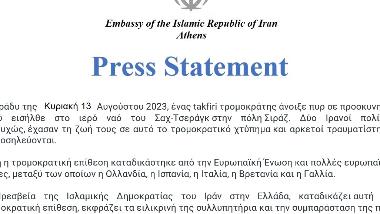
Condemnation of Shahcheraq terrorist attack
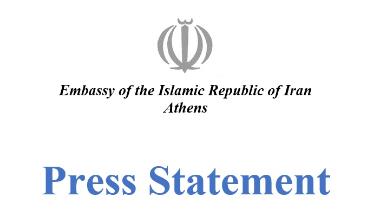
Statement by the Embassy of the Islamic Republic of Iran

Outstanding achievements by Iranian women in economy and industry exhibition

Introducing Iran’s House of Innovation and Technology

10-Day Celebrations in Iran to mark the victory of the Islamic revolution of 1979
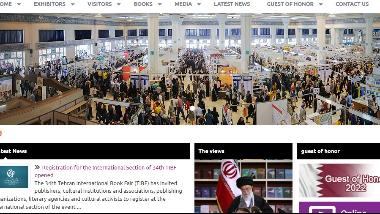
The 34th Tehran International Book Fair

Sixth Specialized Exhibition of Shoe Industry

Iran Expo 2023
Seventh iran renewable energy exhibition and conference, sixteenth international exhibition of iran tourism and related industries.

Products of Iranian knowledge-based companies go online
Upcoming international expos in tehran, investment opportunities in isfahan.

International Nanotechnology Expo in Tehran
- Skip to main content
- Skip to "About this site"
Language selection
Search travel.gc.ca.
Help us to improve our website. Take our survey !
COVID-19: travel health notice for all travellers
Iran travel advice
Latest updates: Safety and security – removed information for Canadians in the Middle East
Last updated: April 14, 2024 13:29 ET
On this page
Safety and security, entry and exit requirements, laws and culture, natural disasters and climate, iran - avoid all travel.
You should consider leaving by commercial means if you can do so safely. Our ability to provide consular services in Iran is severely limited.
Back to top
There is no resident Canadian government office in the country. The ability of Canadian officials to provide consular assistance is extremely limited.
Canadians in Iran may be closely watched by Iranian authorities. Seemingly innocuous behaviours, such as the use of cameras in public places, travel beyond well-established tourist attractions or casual interactions with Iranian friends, may be misinterpreted and may lead to investigation.
Demonstrations
Political demonstrations and gatherings may occur.
Large-scale and violent protests took place across Iran in the Fall of 2022 following the strict enforcement of the hijab law by the Iranian authorities. Security forces strongly repressed demonstrators resulting in numerous arrests, injuries and casualties. In some cases, arrested individuals were sentenced to death for charges arising from their participation in the demonstrations.
The situation remains highly volatile and could escalate without notice. Even peaceful demonstrations can turn violent at any time. Security forces could use excessive and lethal force to disperse crowds. They can also lead to disruptions to traffic and public transportation. Disruptions to telecommunications services, including mobile internet access, may occur during large-scale demonstrations.
- Avoid areas where demonstrations and large gatherings are taking place
- Monitor local and international media for information on ongoing demonstrations
Mass gatherings (large-scale events)
Border areas
Pakistan and afghanistan.
Bandits in border areas with Afghanistan and Pakistan are usually involved in drug trafficking and use kidnapping to secure the release of group members from prison.
Sistan-Baluchistan, which borders Pakistan, is regularly affected by ethnic conflicts and is also a known route for smugglers. Foreign nationals have been the target of kidnappings.
Terrorist attacks may also occur in this province.
If you decide to travel overland to Pakistan and Afghanistan despite this warning:
- travel only on main roads
- travel in organized groups
- avoid travel after dark
The province of Khuzestan borders Iraq. It is regularly affected by ethnic conflicts. Foreign nationals have been the target of kidnappings.
Border with Iraq is usually closed. It can be opened on a case-by-case basis to allow the passage of certain foreigners or to give refugees access to containment camps located on the Iranian side of the border.
Azerbaijan and Turkmenistan
The borders with Azerbaijan and Turkmenistan are open only to citizens of those countries.
Foreigners travelling in the vicinity of these sensitive borders often attract the attention of local security forces, which can result in short periods of detention.
There is an increased threat of attacks against Western interests and of terrorist attacks in general. The security situation could worsen rapidly and with little warning.
Attacks have targeted:
- foreign interests
- Iranian military and government establishments
- tourist attractions and popular public places
- nightclubs and entertainment venues
- public transportation
Further attacks may occur, and terrorists may also target:
- crowded places
- places with high pedestrian traffic where foreigners may gather
- commercial establishments
- local government offices
- public transit stations
- busy streets
- places of worship
Exercise a high degree of caution at all times.
Kidnapping for ransom can occur, especially in Baluchistan and in the border areas with Afghanistan and Pakistan. Foreign nationals have also been the target of kidnapping.
Use varied and unpredictable routes and schedules when moving from one place to another.
Petty crime
Petty crime, such as pickpocketing and purse snatching, occurs. Violent crime affects both Iranians and foreigners.
Thieves often target four-wheel-drive vehicles.
Plainclothes individuals may pose as police officers and ask to see foreign currency and passports. If you are approached, you should politely decline to cooperate but offer to go to the nearest police station.
- Avoid showing signs of affluence, such as flashy jewellery
- Ensure personal belongings, including your passports and other travel documents, are secure at all times
- Carry a photocopy of your passport’s identification page at all times and leave a photocopy with a relative
- Don’t surrender any documents or cash
- Stay in touch with family and friends, especially if you’re travelling alone
- Avoid walking after dark
Women's safety
Women may be subject to some forms of harassment and verbal abuse. Gender-based violence is common in Iran.
Some Canadian and Canadian-Iranian women have been stranded in Iran or mistreated by an Iranian husband or a male relative. Local authorities consider domestic violence to be a private matter and rarely discuss it in public.
Women and children require the permission of the husband, or an Iranian male head of household, to obtain a passport or travel document. They also require permission to leave the country.
The dress code is strictly enforced in Iran. Women must wear a headscarf and a long jacket that covers the arms and upper legs while in public.
Advice for women travellers
Road safety
Road conditions and road safety can vary greatly throughout the country, and city streets are poorly lit. The highway system is relatively well developed.
Trucks run mostly at night, often without headlights. Motorists are reckless and don’t respect traffic laws. They almost never give way to pedestrians at designated crossing points. Parked cars may obstruct sidewalks on main roads in urban areas. Sidewalks are rare in residential areas.
Expect roadblocks and checkpoints.
- Avoid travelling at night
- Consider hiring a personal driver who’s familiar with local conditions
- If you are involved in an accident, remain at the scene until authorities arrive
Public transportation
Most taxis don’t have meters. Drivers often overcharge foreigners.
- Only hire official taxis from agencies or hotel-based companies
- Take pre-booked official taxis, which are safer than those hailed from the street
- Negotiate fares in advance, or insist that the driver use the meter
- Never enter a cab if it already has one or more passengers
- Note the licence plate number and name of the driver when you travel
- Immediately communicate this information to family or friends
Railway transport
Trains are comfortable and punctual, but service is limited and slow.
Iran and the United Arab Emirates both claim sovereignty over the islands in the Gulf and the military patrols the waters. Foreigners navigating Iranian waters have been arrested and detained. In September 2019, Iranian authorities specifically called for the seizure of Canadian assets and vessels.
Exercise caution if travelling by sea, including for recreational purposes, particularly around the disputed islands of Abu Musa and Tunb.
We do not make assessments on the compliance of foreign domestic airlines with international safety standards.
Information about foreign domestic airlines
Every country or territory decides who can enter or exit through its borders. The Government of Canada cannot intervene on your behalf if you do not meet your destination’s entry or exit requirements.
We have obtained the information on this page from the Iranian authorities. It can, however, change at any time.
Verify this information with the Foreign Representatives in Canada .
Canadians can verify this information with the Interests Section of the Islamic Republic of Iran of the Embassy of Pakistan in Washington, D.C.
- Interests Section of the Islamic Republic of Iran – Embassy of Pakistan in Washington, D.C.
Entry requirements vary depending on the type of passport you use for travel.
Before you travel, check with your transportation company about passport requirements. Its rules on passport validity may be more stringent than the country’s entry rules.
Regular Canadian passport
Your passport must be valid for at least 6 months beyond the date you expect to leave Iran.
Passport for official travel
Different entry rules may apply.
Official travel
Passport with “X” gender identifier
While the Government of Canada issues passports with an “X” gender identifier, it cannot guarantee your entry or transit through other countries. You might face entry restrictions in countries that do not recognize the “X” gender identifier. Before you leave, check with the closest foreign representative for your destination.
Other travel documents
Different entry rules may apply when travelling with a temporary passport or an emergency travel document. Before you leave, check with the closest foreign representative for your destination.
Useful links
- Foreign Representatives in Canada
- Canadian passports
Tourist visa: required Business visa: required Student visa: required Pilgrimage visa: required Press visa: required Transit visa: required
Overstaying your visa period may lead to detention, imprisonment and fines. You will be required to remain in Iran until the situation has been resolved.
- E-Visa Portal – Ministry of Foreign Affairs of the Government of Iran
Transit pass
If you enter Iran with a transit pass issued by an Iranian embassy or consulate abroad, you may have to obtain an Iranian passport to exit the country.
Regional travel
Canadians have been denied entry into Iran because their passports bore an Israeli visa, an Israeli border stamp or an Egyptian or Jordanian border stamp issued by an office bordering Israel. Such a stamp would indicate the traveller entered from Israel.
Children and travel
Learn more about travelling with children .
Yellow fever
Learn about potential entry requirements related to yellow fever (vaccines section).
Relevant Travel Health Notices
- Global Measles Notice - 13 March, 2024
- COVID-19 and International Travel - 13 March, 2024
This section contains information on possible health risks and restrictions regularly found or ongoing in the destination. Follow this advice to lower your risk of becoming ill while travelling. Not all risks are listed below.
Consult a health care professional or visit a travel health clinic preferably 6 weeks before you travel to get personalized health advice and recommendations.
Routine vaccines
Be sure that your routine vaccinations , as per your province or territory , are up-to-date before travelling, regardless of your destination.
Some of these vaccinations include measles-mumps-rubella (MMR), diphtheria, tetanus, pertussis, polio, varicella (chickenpox), influenza and others.
Pre-travel vaccines and medications
You may be at risk for preventable diseases while travelling in this destination. Talk to a travel health professional about which medications or vaccines may be right for you, based on your destination and itinerary.
Yellow fever is a disease caused by a flavivirus from the bite of an infected mosquito.
Travellers get vaccinated either because it is required to enter a country or because it is recommended for their protection.
- There is no risk of yellow fever in this country.
Country Entry Requirement*
- Proof of vaccination is required if you are coming from or have transited through an airport of a country where yellow fever occurs.
Recommendation
- Vaccination is not recommended.
- Discuss travel plans, activities, and destinations with a health care professional.
- Contact a designated Yellow Fever Vaccination Centre well in advance of your trip to arrange for vaccination.
About Yellow Fever
Yellow Fever Vaccination Centres in Canada * It is important to note that country entry requirements may not reflect your risk of yellow fever at your destination. It is recommended that you contact the nearest diplomatic or consular office of the destination(s) you will be visiting to verify any additional entry requirements.
There is a risk of hepatitis A in this destination. It is a disease of the liver. People can get hepatitis A if they ingest contaminated food or water, eat foods prepared by an infectious person, or if they have close physical contact (such as oral-anal sex) with an infectious person, although casual contact among people does not spread the virus.
Practise safe food and water precautions and wash your hands often. Vaccination is recommended for all travellers to areas where hepatitis A is present.
Measles is a highly contagious viral disease. It can spread quickly from person to person by direct contact and through droplets in the air.
Anyone who is not protected against measles is at risk of being infected with it when travelling internationally.
Regardless of where you are going, talk to a health care professional before travelling to make sure you are fully protected against measles.
Hepatitis B is a risk in every destination. It is a viral liver disease that is easily transmitted from one person to another through exposure to blood and body fluids containing the hepatitis B virus. Travellers who may be exposed to blood or other bodily fluids (e.g., through sexual contact, medical treatment, sharing needles, tattooing, acupuncture or occupational exposure) are at higher risk of getting hepatitis B.
Hepatitis B vaccination is recommended for all travellers. Prevent hepatitis B infection by practicing safe sex, only using new and sterile drug equipment, and only getting tattoos and piercings in settings that follow public health regulations and standards.
Coronavirus disease (COVID-19) is an infectious viral disease. It can spread from person to person by direct contact and through droplets in the air.
It is recommended that all eligible travellers complete a COVID-19 vaccine series along with any additional recommended doses in Canada before travelling. Evidence shows that vaccines are very effective at preventing severe illness, hospitalization and death from COVID-19. While vaccination provides better protection against serious illness, you may still be at risk of infection from the virus that causes COVID-19. Anyone who has not completed a vaccine series is at increased risk of being infected with the virus that causes COVID-19 and is at greater risk for severe disease when travelling internationally.
Before travelling, verify your destination’s COVID-19 vaccination entry/exit requirements. Regardless of where you are going, talk to a health care professional before travelling to make sure you are adequately protected against COVID-19.
The best way to protect yourself from seasonal influenza (flu) is to get vaccinated every year. Get the flu shot at least 2 weeks before travelling.
The flu occurs worldwide.
- In the Northern Hemisphere, the flu season usually runs from November to April.
- In the Southern Hemisphere, the flu season usually runs between April and October.
- In the tropics, there is flu activity year round.
The flu vaccine available in one hemisphere may only offer partial protection against the flu in the other hemisphere.
The flu virus spreads from person to person when they cough or sneeze or by touching objects and surfaces that have been contaminated with the virus. Clean your hands often and wear a mask if you have a fever or respiratory symptoms.
Malaria is a serious and sometimes fatal disease that is caused by parasites spread through the bites of mosquitoes. Limited malaria transmission may occur in this destination, but risk to travellers is very low. Antimalarial medication is not recommended for most travellers. Consult a health care professional or visit a travel health clinic before travelling to discuss your options. It is recommended to do this 6 weeks before travel, however, it is still a good idea any time before leaving. Protect yourself from mosquito bites at all times:
- Cover your skin and use an approved insect repellent on uncovered skin.
- Exclude mosquitoes from your living area with screening and/or closed, well-sealed doors and windows.
- Use insecticide-treated bed nets if mosquitoes cannot be excluded from your living area.
- Wear permethrin-treated clothing.
If you develop symptoms similar to malaria when you are travelling or up to a year after you return home, see a health care professional immediately. Tell them where you have been travelling or living.
In this destination, rabies is commonly carried by dogs and some wildlife, including bats. Rabies is a deadly disease that spreads to humans primarily through bites or scratches from an infected animal. While travelling, take precautions , including keeping your distance from animals (including free-roaming dogs), and closely supervising children.
If you are bitten or scratched by a dog or other animal while travelling, immediately wash the wound with soap and clean water and see a health care professional. In this destination, rabies treatment may be limited or may not be available, therefore you may need to return to Canada for treatment.
Before travel, discuss rabies vaccination with a health care professional. It may be recommended for travellers who are at high risk of exposure (e.g., occupational risk such as veterinarians and wildlife workers, children, adventure travellers and spelunkers, and others in close contact with animals).
Safe food and water precautions
Many illnesses can be caused by eating food or drinking beverages contaminated by bacteria, parasites, toxins, or viruses, or by swimming or bathing in contaminated water.
- Learn more about food and water precautions to take to avoid getting sick by visiting our eat and drink safely abroad page. Remember: Boil it, cook it, peel it, or leave it!
- Avoid getting water into your eyes, mouth or nose when swimming or participating in activities in freshwater (streams, canals, lakes), particularly after flooding or heavy rain. Water may look clean but could still be polluted or contaminated.
- Avoid inhaling or swallowing water while bathing, showering, or swimming in pools or hot tubs.
Cholera is a risk in parts of this country. Most travellers are at very low risk.
To protect against cholera, all travellers should practise safe food and water precautions .
Travellers at higher risk of getting cholera include those:
- visiting, working or living in areas with limited access to safe food, water and proper sanitation
- visiting areas where outbreaks are occurring
Vaccination may be recommended for high-risk travellers, and should be discussed with a health care professional.
Travellers' diarrhea is the most common illness affecting travellers. It is spread from eating or drinking contaminated food or water.
Risk of developing travellers' diarrhea increases when travelling in regions with poor standards of hygiene and sanitation. Practise safe food and water precautions.
The most important treatment for travellers' diarrhea is rehydration (drinking lots of fluids). Carry oral rehydration salts when travelling.
Typhoid is a bacterial infection spread by contaminated food or water. Risk is higher among children, travellers going to rural areas, travellers visiting friends and relatives or those travelling for a long period of time.
Travellers visiting regions with a risk of typhoid, especially those exposed to places with poor sanitation, should speak to a health care professional about vaccination.
Insect bite prevention
Many diseases are spread by the bites of infected insects such as mosquitoes, ticks, fleas or flies. When travelling to areas where infected insects may be present:
- Use insect repellent (bug spray) on exposed skin
- Cover up with light-coloured, loose clothes made of tightly woven materials such as nylon or polyester
- Minimize exposure to insects
- Use mosquito netting when sleeping outdoors or in buildings that are not fully enclosed
To learn more about how you can reduce your risk of infection and disease caused by bites, both at home and abroad, visit our insect bite prevention page.
Find out what types of insects are present where you’re travelling, when they’re most active, and the symptoms of the diseases they spread.
There is a risk of chikungunya in this country. The risk may vary between regions of a country. Chikungunya is a virus spread through the bite of an infected mosquito. Chikungunya can cause a viral disease that typically causes fever and pain in the joints. In some cases, the joint pain can be severe and last for months or years.
Protect yourself from mosquito bites at all times. There is no vaccine available for chikungunya.
Crimean-Congo haemorrhagic fever is a viral disease that can cause fever, pain and bleeding under the skin. In some cases, it can be fatal. It spreads to humans through contact with infected animal blood or tissues, or from the bite of an infected tick. Risk is generally low for most travellers. Protect yourself from tick bites and avoid animals, particularly livestock. There is no vaccine available for Crimean-Congo haemorrhagic fever.
- In this country, risk of dengue is sporadic. It is a viral disease spread to humans by mosquito bites.
- Dengue can cause flu-like symptoms. In some cases, it can lead to severe dengue, which can be fatal.
- The level of risk of dengue changes seasonally, and varies from year to year. The level of risk also varies between regions in a country and can depend on the elevation in the region.
- Mosquitoes carrying dengue typically bite during the daytime, particularly around sunrise and sunset.
- Protect yourself from mosquito bites . There is no vaccine or medication that protects against dengue fever.
Cutaneous and mucosal leishmaniasis causes skin sores and ulcers. It is caused by a parasite spread through the bite of a female sandfly.
Risk is generally low for most travellers. Protect yourself from sandfly bites, which typically occur after sunset in rural and forested areas and in some urban centres. There is no vaccine or medication to protect against leishmaniasis.
Animal precautions
Some infections, such as rabies and influenza, can be shared between humans and animals. Certain types of activities may increase your chance of contact with animals, such as travelling in rural or forested areas, camping, hiking, and visiting wet markets (places where live animals are slaughtered and sold) or caves.
Travellers are cautioned to avoid contact with animals, including dogs, livestock (pigs, cows), monkeys, snakes, rodents, birds, and bats, and to avoid eating undercooked wild game.
Closely supervise children, as they are more likely to come in contact with animals.
Cases of locally-acquired Middle East respiratory syndrome (MERS) have been reported in this country.
MERS is a viral respiratory disease caused by the Middle East respiratory syndrome coronavirus (MERS-CoV).
Some people infected with MERS-CoV experience no symptoms, while others may experience mild flu-like or more severe pneumonia-like symptoms. About one-third of reported cases have result ed in death.
Eat and drink safely , and avoid close contact with animals, especially camels. If you must visit a farm or market, make sure you practise good hygiene and wash your hands before and after contact with animals.
There is currently no licensed vaccine to protect against MERS.
Person-to-person infections
Stay home if you’re sick and practise proper cough and sneeze etiquette , which includes coughing or sneezing into a tissue or the bend of your arm, not your hand. Reduce your risk of colds, the flu and other illnesses by:
- washing your hands often
- avoiding or limiting the amount of time spent in closed spaces, crowded places, or at large-scale events (concerts, sporting events, rallies)
- avoiding close physical contact with people who may be showing symptoms of illness
Sexually transmitted infections (STIs) , HIV , and mpox are spread through blood and bodily fluids; use condoms, practise safe sex, and limit your number of sexual partners. Check with your local public health authority pre-travel to determine your eligibility for mpox vaccine.
Medical services and facilities
Good health care is limited in availability. Quality of care varies greatly throughout the country.
Make sure you get travel insurance that includes coverage for medical evacuation and hospital stays.
Travel health and safety
Air quality
Air pollution can be severe in major cities. It may affect people suffering from respiratory ailments.
During periods of high pollution:
- consult your doctor before traveling to see if the situation could affect you
- limit your activities outdoors
- monitor local media
- follow the instructions of local authorities
Keep in Mind...
The decision to travel is the sole responsibility of the traveller. The traveller is also responsible for his or her own personal safety.
Be prepared. Do not expect medical services to be the same as in Canada. Pack a travel health kit , especially if you will be travelling away from major city centres.
You must abide by local laws.
Learn about what you should do and how we can help if you are arrested or detained abroad .
Iran is under international and Canadian sanctions . While these sanctions don’t prohibit travel to Iran, they could be relevant to your travel.
Legal system
The Iranian legal system differs from the one in Canada.
You may be held for lengthy periods without access to legal counsel or consular officials if you are suspected of or witness to offences.
Penalties for possession, use or trafficking of illegal drugs and alcohol are severe. Convicted offenders can expect severe penalties, including the death penalty.
Drugs, alcohol and travel
Iran is an Islamic theocratic republic. A conservative interpretation of Islamic practices and beliefs is closely adhered to in the country’s customs, laws, and regulations.
Islamic law is strictly enforced. Breach of public morality, non-compliance with dress-code and making disparaging remarks about Islam, the clergy and religious symbols, including on social networks, are considered serious offences. They are punished severely.
Former Muslims who have converted to other religions have been subject to arrest and prosecution.
- Respect local traditions, customs, laws and religion at all times
- Be aware of your actions and behaviour
In 2024, the lunar month of Ramadan is expected to begin on or around March 10.
In public, between sunrise and sunset, refrain from:
Dress and behaviour
Iranian customs, laws and regulations reflect the conservative interpretation of traditional and Islamic practices and beliefs adhered to by the Iranian authorities.
To avoid offending local sensitivities:
- dress conservatively
- behave discreetly
- respect religious and social traditions
Shorts are considered inappropriate attire for both men and women.
Women should carry a headscarf to cover their head at all times while travelling in Iran.
There are reports indicating that the police are using surveillance cameras to identify and monitor women who don’t wear the hijab in public places, as required by Iranian law. Employers and owners of businesses such as stores, restaurants, cafés and shopping malls face closure and prosecution if they don’t enforce the hijab law.
If you promote unveiling while you are in Iran, you could face criminal charges.
Women who fail to comply with the law may face:
- arrest and detention
- jail sentences
- restricted access to public institutions such as hospitals, schools, airports and other social services .
- restricted access to mobile phones and Internet
Intimate and extramarital relations
Public displays of affection between two people of the opposite sex, especially between a non-Muslim man and a Muslim woman, is not well socially accepted.
If you engage in extramarital relationships, you may be subject to severe penalties, including the death penalty.
Canadian women who register their marriage with the Iranian authorities automatically become Iranian citizens. They are treated as such by Iranian law.
Marriage between an Iranian and a foreigner is subject to the rules of conduct and Islamic laws. As such, an Iranian husband may prevent his wife and children from leaving Iran, even if they are of foreign nationality.
Marriage Overseas
Iranian and Canadian family law systems are significantly different.
Iran doesn’t automatically recognize the orders of Canadian courts in matters of family law.
A Canadian divorce certificate is not automatically recognized in Iran.
You must get the Canadian divorce certificate authenticated by a Canadian Embassy prior to have it sanctioned by an Iranian Court for it to be recognized under Iranian law.
If an Iranian court doesn’t sanction your divorce, and you return to Iran as a woman, your ex-husband may request the Iranian authorities to confiscate your passport. As a husband, authorities may not allow you to leave Iran if you have not paid the dowry to your wife after divorce.
Children custody
Iran isn’t a signatory to The Hague Convention on the Civil Aspects of International Child Abduction.
Children of a male Iranian national, including Canadian-Iranian citizens, are in the sole custody of their father. They require their father’s permission to leave Iran.
To avoid any difficulties in Iran, consult a Canadian and an Iranian lawyer before travelling. If you're involved in local legal proceedings such as divorce or custody, seek legal advice regarding your rights and responsibilities.
International Child Abduction
The Hague Convention on the Civil Aspects of International Child Abduction is an international treaty. It can help parents with the return of children who have been removed to or retained in certain countries in violation of custody rights. It does not apply between Canada and Iran.
If your child was wrongfully taken to, or is being held in Iran by an abducting parent:
- act as quickly as you can
- consult a lawyer in Canada and in Iran to explore all the legal options for the return of your child
- report the situation to the nearest Canadian government office abroad or to the Vulnerable Children’s Consular Unit at Global Affairs Canada by calling the Emergency Watch and Response Centre.
If your child was removed from a country other than Canada, consult a lawyer to determine if The Hague Convention applies.
Be aware that Canadian consular officials cannot interfere in private legal matters or in another country’s judicial affairs.
- International Child Abduction: A Guidebook for Left-Behind Parents
- Travelling with children
- Canadian embassies and consulates by destination
- Emergency Watch and Response Centre
2SLGBTQI+ travellers
Iranian law criminalizes sexual acts and relationships between persons of the same sex.
2SLGBTQI+ travellers could also be discriminated against or detained based on their sexual orientation, gender identity, gender expression, or sex characteristics.
If you are convicted, you could face corporal punishment, imprisonment or the death penalty.
2SLGBTQI+ travellers should carefully consider the risks of travelling to Iran.
Travel and your sexual orientation, gender identity, gender expression and sex characteristics
Dual citizenship
Iran doesn’t legally recognize dual citizenship.
If local authorities consider you a citizen of Iran, they may refuse to grant you access to Canadian consular services. This will prevent us from providing you with those services.
If you're a Canadian-Iranian citizen, you must enter and exit Iran using your Iranian passport. You may also not be able to leave Iran unless you meet certain conditions.
Canadians, particularly dual Canadian-Iranian citizens, are at risk of:
- being arbitrarily questioned, arrested or detained
- having their passport confiscated
Canadian-Iranian dual citizens should carefully consider the risks of travelling to Iran.
General information for travellers with dual citizenship
Mandatory military service
Military service is mandatory for male Iranian citizens aged 18 to 34, unless exempt. This also applies to dual Canadian-Iranian citizens, even those born in Canada.
If you are a Canadian-Iranian citizen older than 17 years, and planning to visit Iran, check your military service obligation prior to your travel. You may not be allowed to leave Iran without first having completed your military service.
Communications and political activities
Communications are closely scrutinized by local authorities. You may face severe consequences if you discuss, share or publish information on the political situation or criticize the regime in place, including on social media.
Photography
It is prohibited to photograph (including with drones);
- government buildings
- security forces, military and police installations and vehicles
- public buildings, including airports, ports, bridges, embassies and power plants
Such sites are not always well identified. In doubt, seek permission, or refrain from taking the photo.
Always ask permission before taking photographs of local residents.
All luggage may be subject to search upon arrival and departure.
Customs officials may screen your electronic device.
Prohibited items
Possession of prohibited items is forbidden and may result in detention and or imprisonment. Such items include:
- Magazines and DVDs with sexual or explicit content
- Satellite dishes
- Western CDs and film
Pork Products
It’s prohibited to import and consume pork-based products.
The workweek runs from Sunday to Thursday.
You must carry an international driving permit.
International Driving Permit
The currency in Iran is the Iranian rial (IRR).
The economy is exclusively cash-based. Credit cards aren’t accepted in Iran. ATMs exist only for local banking, for the use of Iranians. Due to international sanctions, it’s not possible to transfer funds to Iran using commercial banking system or money transfer company.
- Bring sufficient cash, preferably in U.S. dollars or euros
- Note that U.S. banknotes used must be in crisp condition
Seismic activity
Iran is located in an active seismic zone. Earthquakes occur.
Severe weather
Dust storms.
The weather is very dry and hot from May to October. Dust storms and sand storms may occur during the summer months.
Sand-laden winds can blow at high speeds for days, creating difficult driving conditions. Poor visibility can also affect flights. These storms can also cause respiratory problems, which can be fatal in some individuals.
If a dust storm is occurring:
- stay indoors
- keep windows closed
- be prepared to change your travel plans on short notice, including cutting short or cancelling your trip
- monitor local media for up-to-date information on the situation
Rainy season
The rainy season extends from November to March. During the rainy season, flooding, including flash flooding, can occur.
Seasonal flooding can hamper overland travel and reduce the provision of essential services. Roads may become impassable, due to mudslides and landslides. Bridges, buildings and infrastructure may be damaged.
- Monitor local media for the latest updates, including those on road conditions
- Stay away from flooded areas
- Monitor local news and weather reports
- Follow the instructions of local authorities
Tornadoes, cyclones, hurricanes, typhoons and monsoons
Local services
In case of emergency, dial:
- police: 110
- medical assistance: 115
- firefighters: 125 / 123
Consular assistance
There is no resident Canadian government office in Iran. The Embassy of Canada to Türkiye in Ankara has consular responsibility for Iran.
Azerbaijan, Georgia. Offering consular services to Canadians in Iran.
For emergency consular assistance, call the Embassy of Canada to Türkiye in Ankara and follow the instructions. At any time, you may also contact the Emergency Watch and Response Centre in Ottawa.
The decision to travel is your choice and you are responsible for your personal safety abroad. We take the safety and security of Canadians abroad very seriously and provide credible and timely information in our Travel Advice to enable you to make well-informed decisions regarding your travel abroad.
The content on this page is provided for information only. While we make every effort to give you correct information, it is provided on an "as is" basis without warranty of any kind, expressed or implied. The Government of Canada does not assume responsibility and will not be liable for any damages in connection to the information provided.
If you need consular assistance while abroad, we will make every effort to help you. However, there may be constraints that will limit the ability of the Government of Canada to provide services.
Learn more about consular services .
Risk Levels
take normal security precautions.
Take similar precautions to those you would take in Canada.
Exercise a high degree of caution
There are certain safety and security concerns or the situation could change quickly. Be very cautious at all times, monitor local media and follow the instructions of local authorities.
IMPORTANT: The two levels below are official Government of Canada Travel Advisories and are issued when the safety and security of Canadians travelling or living in the country or region may be at risk.
Avoid non-essential travel
Your safety and security could be at risk. You should think about your need to travel to this country, territory or region based on family or business requirements, knowledge of or familiarity with the region, and other factors. If you are already there, think about whether you really need to be there. If you do not need to be there, you should think about leaving.
Avoid all travel
You should not travel to this country, territory or region. Your personal safety and security are at great risk. If you are already there, you should think about leaving if it is safe to do so.
TRAVEL SUPPORT
Travel requirements by destination
All destinations.

Afghanistan
Covid-19 testing requirements.
All passengers above the age of 8 years old are required to hold a negative COVID-19 PCR test conducted maximum 96 hours prior to departure.
Travel to and from Dubai
If you're travelling to, from or transiting through Dubai, please check our Travel requirements for Dubai. (Opens page in the same tab)
List of laboratories
This is a recommended list of authorised COVID-19 test laboratories in Dubai (Opens a PDF in a new tab) where you can get tested before you travel to your destination.
The UAE government has specified designated laboratories in each of our current destinations (Opens a PDF in a new tab) . You can either use the recommended laboratories in the list or any trusted and certified laboratories in your country of origin to get your COVID-19 RT PCR test.
Search and book flights

Latest updates
All restrictions lifted starting 01 November 2022
Mask requirements
Masks are required on board and at the airport in your destination.
The UAE government has specified designated laboratories in each of our current destinations (Opens a PDF in a new tab) . You can either use the recommended laboratories in the list or any trusted and certified laboratories in your country of origin to get your COVID-19 RT-PCR test.
If you're travelling to, from or transiting through Dubai, please check our Travel requirements for Dubai (Opens page in the same tab) .

There are no longer any COVID-19 entry restrictions for travel to Angola. This includes requirements for testing, vaccination, quarantine and entry forms.
Travel from Angola
Passengers are advised to ensure they meet all travel requirements for the countries of their final/transit destinations.
If you're traveling to, from or transiting through Dubai, please check our Travel requirements for Dubai (Opens page in the same tab) .

Travel eligibility
Travel from argentina.
This is a recommended list of authorised COVID‑19 test laboratories in Dubai (Opens a PDF in a new tab) where you can get tested before you travel to your destination.
The UAE government has specified designated laboratories (Opens a PDF in a new tab) in each of our current destinations. You can either use the recommended laboratories in the list or any trusted and certified laboratories in your country of origin to get your COVID‑19 RT PCR test..

There are no longer any COVID-19 entry restrictions for travel to Australia. This includes requirements for testing, vaccination, quarantine and entry forms.

There are no longer any COVID-19 entry restrictions for travel to Austria. This includes requirements for testing, vaccination, quarantine and entry forms.

There are no longer any COVID-19 entry restrictions for travel to Bahrain. This includes requirements for testing, vaccination, quarantine and entry forms.

There are changes to the required documents for travel to Bangladesh.
Masks are required on board and in the airport at your destination.
Visa-on-arrival services for nationals of the following countries are now available at Shahjalal International Airport in Dhaka:
- United States of America
- All GCC countries
- All European countries
New Zealand
- Russian Federation
- South Korea
Read through the guideline for all arriving passengers on the Civil Aviation Authority of Bangladesh portal (Opens an external website in a new tab) .
Passengers who are not fully vaccinated must have a negative COVID-19 RT-PCR test certificate for a test taken within 72 hours before departure.
Children under 12 years old are exempt from the COVID-19 PCR test requirement but must follow the requirements that apply to their accompanying family members.
Please refer to the Vaccination requirements section for more details.
Vaccination requirements
Vaccinated passengers
Travelers who have received the required doses (single/double dose) of a WHO-approved COVID-19 vaccine and carry a valid vaccination certificate are not required to present a pre-departure COVID-19 test certificate to enter Bangladesh.
Unvaccinated passengers
Travelers who have not received the required doses (single/double dose) of a COVID-19 vaccine must present a COVID-19 RT-PCR test certificate for a test taken within 72 hours before departure.

Required documents
The Online Health Declaration Form (HDF) is no longer required for travel to Bangladesh.
Travel from Bangladesh
Passengers must follow the COVID-19 PCR testing requirements of their destination and present the test result certificate at check-in. The COVID-19 PCR test certificate must be issued by approved hospitals or organizations (Opens a PDF in a new tab) .
This is a recommended list of authorized COVID-19 test laboratories in Dubai (Opens a PDF in a new tab) where you can get tested before you travel to your destination.
The UAE government has specified designated laboratories (Opens a PDF in a new tab) . You can either use the recommended laboratories in the list or any trusted and certified laboratories in your country of origin to get your COVID-19 RT PCR test.

There are no longer any COVID-19 entry restrictions for travel to Belgium. This includes requirements for testing, vaccination, quarantine and entry forms.

There are no longer any COVID‑19 entry restrictions for travel to Brazil. This includes requirements for testing, vaccination, quarantine and entry forms.

Before you travel, please ensure you understand the requirements for travel to Canada (Opens an external website in a new tab) .
While travelers will no longer have to submit their quarantine and vaccination information through ArriveCAN, they can continue to use the optional Advance Declaration feature in ArriveCAN (free as a mobile app or on the Canada Border Services Agency (CBSA) website) to save time at the airport by submitting their customs and immigration declaration in advance of arrival.
Download the ArriveCAN app here (Opens an external website in a new tab) .
Travel from Canada
If you're traveling to or transiting through Dubai, please check the travel requirements for Dubai , the requirements of your final destination, and the departure requirements below set by the Canadian government.

There are no longer any COVID‑19 entry restrictions for travel to China. This includes requirements for testing, vaccination, quarantine and entry forms.

Côte d'Ivoire (Ivory Coast)
From 7 March 2022, fully vaccinated passengers are not required to take a pre departure COVID 19 test for travel to Cote d’Ivoire.
Passengers who are not fully vaccinated, except children under below 12 years old, travelling to Abidjan from any country must have a valid printed negative COVID-19 PCR test certificate for a test taken not more than 72 hours before arrival. A certificate from any government approved laboratory is acceptable.
All arriving passengers are required to undergo a free COVID-19 antigen testing upon arrival.
Travel from Cote d’Ivoire
All departing passengers who require a COVID-19 PCR test for their final destination must conduct the test at a government designated laboratory. From 20 September 2021 the COVID‑19 PCR certificate must include a QR code.
The COVID-19 test cost is 25,000 FCFA payable online.
Passengers travelling from Abidjan must take the required pre-departure tests at designated testing centres approved by Institute Pasteur.

There are no longer any COVID-19 entry restrictions for travel to Cyprus. This includes requirements for testing, vaccination, quarantine and entry forms.
Wearing face masks is recommended on all flights to and from Cyprus, as well in all indoor areas while in Cyprus.

Czech Republic
There are no longer any COVID-19 entry restrictions for travel to Czech Republic. This includes requirements for testing, vaccination, quarantine and entry forms.

There are no longer any COVID-19 entry restrictions for travel to Denmark. This includes requirements for testing, vaccination, quarantine and entry forms.

Travel rules for Dubai residents
Follow the latest travel advice for residents travelling to and from Dubai (Opens page in the same tab) . The information changes frequently so please check back before you travel.
Travel rules for tourists
Follow the latest travel advice for tourists travelling to, through and from Dubai (Opens page in the same tab) . The information changes frequently so please check back before you travel.

There are no longer any COVID-19 entry restrictions for travel to Egypt. Passengers are no longer required to hold a COVID 19 vaccination certificate or a COVID 19 test result to enter the country. Quarantine restrictions have also been lifted.

There are no longer any COVID‑19 entry restrictions for travel to Ethiopia.
Visa-on-arrival services are available for eligible passengers provided they apply for OK-to-board approval before traveling to Ethiopia.
Exemptions:
- Transfer passengers
- Passengers with sticker visas
- E-visas with a confirmation page showing the passenger details along with a photo of the passenger will be accepted
- A visa on arrival will only be granted to passengers who were born in Ethiopia, whose passport states Ethiopia as their place of birth
- Children of Ethiopian nationals or Residence Card holders who are traveling with their parents, who will be allowed to enter the country with a visa on arrival eligibility or if they have a pre-issued sticker or e-visa
- Passengers with Africa Union IDs or Diplomatic IDs issued by the Ethiopian Ministry of Foreign Affairs, given the ID is valid
- Passengers with Ethiopian Origin ID

There are no longer any COVID-19 entry restrictions for travel to France. This includes requirements for testing, vaccination, quarantine and entry forms.

There are no longer any COVID-19 entry restrictions for travel to Germany. This includes requirements for testing, vaccination, quarantine and entry forms.

Travel from Ghana

There are no longer any COVID-19 entry restrictions for travel to Greece. This includes requirements for testing, vaccination, quarantine and entry forms.

From 25 June 2022, arriving and departing passengers will no longer be required to complete a health declaration form.
From 13 March 2022, all nationalities are allowed entry into Guinea provided they complete the following requirements on arrival.
Passengers who are fully vaccinated must present proof that they have complete the required doses of the any of the following vaccines:
- Astra Zeneca
- Sinopharm and Sinovac
- Johnson & Johnson
Fully vaccinated passengers are not required to present a negative pre-departure COVID-19 test.
Passengers unvaccinated or partially vaccinated must present a negative COVID-19 PCR test certificate for a test taken not more than 72 hours before travel.
Travellers who present a COVID-19 recovery certificate dated less than six months are not required to present a vaccination certificate on arrival.
Passengers between the ages of 5 and 18 years are exempt from the vaccination requirement but must take a PCR test not more than 72 hours before entry into Conakry.
Any passenger who presents symptoms of COVID 19 (e.g. fever, cough, difficulty breathing, sneezing, poor general condition, etc.) on arrival will undergo a standard diagnostic test (PCR) and be isolated while waiting for the test results. If found positive for COVID 19, the traveller will be treated at a dedicated processing centre.

Hong Kong, China
Effective March 1, 2023, travelers are no longer required to wear masks on board flights to Hong Kong and at Hong Kong International Airport.
Please visit the official website (Opens an external website in a new tab) for more details.
Please check the government website for eligibility and mandatory quarantine requirements before you travel to Hong Kong.

There are no longer any COVID-19 entry restrictions for travel to Hungary. This includes requirements for testing, vaccination, quarantine and entry forms.

Effective February 13, 2023 (11:00 a.m. IST), travelers may be subject to random COVID-19 PCR testing on arrival in India.
Effective February 13, 2023 (IST 11:00 a.m.), pre-departure COVID-19 testing and registration on the Air Suvidha portal are no longer required for passengers traveling from China, Hong Kong, Japan, Republic of Korea, Singapore and Thailand.
However, all travelers arriving in India are subject to random COVID-19 testing on arrival at the airport.

Vaccination and Satu Sehat Apps are no longer mandatory requirements.
Masks are optional on board and at the airport in your destination.
The following categories of passengers are exempt from the entry restriction:
- Indonesian nationals
- Non-Indonesian nationals holding diplomatic visa and official visa
- Non-Indonesian nationals holding limited stay permit (ITAS) and permanent stay permit (ITAP)
- Non-Indonesian nationals holding diplomatic stay permit and official stay permit
- Non-Indonesian nationals holding visit visas
- Non-Indonesian nationals holding limited stay visas
- Non-Indonesian nationals holding Asia Pacific Economic Cooperation (APEC) business travel card
- Foreign nationals from 92 territories who are eligible for visa on arrival services and who are visiting Indonesia for tourism purposes
International to international transit/transfer through Jakarta (CGK) airport is now allowed for a maximum of 6 hours. International to domestic transfer is allowed and travelers must present all entry requirements at the first port of entry.
International to international transit or transfer through Denpasar (DPS) airport is now allowed for a maximum of eight hours. Between 2:00 a.m. -7:00 p.m. (LT), the airport closure period, international to international transit or transfer passengers must clear CIQ and must fulfill DPS entry requirements.
Visa-free entry or visa on arrival is only allowed through CGK, DPS, KNO, SUB, UPG, MDC, YIA, BTH, LOP, PDG, BPN, PKU, KJT, DJJ and BTJ.
Visa-free entry for tourists only applies to citizens of South East Asian countries: Brunei Darussalam, Cambodia, Laos, Malaysia, Myanmar, Philippines, Singapore, Thailand, Timor-Leste and Vietnam.
Visa on arrival for tourists only applies to nationals of 92 territories: Albania, Andorra, Argentina, Australia, Austria, Bahrain, Belarus, Belgium, Bosnia Herzegovina, Brazil, Brunei Darussalam, Bulgaria, Cambodia, Canada, Chile, China, Colombia, Croatia, Cyprus, Czech Republic, Denmark, Ecuador, Egypt, Estonia, Finland, France, Germany, Greece, Guatemala, Hong Kong SAR, Hungary, Iceland, India, Ireland Republic, Italy, Japan, Jordan, Kazakhstan, Kenya, Kuwait, Laos, Latvia, Liechtenstein, Lithuania, Luxembourg, Macau SAR, Malaysia, Maldives, Malta, Monaco, Mexico, Morocco, Myanmar, Netherlands, New Zealand, Norway, Oman, Palestine, Panama, Peru, Philippines, Poland, Portugal, Qatar, Russia, Romania, Rwanda, Saudi Arabia, San Marino, Seychelles, Serbia, Singapore, Slovakia, Slovenia, South Africa, South Korea, Spain, Suriname, Sweden, Switzerland, Taiwan, Thailand, Timor-Leste, Tunisia, Turkey, Ukraine, United Arab Emirates, United Kingdom (British citizens only), United States of America, Uzbekistan, Vatican and Vietnam.
Passengers who have the following types of British passports are not eligible for visa on arrival services:
- British Overseas Territories Citizen
- British National (Overseas)
- British Overseas Citizen
- British Subject
- British Protected Person
All eligible foreign nationals can apply for an e-visa on arrival (E-VOA) and pay the visa fees online before traveling to Indonesia at https://molina.imigrasi.go.id/ (Opens an external website in a new tab)
Passengers who are eligible for visa-free entry or a visa on arrival can stay for 30 days and must comply with the following requirements:
- Minimum six months passport validity
- Return or onward ticket
- Visa-on-arrival fee of IDR 500,000
- Sufficient funds
- Tourists can stay a maximum of 30 days and request a one-time extension for another 30 days at the nearest immigration office.
- Exit Indonesia from any immigration checkpoint
- Visa-free entry and/or a visa on arrival cannot be exchanged for a resident visa
Foreign nationals who have an emergency passport, temporary passport, travel document or laissez passer are not eligible for visa on arrival services.
Foreign nationals from countries not specified can visit Indonesia by applying for a visit visa or limited stay visa before arrival.
Visit visa and limited stay visa can apply to the following purposes:
A. Visit Visa
- Tourism purposes
- Emergency work activity
- Business discussion
- Purchase of items
- Film activity
- Food, medical and humanitarian support
- Governmental duty including G20 activity or international meetings 144th Inter Parliamentary Union (IPU)
- Joining ship in Indonesia territory
- Marine industry development
- Foreign worker candidate trial on the ability to work
B. Limited Stay Visa
- As an expert staff
- Gather together to work on ships, float equipment or installation operated in Indonesian territory and Economic Exclusive Zone Indonesia
- Quality control of items or production
- Inspection or audit of branch office in Indonesia
- After-sales activity
- Installing or repairing a machine
- Non-permanent construction work
- Undertaking a film production for commercial purposes and has been approved by the appropriate authorities
- Foreign workers on a skills trial
- Visa index C313 (non-work purpose): foreign investment for period of 1 year
- Visa index C314 (non-work purpose): foreign investment for period of 2 years
- Visa index C316 (non-work purpose): study / education
- Visa index C317 (non-work purpose): family reunion
Guarantors must apply for visit visas and limited stay visas online (Opens an external website in a new tab) to the Directorate General of Immigration based on the visit purposes.
Visit visas and limited stay visas are granted by the Director General of Immigration in the form of an electronic visa (eVisa). Visit visas with an eVisa Number ending in DN cannot be used for entry, as this code is for a visa extension for foreign nationals who have entered Indonesia and are currently staying in Indonesia (On Shore Visa). Visit visa numbers to enter Indonesia should end with LN (Off Shore Visa).
Diplomatic visa and official visa are regulated by Ministry of Foreign Affairs.
Holders of diplomatic and service passports from 91 countries (Opens an external website in a new tab) can enter Indonesia with the free visa facility if the visit purpose of the visit is related to diplomatic or official visits with supporting documents:
- Carrying a diplomatic duty note or visit statement issued by the Ministry of Foreign Affairs of Republic Indonesia and or foreign state ministry
- Invitation letter issued by the Ministry of Foreign Affairs of Republic Indonesia for those attending meetings and or conferences in Indonesia
All passengers arriving in Indonesia must also complete the electronic Customs Declaration form https://ecd.beacukai.go.id/

There are no longer any COVID-19 entry restrictions for travel to Iran. This includes requirements for testing, vaccination, quarantine and entry forms.
Entry to Iran is allowed only for Iranian nationals and foreign nationals who have any of the following:
- Residence permit
- Entry visa (merchants)
- Work permit visa;
- Medical visa
- Investment visa
- Exit and return stamp from Iran Immigration
Eligible passengers must apply for the Entry Visa online and receive approval before traveling to Iran.

There are no longer any COVID-19 entry restrictions for travel to Iraq. This includes requirements for testing, vaccination, quarantine and entry forms.
Passengers holding a paper visa and one-way or return tickets require OK-to-board approval. To get OK-to-board approval, they must submit copies of their passport, flight booking reference and visa 48 hours before their date of travel. The required documents must be submitted to:
- Baghdad: [email protected]
- Basra: [email protected]
The following passengers can travel to Iraq without OK-to-board approval:
- Passengers holding a valid sticker visa
All passengers who have recently traveled to or through Bangladesh will not be allowed entry to Basra.

There are no longer any COVID-19 entry restrictions for travel to Ireland. Passengers are no longer required to hold a COVID‑19 vaccination certificate, COVID‑19 test result or complete the Passenger Locator Form.
Travel from Ireland
Emirates passengers can undergo COVID 19 testing at the following facilities.
Emirates passengers can undergo COVID 19 testing at the following facilities. Find the testing facility closest to you and present your Emirates ticket or booking confirmation. You should receive your test results within 96 hours after the sample is taken. Emirates is not liable for the samples, their transfer and analysis as carried out under the full responsibility of these laboratories, nor for any delay in the release of test results.
- RDT Care (Opens an external website in a new tab)
- Randox Health (Opens an external website in a new tab)
- Travel Health (Opens an external website in a new tab)
- Vida care (Opens an external website in a new tab)
- Liffey Medical (Opens an external website in a new tab)
- Better2know (Opens an external website in a new tab)
- Tropical Medical Bureau (Opens an external website in a new tab)

There are no longer any COVID‑19 entry restrictions for travel to Israel. This includes requirements for testing, vaccination, quarantine and entry forms.

There are no longer any COVID-19 entry restrictions for travel to Italy. This includes requirements for testing, vaccination, quarantine and entry forms.

There are no longer any COVID-19 entry restrictions for travel to Japan. This includes requirements for testing, vaccination, quarantine and entry forms.

There are no longer any testing, vaccination or quarantine requirements.
All passengers must register on the Visit Jordan portal (Opens an external website in a new tab) prior to departure and complete the required form to get a QR code. The QR code must be presented at check-in and to authorities on arrival in Jordan.
Exceptions:
- Jordanian passengers and their families, spouses and children regardless of their nationalities
- Transit passengers
- Diplomats and employees of regional and international organisations as well as their dependents and family members with a special and/or normal passport who are residing in Jordan and who have a permanent QR code with an indefinite validity that can be used to return to Jordan on several trips
This is a recommended list of authorised COVID-19 test laboratories in Dubai (Opens a PDF in a new tab) i where you can get tested before you travel to your destination.

All passengers who require visas should apply for and obtain an e-visa before traveling to Kenya. The e-visa can be obtained through this website (Opens page in a new tab) . Minors under 16 years of age are exempt from the visa requirement.
Passengers holding Refugee or Alien travel documents must have a visa at all times.
The UAE government has specified designated laboratories (Opens a PDF in a new tab) . You can either use the recommended laboratories in the list or any trusted and certified laboratories in your country of origin to get your COVID-19 RT-PCR test.

Korea, Republic of
From March 1, 2023, all passengers are requested to upload their health questionnaire information on the Q-Code location (Opens an external website in a new tab) or complete the Health Questionnaire (yellow form) before arrival for quarantine inspection.

There are no longer any COVID-19 entry restrictions for travel to Kuwait. This includes requirements for testing, vaccination, quarantine and entry forms.

There are no longer any COVID-19 entry restrictions for travel to Lebanon. This includes requirements for testing, vaccination, quarantine and entry forms.
This is a recommended list of authorised COVID-19 test laboratories in Dubai (Opens a PDF in a new tab) (Opens an external website in a new tab) where you can get tested before you travel to your destination.
The UAE government has specified designated laboratories in each of our current destinations (Opens a PDF in a new tab) (Opens an external website in a new tab) . You can either use the recommended laboratories in the list or any trusted and certified laboratories in your country of origin to get your COVID-19 RT-PCR test.

There are no longer any COVID 19 entry restrictions for travel to Malaysia. Passengers are no longer required to hold a COVID 19 vaccination certificate or a COVID 19 test result to enter the country. Quarantine restrictions have also been lifted.
Malaysian International boarders are open and, passengers can travel to Malaysia provided they comply with the Entry Visa requirements. For further details, please refer to Visa Services (Opens page in a new tab) on The Official Portal of Malaysian Immigration Department (Opens page in a new tab)
Visa On Arrival services is partially suspended. Passengers must refer to the Malaysian Embassy in their respective country of departure to confirm VOA eligibility.
Other information
International and domestic transfer passengers
- Transit passengers must follow the requirements of the carrier and final destination.
- Flight itinerary must be planned with the shortest connecting flights, and transit time must not be more than 24 hours.
- Passengers arriving at Kuala Lumpur international Airport (KLIA)* and connecting to an international flight departing from KLIA 2 must complete the requirements for travel to Malaysia as they must clear immigration and collect their luggage (not applicable to pre-approved charter operations) *Emirates operates from Kuala Lumpur International Airport KLIA, also known as KLIA1 or MTB.
The following are some of airlines Operating from KLIA2.*
- FD Thai Air Asia
- Z2 Philippine AirAsia
- D7 Air Asia X
- 5J Cebu Pacific
- QZ Indonesia Air Asia
- AK Air Asia
- 3K Jet Star
- TR Scoot International
* Passengers must check with their onward carrier to verify which terminal they operate from

There are changes to the required documents for travel to the Maldives.
Passengers traveling to the Maldives must complete the online Traveler Declaration Form (Opens an external website in a new tab) within 96 hours before arrival in the Maldives, obtain a QR code and present it at the time of check-in at the airport.
Passengers traveling to the Maldives as tourists must have a confirmed hotel reservation for their stay at registered tourist facilities.
Travel from Maldives
Passengers traveling from Maldives must confirm the COVID-19 PCR test requirements of their destination country and present the test result certificate at check-in. Please contact your resort’s guest relations department for assistance with COVID-19 PCR testing, if required.
Passengers traveling from Maldives must complete the online Traveler Declaration Form (Opens an external website in a new tab) within 96 hours before their flight’s departure. Obtain a QR code and present it to the officials at the entrance to check in, and to Immigration officers on departure.

There are no longer any COVID-19 entry restrictions for travel to Malta. This includes requirements for testing, vaccination, quarantine and entry forms.
The UAE government has specified designated laboratories in each of our current destinations (Opens a PDF in a new tab) . You can either use the recommended laboratories in the list or any trusted and certified laboratories in your country of origin to get your COVID-19 RT-PCR test.

There are no longer any COVID-19 entry restrictions for travel to Mauritius. This includes requirements for testing, vaccination and quarantine.
To facilitate arrival process, passengers are encouraged to complete the arrival form on www.safemauritius.govmu.org (Opens an external website in a new tab) .
Masks are not required on board or while at the airport.

There are no longer any COVID-19 entry restrictions for travel to Mexico. This includes requirements for testing, vaccination, quarantine and entry forms.
Wearing face masks is optional on board flights and inside airport terminals. However, travelers are advised to wear them in confined spaces.

There are no longer any COVID‑19 entry restrictions for travel to Morocco. Passengers are no longer required to hold a COVID‑19 vaccination certificate or a COVID‑19 test result, or to complete the Passenger Locator Form.

Netherlands
There are no longer any COVID-19 entry restrictions for travel to the Netherlands. This includes requirements for testing, vaccination, quarantine and entry forms.

Requirements for travel to a specific city or region
Travelers can now complete a New Zealand Traveler Declaration if they are flying into Christchurch, Wellington or Queenstown. Effective late August, travelers will be able to complete a New Zealand Traveler Declaration if they are flying into Auckland. For details, please visit the official website. (Opens an external website in a new tab)
For more information and assistance, you can email or call the NZTD Contact Center (Opens an external website in a new tab) , available 24 hours a day, seven days a week.
- +64 4 931 5799 – for international callers (please note that charges may apply from your service provider)
- 0800 359 269 – toll-free number for New Zealand-based callers
- 1800 359 269 – toll-free number for Australia-based callers
Travelers arriving at New Zealand international airports now have the option to complete a digital declaration instead of a paper Passenger Arrival Card before traveling to New Zealand. Find out more
Home/New Zealand Travel Declaration

There are no longer any COVID-19 testing, vaccination and quarantine requirements for travel to Nigeria. There are changes to the required documents.
Masks are optional on board and at the destination airport.
Passengers are required to complete the Health Questionnaire Form (Opens an external website in a new tab) before departure or upon arrival.

There are no longer any COVID-19 entry restrictions for travel to Norway. This includes requirements for testing, vaccination, quarantine and entry forms.

There are no longer any COVID-19 entry restrictions for travel to Oman. This includes requirements for testing, vaccination, quarantine and entry forms.

There are no longer any COVID-19 entry restrictions for travel to Pakistan.

Philippines

There are no longer any COVID-19 entry restrictions for travel to Poland. This includes requirements for testing, vaccination, quarantine and entry forms.

There are no longer any COVID-19 entry restrictions for travel to Portugal. This includes requirements for testing, vaccination, quarantine and entry forms.

There are no longer any COVID 19 testing, vaccination and quarantine requirements for entry to Russia. Foreign nationals must complete the entry form provided on board.
Passengers may be subject to selective COVID-19 testing upon arrival.
Travel from Russia
Foreign passengers must complete arrival forms which are distributed on board.

Saudi Arabia
There are no longer any COVID‑19 entry restrictions for travel to Saudi Arabia. This includes requirements for testing, vaccination, quarantine and entry forms.

Only passengers who meet the following conditions will be allowed on flights to Senegal.
- Residents of countries that are not affected by the temporary restriction of non-essential movement to Senegal or have not imposed restrictions on the movement of Senegal nationals
- Nationals of member states of the West African Economic and Monetary Union (UEMOA) and from the Economic Community of West African States (ECOWAS)
- EU citizens
- Third-country nationals regularly established in Senegal and holding a residence permit issued by the competent services of the Republic of Senegal

Passengers holding a Seychelles passport must be allowed to board without any additional checks or requirements. They are exempt from obtaining an Electronic Travel Authorization (eTA). It is crucial to uphold their constitutional right of return, ensuring their unrestricted travel to Seychelles.
Passengers who hold dual citizenship with Seychelles and are traveling with a passport issued by a country other than Seychelles are exempt from the eTA requirement. However, they must provide documentation confirming their Seychelles nationality for verification purposes. Once the necessary documentation is provided, they should receive an “Ok to Board” message.
All other foreign passport holders must complete the Electronic Travel Authorization (eTA) process before departure. They can obtain the eTA at https://seychelles.govtas.com/
This is a recommended list of authorized COVID-19 test laboratories in Dubai (Opens a PDF in a new tab) where you can get tested before you travel to your destination.
The UAE government has specified designated laboratories in each of our current destinations (Opens a PDF in a new tab) . You can either use the recommended laboratories in the list or any trusted and certified laboratories in your country of origin to get your COVID-19 RT-PCR test.

From February 13, 2023, there are no longer any COVID-19 testing, vaccination or quarantine requirements for entry to Singapore.
All passengers traveling to Singapore must comply with the current public health and entry requirements.
Passengers who have no travel history to any country or region classified by the Singapore Ministry of Health as a Restricted Category country or region in the last seven days before travel to Singapore will not be required to serve a Stay-Home Notice (SHN) upon entering Singapore, regardless of the passenger’s vaccination status. Such passengers will also no longer be subject to any COVID-19 testing, whether pre-departure or in Singapore. Similarly, every flight into Singapore may carry unvaccinated passengers.
As of February 9, 2023, there are no countries/regions in the Restricted Category.
Effective April 26, 2022, fully vaccinated passengers traveling to Singapore will not be required to undergo pre-departure testing, except for non-Malaysian Work Permit Holders (WPHs) holding an In-Principle Approval (IPA) in the Construction, Marine Shipyard and Process (CMP) sectors.
- All other unvaccinated or partially vaccinated passengers flying to Singapore must present a negative certificate for COVID-19 Antigen Rapid test (ART) or COVID-19 PCR test taken within 2 days before departure to Singapore
- There are no on-arrival tests required for all passengers
- Passengers scheduled to transit in Singapore will no longer be required to take a pre-departure test or further COVID-19 tests upon arrival.
Requirements for the COVID-19 Antigen Rapid test (ART) or Polymerase Chain Reaction (PCR) test certificate:
- A COVID-19 Polymerase Chain Reaction (PCR) test must be taken at, and issued by an internationally accredited or recognized laboratory, clinic or medical facility specified on the Singapore Ministry of Health website
- Administered by a trained professional including a medical professional or government-recognized trained professional in the country or regional of departure, or
- For eligible travelers, a self-administered test that is remotely supervised by an approved ART provider in Singapore
- Must be in English
- Test result
- Date that the test was taken
- Name of the passenger as stated in their passport and at least one other personal identifier, such as the date of birth or passport number
- Self-swabs are not allowed
The COVID-19 PCR and ART test requirement does not apply to:
- A fully vaccinated passenger
- Children 12 years old and under in this calendar year
- Passengers who have been given an exemption by a relevant Singapore government agency
- A transfer or transit passenger who is not seeking entry into Singapore
- Medical discharge memo issued by the relevant state authority or licensed medical professional; OR
- Result of a positive COVID-19 PCR Test administered at an internationally accredited or recognized lab/clinic/medical facility; OR
- Result of a positive antigen rapid test (ART) administered by a trained professional
- States their name, and at least one other personal identifier such as the date of birth or passport number matching the information on their passport used for entry into Singapore
- States their date of infection or the discharge date, which must be between 7 and 90 days before the scheduled date of departure for the flight to Singapore
- Passengers who are unvaccinated or partially vaccinated who can present a positive COVID-19 PCR test or professionally administered ART result taken between 14 and 90 days before the scheduled date of departure of the flight to Singapore or a discharge letter that:
- States their date of infection or the discharge date, which must be between 14 and 90 days before the scheduled date of departure for the flight to Singapore
- Is issued by a relevant state authority or licensed medical professional
- Passengers who have been given an exemption by a relevant Singapore government agency
Prior to travel, please check this list of accepted COVID-19 vaccinations for entry .
Passengers vaccinated in Singapore can present their vaccination status in any of the accepted formats:
- Vaccination certificate
- Vaccination status as shown in the HealthHub or TraceTogether app.
For passengers vaccinated outside of Singapore, any of the following proof of vaccination formats will be accepted:
- Digitally verifiable vaccination certificate; OR
- Name (per travel document used for entry)
- At least one other personal identifier, e.g. date of birth or passport number (per travel document used for entry)
- Country of vaccination
- Name of vaccine(s) administered, i.e. different names for different vaccine type
- Vaccination date(s)
The vaccination requirements for entry do not apply to travelers below 13 years old at the time of arrival (i.e., aged 12 and below by year of birth)
Pass holders who cannot be vaccinated due to special considerations will be issued with an exemption letter by a Singapore Government Agency and must present this at check-in.
All work pass holders, Student’s Pass holders, their dependents, and holders of an In-Principle Approval (IPA) letter must be fully vaccinated to enter Singapore. This includes passengers with travel history to all countries/regions, including Category I and II.
Effective February 1, 2022, 12.01am (Singapore time), all Work Pass holders, Student’s Pass holders and their dependents, and holders of an In-Principle Approval (IPA) letter entering Singapore must present one of the following proofs of vaccination at check-in:
- an acceptance letter issued by the Safe Travel Office (STO) confirming that the traveler’s vaccination certificate has been verified using the Vaccination Check Portal or
- Traveler’s name as stated on the passport
- At least 1 other personal identifier (e.g. date of birth or passport number), corresponding exactly to the information in the traveler’s passport used for entry into Singapore
- Name of vaccine(s) administered (if more than 1 dose, the name of each vaccine administered) and
- Vaccination date(s) (if more than 1 dose, the date each dose was administered). Passengers must complete their vaccination at least 14 days before entering Singapore.
- Vaccination status updated on the HealthHub (Opens an external website in a new tab) or TraceTogether (Opens an external website in a new tab) app
All travelers must submit their Singapore Arrival Card (SGAC) (Opens an external website in a new tab) within three days before arrival in Singapore. If passengers have not submitted their SGAC before departure, air operators should advise them to do so to facilitate a smooth arrival process in Singapore.
Please note that there are no fees for completing the SGAC online.
Unvaccinated or partially vaccinated passengers arriving as of August 29, 2022, will no longer be required to serve a Stay-Home Notice (SHN) order, nor be subject to an exit-SHN COVID-19 PCR test.
To avoid tests and quarantine, travelers must fulfill the public health requirements. Travelers who cannot meet the public health requirements and refuse any test(s) and/or quarantine may be turned away from Singapore.
Yellow fever vaccination:
If you have visited any country at risk of Yellow Fever transmission (Opens an external website in a new tab) in the past six days before arrival in Singapore, you must present an International Certificate of Vaccination for Yellow Fever.
Travelers who can’t present a yellow fever vaccination certificate must quarantine for up to six days on arrival. Quarantine also applies to those who are ineligible to receive the vaccination, e.g., children aged one year and under and individuals with contraindications.

South Africa
Travel from south africa.
Check-in will close promptly 60 minutes before departure to ensure on-time departures.

The use of masks is not mandatory.

COVID-19 testing and vaccination are no longer required for travel to Sri Lanka.
Wearing of face masks is optional.
Sri Lankan nationals / dual citizens who are traveling on Sri Lankan passports / Sri Lanka emergency travel document holders are allowed entry into Sri Lanka.
Foreign nationals are allowed entry to Sir Lanka if they have any of the following documents:
- Approved Electronic Travel Authority (ETA) (Opens an external website in a new tab)
- Landing endorsement
- Residence visa
Visa on arrival is also available except for nationals of Afghanistan, Cameroon, Ghana, Ivory Coast, Myanmar, Nepal, Nigeria, North Korea, Pakistan and Syria, who must have an approved Electronic Travel Authority (ETA) in advance to be accepted for travel to Sri Lanka.

There are no longer any COVID 19 entry restrictions for travel to Sudan. Passengers are no longer required to hold a COVID 19 vaccination certificate, COVID 19 test result or complete the Passenger Locator Form Quarantine restrictions have also been lifted.
Travel from Sudan
If you are travelling from Sudan, you must take a COVID-19 PCR test before departure according to the requirements of your final destination.

There are no longer any COVID-19 entry restrictions for travel to Sweden. This includes requirements for testing, vaccination, quarantine and entry forms.

Switzerland
There are no longer any COVID-19 entry restrictions for travel to Switzerland. This includes requirements for testing, vaccination, quarantine and entry forms.

Taiwan, China

There are no longer any COVID‑19 entry restrictions for travel to Tanzania. This includes requirements for testing, vaccination, quarantine and entry forms.

There are no longer any COVID-19 entry restrictions for travel to Thailand. This includes requirements for testing, vaccination, quarantine and entry forms.

Nationalities who are eligible for travel to Tunisia can now be accepted for travel, including nationalities who are eligible for visa on arrival services.
Passengers will be accepted based on meeting all requirements.
All non-resident passengers are required to have a return ticket. All non Tunisian residents (holding valid residence cards) are not required to have a return ticket.
Visa on arrival must be preapproved with an application submitted by the sponsor to Immigration HQ in Tunisia.
Travel from Tunisia
All passengers except Libyan nationals who are transiting through Tunisia to Libya should have an OK TO BOARD to be accepted on Emirates flights.
All passengers are advised to arrive at check in 4 hours before departure with all the correct documents required for their destination of travel.
Documents must be printed and soft copies will not be accepted.
Check-in counters will close 90 minutes prior to departure.
The boarding gate will open 60 minutes prior to departure.

Passengers are no longer required to undergo COVID-19 testing before traveling to Uganda.
Visa on arrival services in Uganda are suspended for majority of countries.
All travelers holding ordinary passports from countries whose citizens are required to have visas to enter Uganda will be required to apply for visas online (Opens an external website in a new tab) prior to travel, and will receive an approved notification that they must print and carry with them as travel authorization.
Exempted countries are:
- Angola, Antigua and Barbuda, Bahamas, Barbados, Belize, Burundi, Comoros, Cuba, Cyprus, Eritrea, Fiji, Gambia, Ghana, Grenada, Ireland, Jamaica, Kenya, Lesotho, Libya, Madagascar, Malawi, Malaysia, Malta, Mauritius, Rwanda, Seychelles, Sierra Leone, Singapore, Solomon Island, St. Vincent & the Grenadines, Swaziland, Tanzania, Tonga, Trinidad & Tobago, Vanuatu, Zambia, Zimbabwe
Travel from Uganda
Before you travel from Uganda, check the rules for traveling to, from or transiting through Dubai.
Proof of vaccination may still be required for travel from Uganda, depending on the entry requirements of the country you will be visiting. Passengers are advised to bring proof of vaccination with them when traveling.

United Kingdom
There are no longer any COVID-19 entry restrictions for travel to the UK. This includes requirements for testing, vaccination, quarantine and entry forms.
Visit the official website for more information.
Please also read the latest guidance for people with COVID 19 and their contacts.
Travel from the United Kingdom
Before you travel from the UK, check the rules for traveling to, from or transiting through Dubai (Opens page in the same tab) from your point of origin.
Proof of vaccination may still be required for traveling abroad from the UK, depending on the entry requirements of the country you will be visiting. Passengers are advised to bring proof of vaccination with them when traveling.
Emirates has partnered with the following providers in the UK to offer you special COVID-19 testing rates:
Concepto Clinic, Randox
Find out more about our partners, the tests and special rates available (Opens a PDF in a new tab) .
Before planning your trip to the UK, you must check the rules for transiting via Dubai from the countries you have visited.
If you are traveling between countries with different rules, you need to follow the most restrictive requirements.
This means that rules that are not otherwise mandated by the UK government for entry may therefore apply to your trip. This can include the following:
- Passengers who have been in or transited through certain countries may not be permitted to enter or transit via Dubai.
- Passengers transiting via Dubai from certain countries may be required to provide a valid negative COVID-19 PCR test certificate for a test conducted at an approved facility within a defined number of hours before departure from their origin, regardless of vaccinated status. This can also include a second PCR test performed at the airport of origin only a few hours before departure.

United States

There are changes to the COVID-19 testing and quarantine requirements.
There are no longer any COVID-19 entry restrictions for travel to Vietnam. Passengers are no longer required to hold a COVID-19 vaccination certificate or a COVID-19 test result to enter the country. Quarantine restrictions have also been lifted.
From 15 February 2022, Emirates is permitted to resume regular commercial flights into Vietnam. Passengers entering Vietnam must comply with current regulations on immigration, quarantine and disease control. All travellers are required to have the following applicable documents on hand on scheduled flights for entry:
- Visa, permanent residence card, temporary residence card, or valid visa exemption certificate
From 15 May 2022, a pre-departure COVID-19 RT‑PCR or RT‑LAMP test will no longer be required for entry into Vietnam.

Travelers must fill out a traveler’s health declaration form and present it on arrival in Zambia.

There are changes to travel eligibility and the COVID-19 testing and vaccination requirements.
Passengers will be accepted for travel if they have a vaccination certificate or a negative COVID-19 PCR test certificate for a test taken not more than 48 hours before departure for Zimbabwe.
Passengers who do not present a valid vaccination certificate or negative COVID-19 PCR test certificate will not be accepted for travel.
Passengers who are not fully vaccinated must have a valid negative COVID-19 PCR test taken not more than 48 hours from the time of departure for Zimbabwe. Children below 12 years old are exempt from the pre-departure COVID-19 testing requirement.
Returning residents who do not present a valid negative COVID-19 PCR test certificate or a vaccination certificate will be required tested for COVID-19 on arrival at their own cost.
Fully vaccinated passengers are not required to take a pre-departure COVID-19 PCR test.
All vaccines will be accepted as long as you have received all the required doses before travel.
Passengers must complete the health declaration form (Opens a PDF in a new tab) and the data entry form (Opens a PDF in a new tab) .
Returning residents who do not present a valid negative PCR test certificate will be required to quarantine for 10 days at their own expense.
Tourists who do not present a valid negative PCR test certificate will be denied entry.
Travel from Zimbabwe
All passengers travelling from Zimbabwe except children below 12 years old must have a valid negative COVID-19 PCR test certificate issued not more than 48 hours before departure or must be fully vaccinated and have a vaccination certificate.
- COVID-19 information hub
- Company History
- Mission Statement
- Philippines
- South Africa
- Afghanistan
- American Samoa
- Antigua and Barbuda
- British Virgin Islands
- Burkina Faso
- Canary Islands
- Cayman Islands
- Central African Republic
- Christmas Island
- Cocos (Keeling) Islands
- Cook Islands
- Cote d'Ivoire
- Democratic Republic of the Congo
- Dominican Republic
- Easter Island
- El Salvador
- Equatorial Guinea
- Falkland Islands
- Faroe Islands
- French Guiana
- French Polynesia
- Guinea-Bissau
- Liechtenstein
- Madeira Islands
- Marshall Islands
- Netherlands
- New Caledonia
- New Zealand
- Norfolk Island
- North Korea
- North Macedonia
- Northern Mariana Islands
- Palestinian Territories
- Papua New Guinea
- Pitcairn Islands
- Puerto Rico
- Republic of the Congo
- Saint Barthelemy
- Saint Helena
- Saint Kitts and Nevis
- Saint Lucia
- Saint Martin
- Saint Pierre-et-Miquelon
- Saint Vincent and the Grenadines
- Sao Tome and Principe
- Saudi Arabia
- Sierra Leone
- Sint Eustatius
- Solomon Islands
- South Georgia and the South Sandwich Islands
- South Korea
- South Sudan
- Switzerland
- Trinidad and Tobago
- Turkmenistan
- Turks and Caicos Islands
- U.S. Virgin Islands
- United Arab Emirates
- United Kingdom
- United States
- Wake Island
- Western Sahara
- Travel Vaccines
- Travel Health Consultations
- Travellers’ Diarrhea Kits
- Dengue Fever Prevention
- Malaria Prevention
- Chikungunya Prevention
- Zika Prevention
- Ebola Virus
- Yellow Fever
- Hepatitis A
- Japanese Encephalitis
- Hepatitis B
- Tickborne Encephalitis (TBE)
- Tetanus-Diphtheria-Pertussis
- Measles-Mumps-Rubella
- Influenza (Flu)
- Blood Tests
- Vitamin Injections
- Physician Referral Program
- London – Euston Travel Clinic
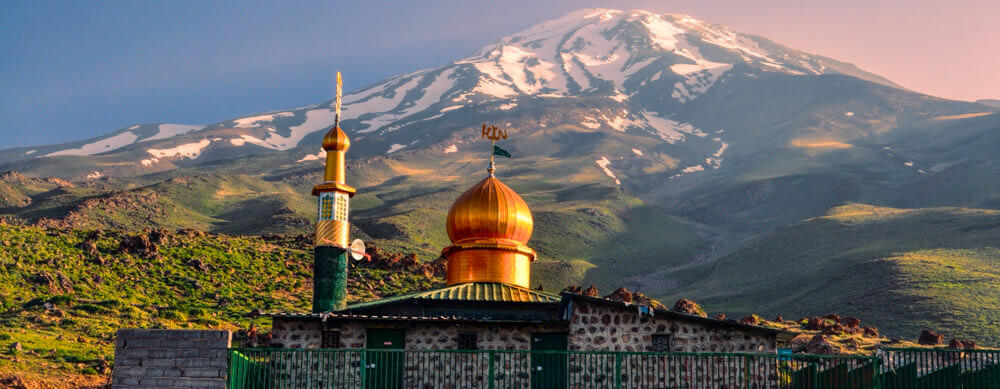
Travel Vaccines and Advice for Iran

Iran is the home to the ancient Persian Empire and a strong history dating back to 3200 BC. This means travellers are able to bask in the rich culture and history of thousands of years of tradition and architecture.
When in Iran, consider your safety. Laws and regulations are different in Iran and can be rigidly followed.
Do I Need Vaccines for Iran?
Yes, some vaccines are recommended or required for Iran. The National Travel Health Network and Centre and WHO recommend the following vaccinations for Iran: COVID-19 , hepatitis A , hepatitis B , typhoid , cholera , yellow fever , rabies , polio and tetanus .
See the bullets below to learn more about some of these key immunizations:
- COVID-19 – Airborne – Recommended for all travellers
- Hepatitis A – Food & Water – Recommended for most travellers to the region, especially if unvaccinated.
- Hepatitis B – Blood & Body Fluids – Accelerated schedule available
- Tetanus – Wounds or Breaks in Skin – Recommended for travelers to most regions, especially if not previously vaccinated.
- Typhoid – Food & Water – Jab lasts 3 years. Oral vaccine lasts 5 years, must be able to swallow pills. Oral doses must be kept in refrigerator.
- Cholera – Food & Water – Recommended for some travellers to specific regions.
- Yellow Fever – Mosquito – Required if travelling from a country with risk of yellow fever transmission.
- Rabies – Saliva of Infected Animals – High risk country. Vaccine recommended for long-stay travellers and those who may come in contact with animals.
- Polio – Food & Water – Required for some itineraries, especially if staying over 4 weeks. Recommended for some travellers to the region. Single adult booster recommended.
See the table below for more information:
Polio is found in some regions of Iran. Ensure you have been vaccinated before travelling.
Mosquito-borne diseases like malaria and dengue are also present. Ensure to bring repellents and mosquito netting. Antimalarials may be recommended based on the specifics of your trip.
Visit our vaccinations page to learn more. Travel safely with Passport Health and schedule your appointment today by calling or book online now .
Do I Need a Visa to Travel to Iran?
A visa is required for all travel to Iran. Visas are given to tour groups or individuals with a sponsor in Iran. Women, and girls over the age of nine, should wear a headscarf in their visa application photos.
Passports must have at least six months validity. Proof of yellow fever vaccination may be required if you are travelling from a region where yellow fever is present.
Sources: Embassy of Iran and GOV.UK
What is the Climate Like in Iran?
Iran is a dry and hot country. But, its climate can vary depending on the geographical location and season.
Winters are cool to very cold with January being the coldest month. In the northwest, winters are the worst, though they are evened out with temperate summers. The further south you go, the more hot and humid it gets, with short, cool winters, and very strong summers. July is particularly hot.
Summers are not very wet in most of the country. Part of the Caspian coast has rainfall all year round, but especially from the end of summer to mid-winter. Be aware that strong storms can sometimes occur, which can lead to flooding and erosion. Iran gets lots of sunshine during summers.
Autumn and spring are usually mild passing seasons in Iran no matter which area you travel to.
How Safe is Iran?
While Iran is a very developed country, there are still some safety concerns. Severe earthquakes are not uncommon in Iran and terrorism is a threat. Ensure to plan for these potential hazards.
Iran has a high traffic-accident mortality rate. Motorists do not make way for pedestrians and streets are not regulated. Avoid motoring by yourself and be careful on the streets.
Petty theft and pick-pocketing do occur in populous areas of Iran. Ensure to be aware of your surroundings and leave valuables in a safe place. False constabulary officers robbing tourists has been reported in Iran. Ask for an officer’s identity card if stopped.
Shopping at the Tabriz Historic Bazaar Complex
The Tabriz Historic Bazaar presents a great opportunity to learn more about culture and architecture. Tabriz was at one point the capital city of the Safavid kingdom from the 1200’s to the 1500’s. The complex is made up of connected buildings of red brick, with towering domed skylights.
If you are looking for peculiar Iranian items to take home or just some food for lunch, the Bazaar is a wise choice. Shoppers can find everything from spices, natural scents, and herbal remedies. Most famously sold are the genuine hand-woven Persian rugs and carpets. You can watch them being made in different styles, sizes, and even knot density.
What Should I Pack for Iran?
Think ahead on what to pack by perusing these suggestions:
- Appropriate Items for the Weather – Iran can be often be quite hot during the summer or very cold in the winter. Be sure to pack accordingly for the time of year and the activities you wish to do. Consider items such as sun cream, sandals, and airy clothing especially.
- Covering Clothing – People in Iran, particularly women, must follow the government’s dress code. Research into these regulations and pack accordingly.
- Insect Repellent – With the possibility of malaria and dengue fever in Iran it is important to bring repellents.
- Copies of Travel Documents – In case of lost luggage or theft, bringing copies of important documents is a must.
Embassy of the United Kingdom in Iran
If you are in Iran and have an emergency (for example, been attacked, arrested or someone has died) contact the nearest consular services. Contact the embassy before arrival if you have additional questions on entry requirements, safety concerns or are in need of assistance.
British Embassy in Tehran 172 Ferdowsi Avenue Tehran 11316-99813 Iran Telephone: +98 ( 0)21 6405 2000 Emergency Phone: +44 1908 516666
Be aware that Iranian citizens may be prevented from going to the embassy for help.
Stay safe abroad with Passport Health. Ring or book online now and start travelling safely today!
On This Page: Do I Need Vaccines for Iran? Do I Need a Visa to Travel to Iran? What is the Climate Like in Iran? How Safe is Iran? Shopping at the Tabriz Historic Bazaar Complex What Should I Pack for Iran? Embassy of the United Kingdom in Iran

- Privacy Policy
- Automatic Data Collection Statement
Cookies on GOV.UK
We use some essential cookies to make this website work.
We’d like to set additional cookies to understand how you use GOV.UK, remember your settings and improve government services.
We also use cookies set by other sites to help us deliver content from their services.
You have accepted additional cookies. You can change your cookie settings at any time.
You have rejected additional cookies. You can change your cookie settings at any time.
- Passports, travel and living abroad
- Travel abroad
- Foreign travel advice
Warnings and insurance
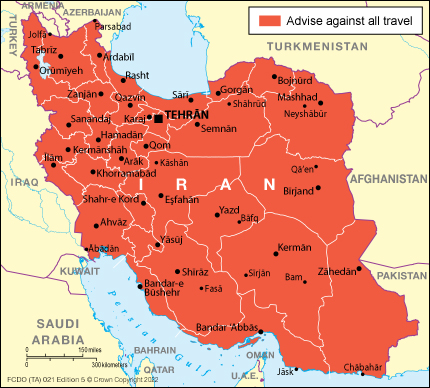
The Foreign, Commonwealth & Development Office ( FCDO ) provides advice about risks of travel to help British nationals make informed decisions. Find out more about FCDO travel advice .
FCDO advises against all travel to Iran
Your travel insurance could be invalidated if you travel against FCDO advice. Consular support is also severely limited where FCDO advises against travel.
If you’re a British national already in Iran, either resident or visitor, carefully consider your presence there and the risks you take by staying.
FCDO advises against all travel to Iran. British and British-Iranian dual nationals are at significant risk of arbitrary arrest, questioning or detention in Iran. Holding a British passport can be reason enough for the Iranian authorities to question you. If you are detained in Iran, you could face months or years in prison.
Find out more about why FCDO advises against travel .
Military activity in the region
On 13 April 2024 Iran launched an attack against Israel, using UAVs, ballistic and cruise missiles fired from Iran into Israel.
On 19 April, there have been reports of explosions in Iran, and unconfirmed reports of explosions in Syria and Iraq.
Monitor this travel advice and other media as the situation is changing fast. Follow and contact FCDO travel on Twitter , Facebook and Instagram . You can also get email notifications when this travel advice is updated.
Read FCDO advice on how to deal with a crisis overseas.
Risks to British nationals in Iran
Consular support is extremely limited in Iran. If you need consular assistance you should contact the British Embassy in Tehran .
FCDO advises against all travel to Iran. British and British-Iranian dual nationals are at significant risk of arbitrary arrest, questioning or detention in Iran. Holding a British passport can be reason enough for the Iranian authorities to question you. If you are detained in Iran, you could face months or years in prison.
Find out more about why FCDO advises against travel
Dual nationals
The Iranian authorities do not recognise dual nationality. If you are a British-Iranian dual national and you are detained in Iran, the authorities will not tell FCDO or grant FCDO access to see you. If you are detained, your case will be in the hands of the Iranian authorities, who have shown a pattern of hostility towards the UK and British citizens.
Before you travel
FCDO advises against all travel to Iran.
No travel can be guaranteed safe. Read all the advice in this guide as well as support for British nationals abroad which includes:
- advice on preparing for travel abroad and reducing risks
- information for women, LGBT+ and disabled travellers
Follow and contact FCDO travel on Twitter , Facebook and Instagram . You can also sign up to get email notifications when this advice is updated.
Travel insurance
If you choose to travel, research your destinations and get appropriate travel insurance . Insurance should cover your itinerary, planned activities and expenses in an emergency.
Related content
Is this page useful.
- Yes this page is useful
- No this page is not useful
Help us improve GOV.UK
Don’t include personal or financial information like your National Insurance number or credit card details.
To help us improve GOV.UK, we’d like to know more about your visit today. We’ll send you a link to a feedback form. It will take only 2 minutes to fill in. Don’t worry we won’t send you spam or share your email address with anyone.

Search Smartraveller

Latest update
We continue to advise:
Do not travel to Iran as there's a high risk you could be arbitrarily detained or arrested.
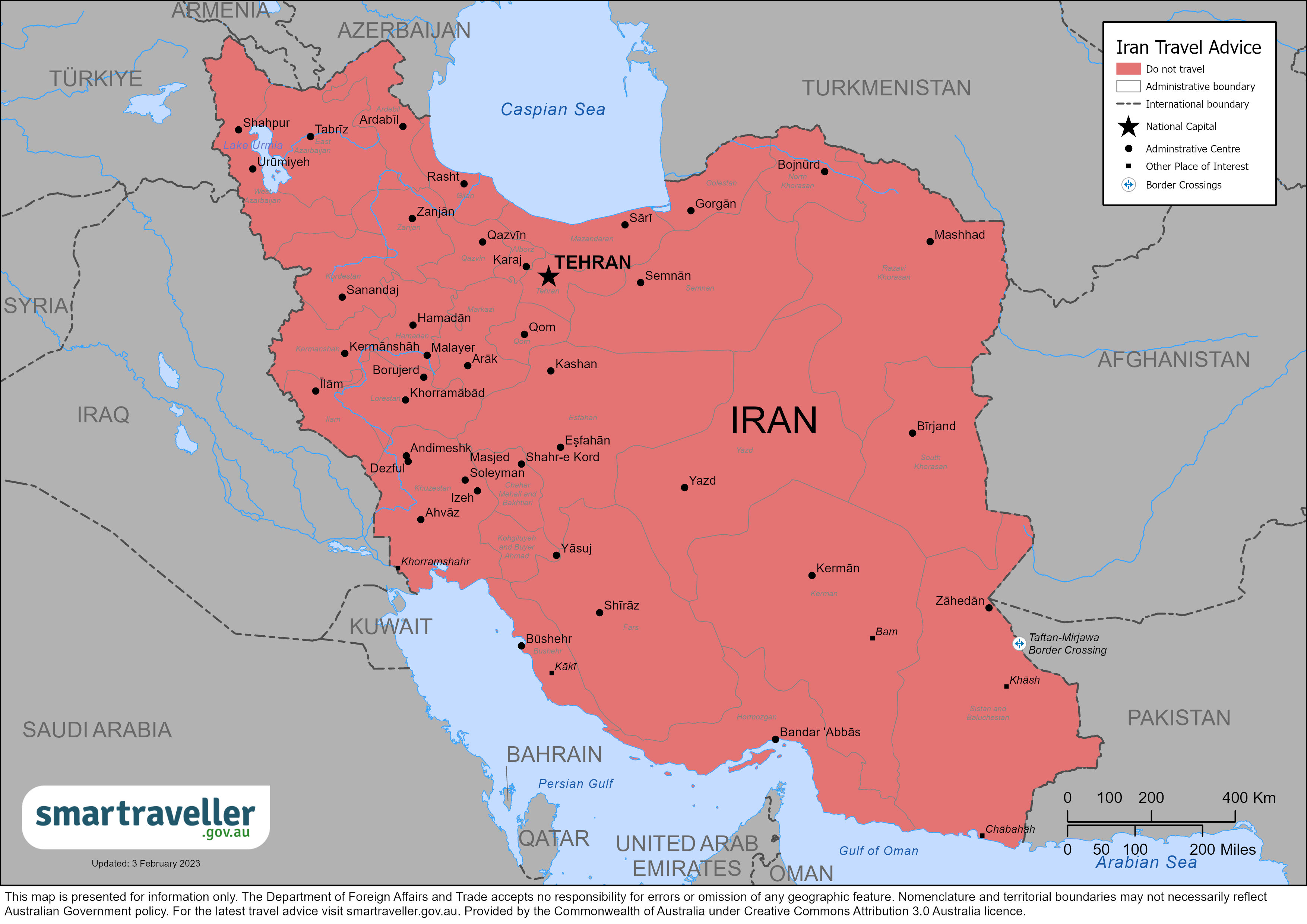
Iran (PDF 927.2 KB)
The Middle East (PDF 1.45 MB)
Local emergency contacts
Fire and rescue services, medical emergencies.
Call 115 or go direct to the hospital.
Mountaineers can also contact the Red Crescent on 112 for help.
Call 110 or visit the nearest police station.
Advice levels
Do not travel to Iran.
Do not travel to Iran as there's a high risk you could be arbitrarily detained or arrested.
- An increased threat of military and terrorist attacks against Israel and Israeli interests across the region and ongoing military action in the Occupied Palestinian Territories could lead to increased tensions in other locations in the Middle East.
- Regional tensions are high, and the security situation could deteriorate quickly with little or no notice. In an attack or other armed conflict, you should follow the advice of local authorities. See our general advice on protecting your safety ( There’s an armed conflict ).
- Increased tensions in the Middle East may result in airspace closures, flight cancellations and diversions and other travel disruptions.
- Dependants of Australian officials in Iran have been offered voluntary departure to return to Australia.
- Demonstrations and protests are expected. Small, localised protests continue in parts of Iran. Previously, security forces' response to protests has been severe, and many protesters and bystanders have been injured, killed or detained. There has been an increase in the number of foreign nationals arrested during previous protests. Avoid all demonstrations and protests.
- Terrorist attacks could happen anywhere in Iran, including Tehran or other locations frequented by foreigners and tourists. They could occur at any time with little or no warning. Avoid possible targets and areas with a low level of security. Possible targets for attacks include embassies, hotels, places of worship, tourist sites, government interests, military parades and locations, Western businesses and other interests. Take official warnings seriously.
- Australians, including dual nationals, should strongly consider leaving Iran as soon as possible. Foreigners in Iran, including Australians, are at a high risk of arbitrary detention or arrest. Foreign and dual nationals have been detained without due process of law. Iran does not recognise dual nationality. Our ability to provide consular support to dual Australian-Iranian nationals is extremely limited. We can't guarantee access to consular services or legal representation if you're detained or arrested.
- There are ongoing disruptions to telecommunications services, including mobile internet access.
- Regional tensions are high and could escalate rapidly. There is ongoing hostility between Iran and Israel, and military tensions between Iran, the US and other countries in the Middle East. The Iran-Iraq, Iran-Afghanistan, and Iran-Pakistan border areas are extremely dangerous.
- Regional and international politics can trigger protests. These may target Western or UN diplomatic missions. Avoid vigils, marches, demonstrations and large public gatherings, as they can turn violent without warning.
- Kidnapping for ransom can occur. Foreign nationals have also been the target of kidnapping. Drug traffickers and bandits are active in the Afghanistan and Pakistan border areas. They often clash violently with security forces. Bombings and shootings occur. Be alert to your surroundings, especially at night. Outside these areas, the level of violent crime is low.
- Women can face unwanted attention and harassment. If you're a woman, take care when travelling alone, particularly at night.
Full travel advice: Safety
- Outbreaks of insect borne diseases such as malaria, tick-borne encephalitis and leishmaniasis occur. Use insect and mosquito repellent.
- HIV/AIDS is a risk. Take precautions if you engage in high-risk activities.
- Waterborne, foodborne, parasitic and other infectious diseases occur. These include cholera, typhoid and hepatitis. Drink only boiled or bottled water. Avoid raw or undercooked food.
- Significant air pollution occurs in major cities. Sandstorms and dust storms happen often. Get medical advice if you have allergies or breathing difficulties.
Full travel advice: Health
- Don't use, carry or import illegal drugs. Punishments for drug offences are severe. They include the death penalty.
- Get professional advice if you're involved in local legal proceedings. In particular, seek advice on matters of family law, such as divorce, child custody and child support.
- Same-sex relations are illegal for both men and women. Penalties include corporal punishment and death.
- Iran has strict codes of dress and behaviour. Women are required by law to wear a headscarf and loose-fitting clothing covering their arms and legs. Men face fewer clothing restrictions but should avoid shorts and sleeveless t-shirts. Close contact between unmarried men and women is illegal, as is being in a de facto relationship. This is particularly the case for interactions between Muslims and non-Muslims. It's against the law to behave in a way that offends Islam, such as encouraging a Muslim to convert.
- Be careful when taking photos. It's illegal to photograph military or government sites, critical civil infrastructure and public protests. It's illegal to use drones without authorisation.
- Iran has strict importation laws. You can't import alcohol, pornography, pork products or short-wave radios. It's also illegal to import printed or recorded Western materials, including religious material. Get permission to bring in electronics, such as satellite phones, GPS trackers and walkie-talkies.
Full travel advice: Local laws
- We advise Australians not to travel to Iran. If you're in Iran, you should strongly consider leaving as soon as possible. If despite our advice you travel to Iran, you'll need a visa to enter and you'll need to get it before you travel. Contact your nearest Iranian embassy for details.
- Airlines may cancel or reduce their operations into and out of Iran at short notice.
- Some countries have restrictions on travellers coming out of Iran.
- If your passport contains Israeli stamps or visas, Iranian authorities will refuse you entry.
- If you overstay your visa in Iran for any reason, even one beyond your control, you'll incur a fine. The Australian Government cannot pay this fine for you. You must also apply for an exit visa. You can get more information on Iranian visa and exit permit requirements from the Iranian Passport Police Office or Ministry of Foreign Affairs.
- Most Australian travel insurance policies won't cover you for travel to Iran. You'll need a specialised policy.
- The local currency is the Iranian Rial (IRR). Declare any foreign currency you have when you arrive in Iran or authorities may confiscate it when you leave. You can exchange major currencies in all big cities. You can't use international credit or bank cards. You can't transfer money using commercial banks or money transfer companies. Bring enough cash to cover your stay.
Full travel advice: Travel
Local contacts
- The Consular Services Charter details what the Australian Government can and can't do to help you overseas.
- For consular assistance, contact the Australian Embassy in Tehran . The working week is from Sunday to Thursday, in accordance with local practice.
- Our ability to provide consular support to dual Australian-Iranian nationals is extremely limited.
Full travel advice: Local contacts
Full advice
Civil unrest and political tension.
Protests and demonstrations are expected. Some airlines may cancel flights at short notice - check with your airline. Australian embassy staff and their families in Tehran have been advised to stay close to home and avoid protest areas.
In late 2022 and early 2023, there were widespread protests across many cities and towns in Iran. Previously, security forces' response to protests has been severe, and many protesters and bystanders have been injured, killed or detained. During past protest periods, there have been increases in the number of foreign nationals arrested. You should avoid all protest activity.
Political developments in the region and local political tensions can trigger protests, demonstrations and vigils.
Public protests and events that draw large groups of people can potentially turn violent.
Iranians sometimes protest against some Western and Middle East embassies and UN missions.
To protect yourself during periods of unrest:
- avoid demonstrations, protests, large crowds and vigils
- do not photograph demonstrations, protests, large crowds or vigils
- monitor media for possible threats
- plan activities to avoid disruption on national or commemorative days
- follow the advice of local authorities
- share your itinerary with family and friends and keep in close contact so they know where you are.
Be prepared to change your plans in case of disruptions.
If civil unrest disrupts transport, ask your airline, travel agent or insurer for help.
More information:
- Demonstrations and civil unrest
Risk of arbitrary detention or arrest
Travellers in Iran, including Australians, are at a high risk of arbitrary detention or arrest. A number of Australians, including dual nationals, have been detained in Iran without due process of law.
There's been an increase in the number of foreign nationals being arrested or detained in Iran.
You may be at greater risk of detention if authorities are suspicious of your activities or background. You could attract the attention of authorities if you:
- study or do other academic activity
- travel outside tourist areas
- are near crowds, demonstrations or sensitive sites
- take photos, except in major tourist sites
- have contact with Iranians who are of interest to authorities
- behave or express views perceived as anti-Iranian, anti-Iranian Government, or that could cause religious offence
- are affiliated with, or have links to, Iranian opposition or other political groups.
Iran does not recognise dual nationality. If you're a dual Australian-Iranian national and are detained in Iran, our ability to provide consular support is extremely limited.
The Australian Government may not be notified if you're detained. We can't guarantee consular access to any Australian detained or arrested. We also can't guarantee access to legal representation.
If you're in Iran, you should leave immediately.
- Advice for dual nationals
- Fact sheet: Arrested or jailed overseas
Security situation
Regional tensions are high, and the security situation could deteriorate quickly with little or no notice. This may also result in airspace closures, flight cancellations, flight diversions, and other travel disruptions.
The security situation in Iran remains volatile. Tensions in the region are high and may escalate further, due to ongoing hostility between Iran and Israel, and military tensions between Iran, the US, and other countries in the Middle East.
If despite our advice you go to Iran, or decide to stay there, monitor media for possible threats and take extra precautions for your safety:
- keep a low profile.
- keep in contact with family and friends
- don't travel alone or at night
- check routes before you travel
- don't put your travel or other plans on social media
- work with only reliable, registered and authorised organisations and travel agencies
- don't carry large amounts of cash
Airlines may cancel or reduce their operations to and from Iran at short notice. If tensions escalate, your options to leave may be limited. The Australian Government may not be able to assist with your departure. Check the latest flight status with your airline or travel provider and make arrangements in case you can’t leave. Share those plans with family and friends.
Iranian authorities are active in and closely monitor border areas with Iraq, Afghanistan and Pakistan. The security situation within 10km of the Iran-Iraq border is extremely dangerous.
Do not visit military or nuclear sites; these are not always clearly marked. Follow the advice of local authorities and monitor the media.
A terrorist attack could happen anywhere in Iran at any time, including in Tehran.
In January 2024, at least 84 people were killed and more than 200 wounded in suicide bombing attacks in Kerman, southern Iran, carried out by Islamic State Khorasan Province (ISKP).
On 26 October 2022, a terrorist attack on the Shah Cheragh Shrine in Shiraz killed at least 14 people and injured 40 others.
Possible targets for attacks include:
- places of worship
- tourist sites
- government interests
- military parades and locations
- Western businesses and other interests
To stay safe from terrorist risks:
- be alert to possible threats throughout the country
- avoid places where there is a low level of security and possible target areas
- monitor the media for new threats
- report suspicious activity or items to police
- take official warnings seriously
- follow the instructions of local authorities
If there's an attack:
- leave the area as soon as it's safe
- avoid the affected area in case of secondary attacks
Terrorism is a threat worldwide.
Kidnapping for ransom is a risk in Iran. Foreign nationals have been targeted. The kidnapping risk is heightened in the border areas with Afghanistan and Pakistan, including in the area east of Bam, Jask, and the Sistan and Baluchestan provinces. Drug traffickers and bandits are active in these regions.
Kidnapping happens with political, ideological and criminal motives. Targets have included foreigners.
Always be alert to your personal security and surroundings.
To protect yourself from kidnapping:
- seek professional security advice
- arrange effective personal safety measures
- be alert to possible threats
- change your daily routines and patterns of travel
The Australian Government's longstanding policy is that it doesn't make payments or concessions to kidnappers.
Violent crime
The level of violent crime in Iran is generally low, but petty crime is increasing due to the worsening economic situation.
Drug traffickers and bandits are active in the border areas near Afghanistan and Pakistan. This includes:
- Sistan and Baluchestan province
- east of the city of Bam in Kerman province
Violent incidents often occur in these areas, such as:
- clashes between security forces and drug traffickers
Travel at night in these areas is particularly dangerous.
Be alert to your surroundings, especially at night. Don't draw unwanted attention to yourself.
Petty crime
There have been increasing reports of thieves in passing vehicles snatching bags from pedestrians, home break-ins and robberies.
Women can face unwanted attention and harassment. Women should take care travelling alone, particularly at night.
Scams and fraud
Men may approach foreigners and claim to be plain-clothes police. They say they're looking for foreign drug dealers and ask to see wallets and ID.
If this happens, it could be a scam . Ask a uniformed police officer for help.
Cyber security
You may be at risk of cyber-based threats during overseas travel to any country. Digital identity theft is a growing concern. Your devices and personal data can be compromised, especially if you’re connecting to Wi-Fi, using or connecting to shared or public computers, or to Bluetooth.
Social media can also be risky in destinations where there are social or political tensions, or laws that may seem unreasonable by Australian standards. Travellers have been arrested for things they have said on social media. Don't comment on local or political events on your social media.
Cyber security when travelling overseas
Climate and natural disasters
Earthquakes and severe weather occur in Iran.
If a natural disaster happens:
- secure your passport in a safe, waterproof location
- monitor local media
- keep in contact with your friends and family
Earthquakes
Iran experiences frequent earthquakes . There have been several major earthquakes in recent years.
Aftershocks often follow a major earthquake. They can cause further damage to already weakened structures.
Register with the Global Disaster Alert and Coordination System to receive alerts on major disasters.
Severe weather
Iran experiences extremely high temperatures.
The temperature in some areas can reach over 50˚C in July and August, the hottest months of the year.
Some regions have heavy snowfall during winter.
Sandstorms and dust storms occur regularly.
Widespread flash flooding affected large parts of Iran in March-April 2019, causing a number of deaths.
Travel insurance
If despite our advice you plan to travel to Iran, you'll need a specialised travel insurance policy that covers travel to high-risk destinations. Most Australian policies won't cover you for travel to Iran. Check that Iran is not excluded from your cover because of sanctions.
Your policy needs to cover all overseas medical costs, including medical evacuation. If you're not insured, you may have to pay many thousands of dollars up-front for medical care. The Australian Government won't pay for any costs or organise evacuation.
If you can't get travel insurance , you should not travel.
Physical and mental health
Consider your physical and mental health before you travel, especially if you have an existing medical condition.
See your doctor or travel clinic to:
- have a basic health check-up
- ask if your travel plans may affect your health
- plan any vaccinations you need
Do this at least 8 weeks before you leave.
- General health advice
- Healthy holiday tips (Healthdirect Australia)
Medications
Not all medication available over the counter or by prescription in Australia is available in other countries. Some may even be considered illegal or a controlled substance, even if prescribed by an Australian doctor.
Some specialised medicines are in short supply in Iran.
If you plan to bring medication, check if it's legal in Iran. Take enough legal medicine for your trip.
Carry a copy of your prescription or a letter from your doctor stating:
- what the medicine is
- your required dosage
- that it's for personal use
Health risks
Medical evacuation may be difficult.
Insect-borne diseases
Malaria is endemic outside the major towns in Iran's south and west.
Other insect-borne diseases are common, including:
- leishmaniasis
- tick-borne encephalitis
Ticks are most active in spring, summer and autumn.
To protect yourself from disease:
- ensure your accommodation is insect-proof
- use insect repellent
- wear long, loose, light-coloured clothing
- consider taking medicine to prevent malaria
Get medical advice if you have a fever, muscle pain, rash or severe headache.
Infectious diseases
HIV/AIDS is a risk.
Take precautions if you engage in activities that may expose you to the virus.
Other health risks
Waterborne, foodborne, parasitic and other infectious diseases occur, such as:
- tuberculosis
Serious outbreaks sometimes occur.
To protect yourself from illness:
- drink boiled water or bottled water with sealed lids
- avoid ice cubes
- avoid raw and undercooked food, such as salads
Get medical help if you have a fever or diarrhoea.
Air pollution
Significant air pollution occurs in major cities. Sandstorms and dust storms occur regularly.
Get medical advice if you have allergies or breathing difficulties.
Medical care
Medical facilities.
The standard of medical facilities varies. Facilities in remote areas are extremely limited.
If you become seriously ill or injured, you'll need to be evacuated to a place with better facilities, such as London or Dubai. Medical evacuation can be very expensive and may not be possible.
Medical tourism
Medical tourism including for cosmetic operations is common in Iran. The standard of medical service providers can vary. If you're considering getting medical treatment in Iran, you should research and choose your medical service providers carefully. Serious post-surgery complications and deaths have occurred.
You should discuss your plans with your Australian doctor or specialist before committing to getting procedures done in Iran.
You're subject to all local laws and penalties, including those that may appear harsh by Australian standards. Research local laws before travelling.
If you're arrested or jailed, the Australian Government will do what it can to help you under our Consular Services Charter . But we can't get you out of trouble or out of jail.
Iran does not recognise dual nationality. If you're an Australian citizen with Iranian nationality, our ability to provide consular assistance is extremely limited.
Penalties for importing and possessing drugs are severe and include the death penalty.
Authorities have executed foreigners for drug-related offences in recent years.
Carrying or using drugs
Get professional advice if you're involved in local legal proceedings. In particular, seek advice on matters of family law, such as:
- child custody
- child support
Know your rights and responsibilities.
Penalties for serious offences include death and corporal punishment. Same-sex relations are considered serious offences.
These activities are illegal in Iran:
- homosexual acts for both men and women
- failing to meet the legal dress code
- import alcohol, pornography, pork products or short-wave radios
- import printed or recorded Western material, including those with a religious theme
Local authorities consider domestic violence to be a private family matter. Iranian law does not prohibit domestic violence.
Advice for LGBTI travellers
Dress and behaviour
Iran has strict Islamic codes of dress and behaviour.
It's illegal to behave in a way considered to offend Islam. For example, you must not encourage Muslims to convert to another religion.
It's also illegal to:
- have close contact between unmarried men and women — in particular between non-Muslims and Muslims
- be in a de facto relationship
In public women are required by law to wear:
- loose-fitting clothing to cover arms and legs
- a long coat
- a headscarf
If you fail to follow these dress requirements, you may be detained, fined or denied access to government and other services.
In public men should not wear shorts or sleeveless T-shirts.
Photography
You cannot photograph sensitive sites or events, including:
- military and nuclear sites
- government buildings and installations
- critical civil infrastructure
- public demonstrations
Electronic equipment
It's illegal to use drones without authorisation.
You will need permission to bring in a range of electronic equipment, including:
- satellite phones
- GPS trackers
- walkie-talkies
Unauthorised use may result in arrest or detention. Tracking software installed on mobile phones, tablets or other computer equipment may attract the attention of authorities.
For advice, contact your nearest Iranian embassy or consulate .
Australian laws
Some Australian criminal laws still apply when you're overseas. If you break these laws, you may face prosecution in Australia.
Staying within the law and respecting customs
Dual citizenship
Iran doesn't recognise dual nationality.
If you're a dual national, you may be at greater risk of arbitrary arrest or detention. Our ability to provide consular assistance is extremely limited.
If you're arrested or detained, it's highly unlikely the Government of Iran would:
- allow us to give you consular services
- notify the Australian Embassy that you've been arrested or detained.
Under Iranian law, Iranian dual nationals must enter and exit Iran on their Iranian passport. Iranian immigration officials routinely confiscate the foreign passports of dual nationals.
If you're an Australian-Iranian dual national, authorities may not allow you to leave Iran if:
- you're male and you haven't completed military service
- you're female and you don't have permission from your husband or a senior male relative to leave Iran
- you're male and have not paid back the dowry to your wife after divorce
- you've overstayed your visa and not paid the fine.
We advise you not to travel to Iran if you are dual Australian-US or Australian-Israeli citizen, in line with those countries' advice to their citizens. For other nationalities, you should check with the relevant country’s travel advice for advice about your risks.
- Dual nationals
- US travel advice for Iran
- UK Government travel advice for Iran
- Israel's Ministry of Foreign Affairs
Local customs
The Islamic holy month of Ramadan is observed in Iran. Respect religious and cultural customs and laws during this time.
During Ramadan, eating, drinking and smoking may be illegal in public during the day. If you're not fasting, avoid these activities around people who are. Seek local advice to avoid offence.
Explore our Ramadan page to learn more, including dates for Ramadan.
Visas and border measures
Every country or territory decides who can enter or leave through its borders. For specific information about the evidence you'll need to enter a foreign destination, check with the nearest embassy, consulate or immigration department of the destination you're entering.
Visitor visa
If despite our advice you decide to travel to Iran, you'll need a visa to enter. You must apply for a visa before you travel. Contact Iranian embassy in Australia to apply.
Entry and exit conditions can change at short notice. Contact the embassy of Iran for details about visas, currency, customs and quarantine rules.
The Government of Iran issues Iranian visas. The Australian Embassy can't intervene in visa matters, including visas on arrival.
If you overstay your visa in Iran for any reason, even one beyond your control, you'll incur a fine. The Australian Government cannot pay this fine for you. You must also apply for an exit visa. You can get more information on Iranian visa and exit permit requirements from the Iranian Passport Police Office or Ministry of Foreign Affairs .
- Embassies and Consulates of Iran
Other formalities
If your passport has evidence you've travelled to Israel, such as an Israeli exit or entry stamp, authorities will refuse you entry to Iran.
Strict import restrictions apply.
If you're a dual national, you may not be able to leave Iran unless you meet certain conditions.
Some countries won't let you enter unless your passport is valid for 6 months after you plan to leave that country. This can apply even if you're just transiting or stopping over.
Some foreign governments and airlines apply the rule inconsistently. Travellers can receive conflicting advice from different sources.
You can end up stranded if your passport isn't valid for more than 6 months.
The Australian Government does not set these rules. Check your passport's expiry date before you travel. If you're not sure it'll be valid for long enough, consider getting a new passport .
Lost or stolen passport
Your passport is a valuable document. It's attractive to people who may try to use your identity to commit crimes.
Some people may try to trick you into giving them your passport. Always keep it in a safe place.
If your passport is lost or stolen, tell the Australian Government as soon as possible.
- In Australia, contact the Australian Passport Information Service .
- If you're overseas, contact the nearest Australian embassy or consulate .
Passport with ‘X’ gender identifier
Although Australian passports comply with international standards for sex and gender, we can’t guarantee that a passport showing 'X' in the sex field will be accepted for entry or transit by another country. Contact the nearest embassy, high commission or consulate of your destination before you arrive at the border to confirm if authorities will accept passports with 'X' gender markers.
- LGBTQIA+ travellers
The local currency is the Iranian Rial (IRR).
Declare any foreign currency you have when you arrive in Iran. If you don't, authorities may confiscate it when you leave.
You can change major currencies in all major cities. However, recent government action has made it harder to change money in exchange bureaus.
You can't use international credit or bank cards.
You can't transfer funds into Iran using:
- the commercial banking system
- a money transfer company
Bring enough cash to cover your stay.
Local travel
Driving permit.
To drive in Iran you need both:
- a valid Australian driver's licence
- an International Driving Permit (IDP)
Get an IDP before leaving Australia.
Road travel
Iran has one of the highest rates of road accidents in the world.
You're more likely to die in a motor vehicle accident in Iran than in Australia.
If you plan to drive:
- check you have enough insurance cover
- ensure you understand local traffic laws and practices
- don't drink and drive
Pedestrians should exercise extreme caution when crossing roads, as traffic can be very congested and road-users unpredictable or undisciplined.
Driving or riding
Motorcycles
Check if your travel insurance policy covers you for using a motorbike, quad bike or similar vehicle.
Always wear a helmet.
Only use registered taxis and limousines. Book them through your hotel.
Public transport
Iran is serviced by extensive bus and rail options. Road conditions and road safety vary across the country. Rail services are more limited and slower. Public transport in the main cities is often very crowded.
The Gulf has many areas with security issues and territorial disputes. Authorities may inspect, detain and arrest vessels. Foreigners navigating Iranian waters have been arrested and detained.
Piracy occurs in the Gulf.
Check the International Maritime Bureau's piracy report .
The International Civil Aviation Organisation (ICAO) hasn't audited air safety authorities in Iran.
The EU has operational restrictions in place for some of Iran Air's fleet. The airline hasn't met the EU's international safety standards.
Ageing planes on many of Iran's domestic air services create serious safety concerns.
DFAT doesn't provide information on the safety of individual commercial airlines or flight paths.
Check Iran's air safety profile with the Aviation Safety Network .
Emergencies
Depending on what you need, contact your:
- family and friends
- travel agent
- insurance provider
English speakers are generally not available.
Always get a police report when you report a crime.
Your insurer should have a 24-hour emergency number.
Consular contacts
Read the Consular Services Charter for what the Australian Government can and can't do to help you overseas.
For consular assistance, contact the Australian Embassy in Tehran.
Australian Embassy
No.11, Yekta Street Bahar Street, Shahid Fallahi Street Valie Asr Avenue Tehran, Iran
Phone: +98 21 7206 8666 Fax: +98 21 7206 8777 Website: iran.embassy.gov.au Facebook: Australia in Iran Instagram: @AustraliaInIran
The working week is from Sunday to Thursday, in accordance with local practice.
Check the Embassy website for details about opening hours and any temporary closures.
24-hour Consular Emergency Centre
In a consular emergency, if you can't contact an embassy, call the 24-hour Consular Emergency Centre on:
+61 2 6261 3305 from overseas
1300 555 135 in Australia

Travelling to Iran?
Sign up to get the latest travel advice updates..
Be the first to know official government advice when travelling.
Featured on

- What is a visa?
- Electronic Visa (eVisa)
- Visa on Arrival
- Appointment Required Visa
- Invitation Letter
- Arrival Card
- Passport Renewal
- Project Kosmos: Meet the man with the world's most challenging travel schedule
- Australia Visa and ETA requirements for US citizens explained
- Brazil eVisa for US citizens
- India Tourist Visa for UK citizens
- Possible B1/B2 Visa questions during the interview
Select Your Language
- Nederlandse
- 中文 (Zhōngwén), 汉语, 漢語
Select Your Currency
- AED United Arab Emirates Dirham
- AFN Afghan Afghani
- ALL Albanian Lek
- AMD Armenian Dram
- ANG Netherlands Antillean Guilder
- AOA Angolan Kwanza
- ARS Argentine Peso
- AUD Australian Dollar
- AWG Aruban Florin
- AZN Azerbaijani Manat
- BAM Bosnia-Herzegovina Convertible Mark
- BBD Barbadian Dollar
- BDT Bangladeshi Taka
- BGN Bulgarian Lev
- BIF Burundian Franc
- BMD Bermudan Dollar
- BND Brunei Dollar
- BOB Bolivian Boliviano
- BRL Brazilian Real
- BSD Bahamian Dollar
- BWP Botswanan Pula
- BZD Belize Dollar
- CAD Canadian Dollar
- CDF Congolese Franc
- CHF Swiss Franc
- CLP Chilean Peso
- CNY Chinese Yuan
- COP Colombian Peso
- CRC Costa Rican Colón
- CVE Cape Verdean Escudo
- CZK Czech Republic Koruna
- DJF Djiboutian Franc
- DKK Danish Krone
- DOP Dominican Peso
- DZD Algerian Dinar
- EGP Egyptian Pound
- ETB Ethiopian Birr
- FJD Fijian Dollar
- FKP Falkland Islands Pound
- GBP British Pound Sterling
- GEL Georgian Lari
- GIP Gibraltar Pound
- GMD Gambian Dalasi
- GNF Guinean Franc
- GTQ Guatemalan Quetzal
- GYD Guyanaese Dollar
- HKD Hong Kong Dollar
- HNL Honduran Lempira
- HTG Haitian Gourde
- HUF Hungarian Forint
- IDR Indonesian Rupiah
- ILS Israeli New Sheqel
- INR Indian Rupee
- ISK Icelandic Króna
- JMD Jamaican Dollar
- JPY Japanese Yen
- KES Kenyan Shilling
- KGS Kyrgystani Som
- KHR Cambodian Riel
- KMF Comorian Franc
- KRW South Korean Won
- KYD Cayman Islands Dollar
- KZT Kazakhstani Tenge
- LAK Laotian Kip
- LBP Lebanese Pound
- LKR Sri Lankan Rupee
- LRD Liberian Dollar
- LSL Lesotho Loti
- MAD Moroccan Dirham
- MDL Moldovan Leu
- MGA Malagasy Ariary
- MKD Macedonian Denar
- MNT Mongolian Tugrik
- MOP Macanese Pataca
- MUR Mauritian Rupee
- MVR Maldivian Rufiyaa
- MWK Malawian Kwacha
- MXN Mexican Peso
- MYR Malaysian Ringgit
- MZN Mozambican Metical
- NAD Namibian Dollar
- NGN Nigerian Naira
- NIO Nicaraguan Córdoba
- NOK Norwegian Krone
- NPR Nepalese Rupee
- NZD New Zealand Dollar
- OMR Omani Rial
- PAB Panamanian Balboa
- PEN Peruvian Nuevo Sol
- PGK Papua New Guinean Kina
- PHP Philippine Peso
- PKR Pakistani Rupee
- PLN Polish Zloty
- PYG Paraguayan Guarani
- QAR Qatari Rial
- RON Romanian Leu
- RSD Serbian Dinar
- RUB Russian Ruble
- RWF Rwandan Franc
- SAR Saudi Riyal
- SBD Solomon Islands Dollar
- SCR Seychellois Rupee
- SEK Swedish Krona
- SGD Singapore Dollar
- SHP Saint Helena Pound
- SLL Sierra Leonean Leone
- SOS Somali Shilling
- SRD Surinamese Dollar
- SVC Salvadoran Colón
- SZL Swazi Lilangeni
- THB Thai Baht
- TJS Tajikistani Somoni
- TOP Tongan Pa anga
- TRY Turkish Lira
- TTD Trinidad and Tobago Dollar
- TWD New Taiwan Dollar
- TZS Tanzanian Shilling
- UAH Ukrainian Hryvnia
- UGX Ugandan Shilling
- USD United States Dollar
- UYU Uruguayan Peso
- UZS Uzbekistan Som
- VND Vietnamese Dong
- VUV Vanuatu Vatu
- WST Samoan Tala
- XAF CFA Franc BEAC
- XCD East Caribbean Dollar
- XOF CFA Franc BCEAO
- XPF CFP Franc
- YER Yemeni Rial
- ZAR South African Rand
- ZMW Zambian Kwacha
We've updated our app!
Download it now
Iran Covid Quarantine: See how to visit Iran safely
Traveling to Iran is not as challenging as it seems because the government recently allowed the Iran COVID-19 Self Declaration Form . With this document, travelers can enter Iran safely during Coronavirus. Besides, this document is available online, and you can have it with little effort by using iVisa.com . But, aside from the self-declaration form, you also have to keep in mind the Iran Covid quarantine and other travel requirements.
Luckily, there are few restrictions to visiting this country. Still, we recommend you read the lines below to learn more about the Iran Covid quarantine and the Iran COVID-19 Self Declaration Form .

Frequently Asked Questions
What are the current covid-19 travel requirements to enter iran.
Since this information changes often depending on some conditions (for example, your country of origin), we kindly encourage you to enter our Iran COVID-19 Self Declaration Form page to read the most recent and updated information about this topic and therefore travel to Iran safely.
Do I have to complete an Iran Covid Quarantine?
You may have to complete quarantine depending on certain circumstances like your country of origin (or the country you’re coming from) + if you’ve been vaccinated or not, but since this information varies often, we remind you to better read the FAQs on our website.
What is the Iran COVID-19 Self Declaration Form, and how can I get it?
It is an online-based document that shows the authorities updated information about your health situation. Nevertheless, it is not a visa replacement. You can apply for this self-declaration form by using iVisa.com and following these steps:
- Step 1: Complete the online request form with general information about yourself and select your preferred processing time.
- Step 2: Click the “review and checkout” button to ensure correct information. After that, pay the corresponding fees and attach the documentation required.
- Step 3: Click the ‘submit’ button to send your form. Now you can wait for your document in your email inbox.
If you want to learn more about the Iran Covid quarantine, please read below.
Do I need to take the COVID-19 PCR Test before traveling to Iran?
COVID test upon arrival: PCR test within 72 hours.
COVID test exemptions: Children under 12 and fully vaccinated travelers from Iraq.
Do I have to quarantine when I get to Iran?
- Quarantine requirements: There are no quarantine requirements.
What documentation do I need to apply?
To apply for the Iran COVID-19 Self Declaration Form , you must have the following items available first:
- A valid passport (it shouldn’t expire while you travel there)
- A 2x2 passport-size photo (recently taken).
- A debit or credit card for payments.
- A valid email address to receive the self-declaration form.
We still advise you to read the information below to learn more about the Iran Covid quarantine.
What are the cost/processing times?
The price is influenced by the processing time you select while applying. For that, we have created three processing times. Select the one that suits you better:
- Standard Processing Option: For standard and most-affordable processing. USD $57.99 - 24 hours
- Rush Processing Option: For faster processing. USD $105.99 - 8 hours
- Super Rush Processing Option: For the fastest processing if you’re in a rush. USD $180.99 - 4 hours
Is it safe to apply with iVisa.com?
Using iVisa.com is very secure because our software doesn’t put any piece of information at risk, and we have a dedicated team ready to help you 24/7. In addition, you can take a look at our comments section to see what our customers say about us.
Where can I get more information about the Iran Covid quarantine?
If you want to learn more about the Iran Covid quarantine or the Iran COVID-19 Self Declaration Form , we suggest you reach out to our agents since they’re available at any time. You can also keep exploring iVisa.com to read other questions and answers.
iVisa.com Recommends
Formerly known as Persia, Iran is a country steeped in history and impressive architecture that can take your breath away. With cities like Persepolis, Tehran (the capital city), Isfahan, Yazd, among others, this country offers a long list of unforgettable experiences for any curious traveler.
One of the most beautiful places to explore in this country is the Nasir-ol-Molk Mosque, also known as the Pink Mosque. It is a traditional Shiraz mosque, located in the Gowad-e-Arabān district, near the shrine of Ahmad Ibn-Musa or Shāh-e Chérāgh. The mosque has a vast surface of stained glass on the façade, along with other traditional items such as the Panj Kāse design. It is popularly known as the Pink Mosque due to the shade of pink in its tiles.
The Golestan Palace is another place that you cannot miss. It is a palace complex in the city of Tehran, and it was listed as a World Heritage Site by UNESCO in 2013. It comprises several buildings with beautiful mosaics, as well as peaceful gardens and the main fountain that gives it a romantic touch at any time of the day.
Related Articles

Iran eVisa for Citizens of UAE

How Citizens of France Can Enter Iran During Coronavirus

How Citizens of the United States Can Enter Iran During Coronavirus
- iVisa is NOT affiliated with any government agency. This site does not provide legal advice and we are not a law firm. None of our customer service representatives are lawyers and they also do not provide legal advice. We are a private, internet-based travel and immigration consultancy provider dedicated to helping individuals travel around the world. You may apply by yourself directly on the various government websites. The source of information: https://en.mfa.ir/
Advertisement
The U.S. issues new travel guidelines, warning that Iran will avenge the killings of senior commanders.
The State Department has barred its employees from traveling to large parts of Israel. Iran has repeatedly vowed to strike back over the deadly bombing this month of an Iranian Embassy complex in Syria.
- Share full article

By Liam Stack and Eric Schmitt
- April 12, 2024
Several countries including the United States have issued new travel guidelines for Israel and the surrounding region, as the Israeli military said its forces were “highly alert” for a possible Iranian strike in retaliation for the killings of several commanders.
Iran has repeatedly vowed to strike back at Israel over the bombing of an Iranian Embassy complex in Damascus, Syria, this month that killed three generals and four other military officers. An American official said on Friday that Washington expects an attack by Iran against Israel that would be bigger than recent attacks in the long shadow war between the two countries, but not so big that it would draw the United States into war. The official spoke on condition of anonymity because of the sensitivity of the matter.
The U.S. State Department on Thursday barred its employees from traveling to large parts of Israel, the first time the U.S. government had restricted the movement of its employees in this way since the war in Gaza began more than six months ago.
On Thursday, Britain told its citizens that they “should consider leaving” Israel and the Palestinian territories “if it is safe to do so.” On Friday, India told its citizens “not to travel to Iran or Israel till further notice,” while France advised people not to travel to Israel, Iran or Lebanon and evacuated the families of French diplomats from Iran.
Asked about the U.S. travel warning , Matthew Miller, the State Department spokesman, said at a news briefing Thursday: “We have seen Iran making public threats against Israel in the past few days.” He declined to provide details about any specific information that prompted the warning.
The new guidelines bar U.S. government employees and their families from traveling to locations outside the Tel Aviv, Jerusalem and Beersheba metropolitan areas “out of an abundance of caution” until further notice. The State Department said U.S. personnel could move among those areas for personal travel.
The top American military commander for the Middle East, Gen. Michael E. Kurilla, traveled to Israel to coordinate a response to possible Iranian retaliation, U.S. officials said.
“Our enemies think that they will divide Israel and the United States,” the Israeli defense minister, Yoav Gallant, said in a statement on Friday after meeting with General Kurilla. “They are connecting us and are strengthening the relationship between us.”
If Iran attacks, he added, “we will know how to respond.”
On Thursday, the Israeli military’s chief spokesman, Rear Adm. Daniel Hagari, said that the armed forces were “highly alert and prepared” for any action Iran might take, even as the timing and scale of any response remained unclear. Analysts say that Tehran, which has long used a network of proxy forces to project power across the Middle East, wants to avoid igniting a full-fledged war that could drag in the United States and threaten the survival of Iran’s regime.
“For years, and even more so during the war, Iran has been financing, directing and arming its proxies — in Lebanon, Gaza, Syria, Iraq and Yemen — to attack the state of Israel,” he said. “An attack from Iranian territory would be clear evidence of Iran’s intentions to escalate the Middle East and stop hiding behind the proxies.”
Liam Stack is a Times reporter covering the Israel-Hamas war from Jerusalem. More about Liam Stack
Eric Schmitt is a national security correspondent for The Times, focusing on U.S. military affairs and counterterrorism issues overseas, topics he has reported on for more than three decades. More about Eric Schmitt
Our Coverage of the Israel-Hamas War
News and Analysis
The United Nations’ human rights office called for an independent investigation into two mass graves found after Israeli forces withdrew from hospitals in Gaza, including one discovered days ago over which Israeli and Palestinian authorities offered differing accounts.
After weeks of delays, negotiations and distractions, Israel appeared to hint that its assault of Rafah — a city teeming with more than a million displaced persons above ground and riddled with Hamas tunnels below — was all but inevitable. Here’s how it might unfold .
Germany said that it would resume funding for the main U.N. agency aiding Palestinians in Gaza, known as UNRWA, after an independent review found that Israel had not provided evidence of an allegation that led many donor nations to withdraw support.
The United Nations says famine is likely to set in by May in Gaza. For those living under Israel’s attacks and a crippling blockade, every day is a race against time. Here’s how two Palestinian families try to keep their children alive.
A Generational Clash on Seder: At Passover Seders, many families addressed the war in Gaza , leading to rising tensions, while 200 New Yorkers from pro-Palestinian Jewish groups were arrested after rallying near Chuck Schumer’s home to protest aid to Israel.
PEN America’s Fallout: The free expression group PEN America has canceled its 2024 literary awards ceremony following months of escalating protests over the organization’s response to the war in Gaza , which has been criticized as overly sympathetic to Israel.
Fears Over Iran Buoy Netanyahu: The Israeli prime minister lost considerable support after the Hamas-led Oct. 7 attacks on Israel. Tensions with Iran have helped him claw some of it back.
A Surprising Rift: The Israel-Hamas war, which has roiled cultural and political institutions far beyond the Middle East, is causing divisions in a prominent Japanese American group .

Trip cancelled due to Israel-Iran conflict? Here’s what your travel insurance company will say
J ust as the summer holidays are approaching and Indians are making plans to go abroad, comes the Iran-Israel conflict. Tensions between the two countries escalated last weekend, and led to India issuing an advisory cautioning its citizens against travelling to the region.
This doesn’t just affect those who had plans to visit Israel or Iran. It also impacts those flying to Europe, for airlines across the globe have suspended or re-routed flights. Air India has temporarily halted its Tel Aviv flights, and global carriers like Lufthansa and Qantas are bypassing Iranian airspace.
Insurance brokers say insurance companies have told them to temporarily halt travel insurance sales for trips to Israel and Iran.
But what about those who have already purchased a policy? Here’s a look at how insurance companies will treat their claims:
I booked my tickets and bought insurance before the travel advisory
If you had drawn up plans to travel to Israel or Iran before hostilities broke out and the advisory was issued, you will have to cancel your plans (which means, your flight tickets and hotel bookings) for now. What’s more, if you were counting on your travel insurance policy to make good the loss due to cancellation, you will be disappointed.
Also read: Will Israel - Iran war result in a correction in equity markets?
Under most travel insurance policies, war and war-like situations, whether declared or not, are excluded.
For example, Tata-AIG General Insurance’s travel insurance plan states that ``any loss that you experience due to a war or war-like situation will not be covered.'' Likewise, ICICI Lombard General Insurance’s travel policy provides an elaborate list of dangerous scenarios when your policy will not come into play. This includes war, invasion, act of foreign enemy hostilities, or war-like operations (whether war is declared or not), civil war, military coup, or usurped power.
Also read: Iran - Israel war - what it means for Indian markets?
This is the fourth major event that has disrupted international travel — the first being Covid-linked travel restrictions in 2020, followed by the Russia-Ukraine war in 2022, and the Israel-Hamas conflict in 2023.
In all these cases, most countries, including India, issued advisories against travel to the affected regions, besides carrying out evacuation exercises to bring back stranded travellers, students, and employees.
“All insurers keep updating the ‘negative’ list of countries to which travel is unadvisable or barred. Geopolitical risks are not priced into travel policies, and a war-like situation is always an exclusion,” says Nikhil Apte, Chief Product Officer, Product Factory (Health Insurance), Royal Sundaram General Insurance. So, if you were to incur losses on hotel or flight bookings that you now have to cancel, you cannot file a travel insurance claim even if you had purchased the policy well in advance, he adds.
Also read: Israel - Iran war will not impact Indian economy for now
“Travel insurance is meant to cover unforeseen circumstances such as flight cancellations due to extreme weather conditions, natural calamities, disruption in the airline’s operations , and so on,” says Apte. For instance, if you had to cancel your flight due to a medical emergency because you or your immediate family member needs to be hospitalised, such losses will be reimbursed. “Any hospitalisation not related to war, such as an accident or illness abroad, will be covered. But any claim where the proximate cause is ‘war’ won’t be covered by travel insurance,” adds Apte.
Also read: Overseas travel insurance to get bigger and better
“Even if your policy comes with the 'Cancel for any reason (CFAR)' clause, war will still be an exclusion. CFAR will help if you cancel due to personal reasons — unlike regular travel policies, the presence of this clause will ensure that you do not have to specify a reason,” says Manas Kapoor, Head, Travel Insurance, Policybazaar.com
If you booked your trip post the escalation of conflict and travel warning
It is likely that you will not be able to obtain a travel insurance policy at all. Even if you happen to buy a product with ‘worldwide’ coverage where Iran and Israel are specifically excluded, there will be little relief. This is because war and war-like situations constitute a general exclusion, which comes into play even if a war is not declared.
What if I am currently in Israel or Iran
The unfortunate turn of events is particularly harsh on travellers who are already in these countries. Given the volatile situation, your insurance company will not be able to arrange flights to evacuate you even in case of a medical emergency. As has been witnessed during the Ukraine war or Covid crisis, it is the government of India that will carry out the evacuation.
“The cost of the journey or any evacuation to a neighbouring safe country will not be paid for. War-linked exclusion is a ‘hard’ exclusion, in the sense that there is no leeway,” says Manas Kapoor, Product Head, Travel Insurance, Policybazaar.com.
Also read: Crude prices ease as market factors in impact of Iran - Israel war; US denial to deepen crisis
If logistically feasible, however, your travel policy will pay for any medical expenses not linked to the war. That is, if you were to be hospitalised in, say, Israel, due to an illness, your insurer will reimburse the expenses. However, any injuries due to missile attacks, for instance, will not be covered.
Travel to countries not directly affected by the conflict
What’s more, even if you have booked a flight to, say, New York, and your connecting flight from Mumbai to Dubai was cancelled specifically due to the war, you cannot hope for any compensation from the insurance company.
“When you file a claim related to trips even to countries not involved in the hostilities, you need to submit documents to back up the reason for cancellation. If the airline mentions `conflict' as the reason for flight cancellations, your claim will not be approved,” says Kapoor.
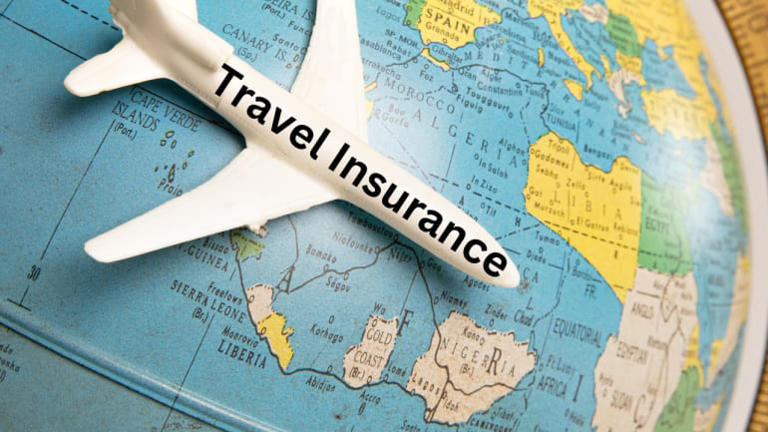
U.S. restricts travel for Israel staff as Iran attack fears rise
The United States has restricted travel for its staff in Israel , as fears grow of an imminent retaliatory attack by Iran .
The U.S. Embassy in Jerusalem issued a security alert Thursday restricting its employees and their family members from personal travel outside the greater Tel Aviv, Jerusalem and Be’er Sheva areas until further notice “out of an abundance of caution.”
The warning comes as Israel’s military vowed it would defend the country and respond, with expectations mounting that Tehran will soon strike back for the attack on its embassy in Syria that killed a number of senior commanders. The exchanges have raised fears that the Israel-Hamas war that has devastated the Gaza Strip could escalate into a wider conflict.
Israel never claimed responsibility for the airstrike on its rival’s consulate in Damascus, but Iran’s supreme leader, Ayatollah Ali Khamenei, said earlier this week that Israel “must be punished and it shall be,” for what he considered an effective attack on Iranian soil.
The U.S. has promised support for its ally in the face of Iranian threats and worked to persuade Tehran to avoid significant escalation, but Israel has signaled its readiness for whatever retribution may be coming.
Israeli Defense Minister Yoav Gallant said Thursday that a direct Iranian attack will require “an appropriate Israeli response” against Iran, while an Israel Defense Forces spokesperson, Rear Adm. Daniel Hagari, said that the country was “alert and highly prepared” for a variety of scenarios.
“Whoever harms us, we will harm them,” Prime Minister Benjamin Netanyahu also said Thursday as he visited an air base. “We are prepared to meet all of the security needs of the state of Israel, both defensively and offensively,” he added.

The growing tensions in the Middle East come as Palestinians in Gaza marked somber Eid celebrations this week amid severe food shortages despite Israeli promises to allow more humanitarian aid into the enclave. White House press secretary Karine Jean-Pierre said Thursday that famine in Gaza was “imminent,” after USAID Administrator Samantha Power said a day earlier that it was “credible” to assess that famine had already begun in the territory.
More than 33,600 people have now been killed in Gaza, the enclave’s Health Ministry said, in the six months of war since the Hamas-led attack on Israel on Oct. 7, which killed an estimated 1,200 people.
The militant group’s political leader, Ismail Haniyeh, said Hamas was still seeking a cease-fire deal despite the deaths of his three sons in an Israeli airstrike in Gaza earlier this week, but talks to secure a truce and the release of remaining hostages remain deadlocked .
It remained unclear whether Iran’s retaliation would come in the form of a direct attack or through some of the web of Tehran-backed groups that have already waged attacks from Iraq, Lebanon and Yemen in recent months.
Tehran has so far avoided direct confrontation with Israel or Washington. But Iranian Foreign Minister Hossein Amirabdollahian said Thursday that “legitimate defense with the aim of punishing the aggressor” was a necessity in the wake of the consulate strike, accusing Israel of targeting diplomatic premises in violation of international law, according to Iranian state-run news agency IRNA.
The Pentagon said Thursday that top U.S. commander for the Middle East, Gen. Michael “Erik” Kurilla, had moved up his trip to Israel so he could meet with Israeli military leadership and discuss “current security threats.”
President Joe Biden said Wednesday that Iran was threatening to launch a “significant attack on Israel,” and that the U.S. commitment to Israel’s security against threats from Iran and its proxies remained “ironclad” despite growing criticism from Washington of its ally’s actions in Gaza.
The White House also said Thursday that the U.S. has communicated to Iran that it had no involvement in the strike in Damascus, and warned Iran not to use this attack as a pretext to escalate further in the region, or to attack U.S. facilities or personnel.

Secretary of State Antony Blinken has held telephone conversations with his Chinese, Turkish and Saudi counterparts “to make clear that escalation is not in anyone’s interest” and that countries should urge Iran not to escalate.
“We have also engaged with European allies and partners over the past few days and urged them as well to send a clear message to Iran that escalation is not in Iran’s interest, it’s not in the region’s interest, and it’s not in the world’s interest,” spokesman Matthew Miller said Thursday .
British Foreign Minister David Cameron said he had made it clear to his Iranian counterpart that the Islamic Republic must not draw the Middle East into a wider conflict.
“I am deeply concerned about the potential for miscalculation leading to further violence,” Cameron said on X .
France warned its citizens Friday to “imperatively refrain from travel in the coming days to Iran, Lebanon, Israel and the Palestinian Territories.” German airline Lufthansa and its subsidiary Austrian Airlines, the only two Western carriers flying into Tehran, extended a suspension of flights to the Iranian capital.
Yuliya Talmazan is a reporter for NBC News Digital, based in London.
Politics latest: Angela Rayner labels Rishi Sunak a 'pint-sized loser'; PM insists defence spending pledge 'fully-funded'
While Rishi Sunak spent the day heralding his defence spending commitment on a trip to Germany, Oliver Dowden and Angela Rayner stood in the prime minister and the Labour leader at PMQs.
Thursday 25 April 2024 02:05, UK
Please use Chrome browser for a more accessible video player
- Sunak insists rise in defence spending is 'fully-funded'
- Beth Rigby: PM seeking to position himself as a strong leader prepared to defend the country
- Sophy Ridge: There are cracks underneath the apparent unity on defence spending
- Rayner presses Dowden on no-fault evictions - and raises Sky News report - after joke about 'obsession' with her living arrangements
- Labour deputy leader labels Sunak a 'pint-sized loser'
- Local elections: Sam Coates on why they matter | Who can I vote for? | What Sunak and Starmer will be hoping for
- Live reporting by Tim Baker
That's it for today.
We're wrapping up the Politics Hub, but make sure to join us again tomorrow.
And remember, at 7pm tomorrow there's a special episode of the Politics Hub with Sophy Ridge.
It will come live from one of our Target Towns, Grimsby, and will feature brand new polling and a live audience.
Before you go, here are some of today's main stories.
By Alexandra Rogers , political reporter
Defence Secretary Grant Shapps has said he wants the new NATO target for defence spending to increase from the current 2% of gross domestic product to 2.5%.
Mr Shapps said it would make a "real difference" if the countries signed up to the military alliance met his proposed target.
He told Kay Burley on Sky News: "We're now saying we think that should be 2.5%. We think in a more dangerous world that would make sense.
"I will be arguing that, and I know that the prime minister feels strongly about it, when we go to the NATO 75th anniversary summit which is in Washington DC."
The defence secretary's intervention comes after Rishi Sunak pledged to increase UK defence spending to 2.5% of GDP by 2030 to tackle the "growing threats" posed by hostile states including Russia, Iran and China.
Speaking alongside NATO Secretary General Jens Stoltenberg at a press conference in Warsaw yesterday, the prime minister said he planned to steadily increase defence spending by the end of the decade, rising to 2.4% a year until 2027-28 - then hitting 2.5% by 2030-31.
Funding will rise from £64.6bn in 2024 to £78.2bn in 2028, and then jump to £87bn in 2030-31.
Read more here:
"There isn't a single safe prosecution brought by the Post Office in the last couple of decades," Conservative MP and former minister David Davis has told Sky News.
He was responding to comments made by a lawyer representing former sub-postmasters, who told Sky News the Post Office scandal extends "greatly beyond" faulty Horizon software (see previous post).
Paul Marshall said problems with other systems which have been "overlooked" mean there are "no convictions" secured by the Post Office against any sub-postmaster "that could or should properly be treated as safe".
Sir Davis says although the government has done a "great deal already" to exonerate Horizon victims, "we probably have to do more".
He cites a report which he says found there are other cases that "at least deserved a very close look and probable exoneration, and that didn't happen".
He estimates the courts could go through " nearly all the cases in three or six months if we set ourselves the task of doing it".
He describes the Post Office as "a public body which wasn't serving the public".
By Adele Robinson , business correspondent
The Post Office scandal extends "greatly beyond" faulty Horizon software, according to a lawyer for victims.
Paul Marshall, representing former sub-postmasters, says problems with third party systems in branches, such as ATMs, have been "overlooked".
A 2013 report commissioned by the Post Office, and not made public at the time, states: "Removing the ATM reduces the risk of (the sub-postmaster) being suspended... as does the presence of lottery tickets, (banking) services, and DVLA processing."
It indicates there were issues known to the Post Office with third party systems within branches - separate to Horizon software.
Barrister Paul Marshall believes, as a result, there are "no convictions" secured by the Post Office against any sub-postmaster "that could or should properly be treated as safe".
He says evidence of third party errors, such as ATMs, shows "the scandal extends considerably beyond, greatly beyond, it might be said, the limited focus of bugs in Horizon".
Blanket exoneration legislation being introduced this summer will only quash convictions brought about "by erroneous Horizon evidence".
Mr Marshall asserts that postmasters who have had appeals against convictions rejected by the Court of Appeal may have lost because their offences didn't fall within the "narrow scope" of Horizon issues.
By Daniel Dunford , senior data journalist
There might not be a general election just yet, but there are important votes that will define how the areas around us are run for the next four years.
See what's happening where you are here:
With a general election looming, what counts as gains and losses for the main parties in next week's locals?
Sky's election analyst Michael Thrasher tells us what to look out for:
The Sky News live poll tracker - collated and updated by our Data and Forensics team - aggregates various surveys to indicate how voters feel about the different political parties.
With the local election campaign well under way, Labour is still sitting comfortably on a roughly 21-point lead, averaging at 43.5% in the polls, with the Tories on 23.5%.
In third is Reform UK on 12.2%, followed by the Lib Dems on 9.3%.
The Green Party stands at 6.3%, and the SNP on 3.0%.
See the latest update below - and you can read more about the methodology behind the tracker here .
By Beth Rigby , political editor
This was a trip with two aims: to refocus the world's attention on Ukraine and announce a big boost in defence spending - with an eye, of course, on national security, but also on the general election.
When it comes to Ukraine, this was a co-ordinated effort across the Atlantic.
As Rishi Sunak arrived in Berlin, overnight in Washington the US was finally approving a $600m military aid package for Kyiv.
This was all designed to send a message to Russia - allies are in lockstep and will stand behind Ukraine for as long as it takes.
The prime minister used the Poland leg of the trip to commit the UK to spending 2.5% of GDP on defence by 2030, while in Berlin, Mr Sunak announced a formal bilateral security partnership with Germany to deepen co-operation on defence and military manufacturing.
It was all part of his agenda to position himself as a wartime leader, speaking of the UK's defence industry going onto a war footing as Europe stood at a turning point.
"The world we are living in is increasingly dangerous and the axis of authoritarian states are working together to undermine our security," he told his audience in Berlin.
"We need to do more. Germany has done more and we have met the NATO standard [on spending], and you see global defence spending is rising."
Mr Sunak added: "I do believe we will look back at this moment in time and recognise this inflection point, where the old paradigm is no longer the case and we need to adjust for a new paradigm."
Read Beth's full analysis here:
That's all for tonight.
But make sure to join us again tomorrow - Sophy is heading to Grimsby to discuss why so many people have turned off politics.
There'll be a live audience and new polling laying out the situation in one of our Target Towns, so make sure to tune in at 7pm on Thursday.
By Jennifer Scott , political reporter
Labour's Angela Rayner has attacked the Conservatives for "obsessing" over her living arrangements while renters continue to face uncertainty over the government's promise to end no-fault evictions.
The party's deputy leader has come under scrutiny over the sale of her former Stockport home before she was an MP, with claims she did not pay the right amount of capital gains tax and may have registered to vote at the wrong address - allegations she denies.
Greater Manchester Police are now looking into the latter issue, which could be a breach of electoral rules, following a complaint from Tory MP James Daly.
But standing in at Prime Minister's Questions on the day the much-delayed Renters' Reform Bill returned to the Commons, Ms Rayner said: "I know this party opposite is desperate to talk about my living arrangements, but the public want to know what this government is going to do about theirs."
Ministers first promised to scrap no-fault evictions - or Section 21s - in April 2019, but agreed to an indefinite delay to outlawing the mechanism after a group of Conservative backbenchers, including some landlords, raised concerns that the courts were not prepared for the legal cases that could replace them.
A new clause being added to the bill by the government today would, if approved, order an assessment of the courts before any ban could be enacted. But it offers no timetable for when the probe would have to take place.
Read more below:
Be the first to get Breaking News
Install the Sky News app for free

Tuesday, 22 Jan 2019 --> Last Updated : 2024-04-25 06:31:00
Group News Sites
Sunday Times
Tamil Mirror
Middleast Lankadeepa
Life Online
Home delivery
Advertise with us
Mobile Apps

Thu, 25 Apr 2024 Today's Paper

Iran, Sri Lanka boost bilateral bonding in Uma Oya project unveiling

24 April 2024 10:26 pm - 0 - {{hitsCtrl.values.hits}}

At the function to mark the event, he said his country stands fully ready to further expand bilateral relations with all Asian countries, neighbouring countries, and sovereign and independent states.
The aircraft with the Iranian leader on board landed at the Mattala International Airport yesterday amidst tight security arrangements. He arrived from Pakistan where the two countries agreed to strengthen cooperation.
The Western countries tried to convince all others that knowledge and technology is exclusive to those countries,” he said.
He added that the “idea” was rooted in “colonialism and arrogance” and that Iran was now able to share its knowledge with others. According to him, Iran is currently having projects in 20 countries.
The Uma Outa project, valued at $514 million, was started in 2010 under the Mahinda Rajapaksa government. Iran initially provided US $ 50 million, but Sri Lanka encountered problems in securing further funding in 2013 due to the US sanctions on Iran. Afterwards, Sri Lanka proceeded with the project with its own fund but retained the same Iranian contractor Iran’s FARAB engineering group.
The project will add 290 GWh of electricity annually to the national grid and irrigate 4,500 hectares (11,100 acres) of new land and 1,500 hectares (3,700 acres) of existing agricultural land.
Iran is one of the largest markets for tea from Sri Lanka. Sri Lanka started bartering tea in lieu of $250 million owed for oil. The barter was agreed in 2021 for oil imported in 2012, but the exchange was delayed after Sri Lanka's unprecedented dollar shortage during the economic crisis.
Comments - 0
Add comment Comments will be edited (grammar, spelling and slang) and authorized at the discretion of Daily Mirror online. The website also has the right not to publish selected comments.
Name - Reply Comment
RECOMMENDED
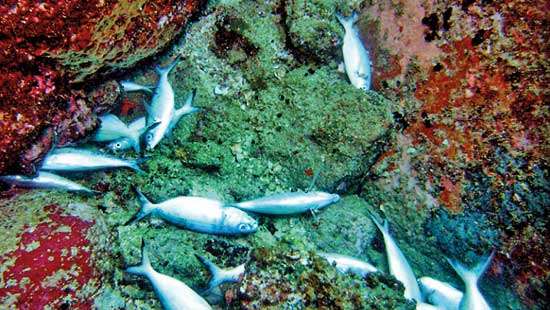
‘Spike in blast fishing’ poses renewed threats to Sri Lanka’s marine ecosystems
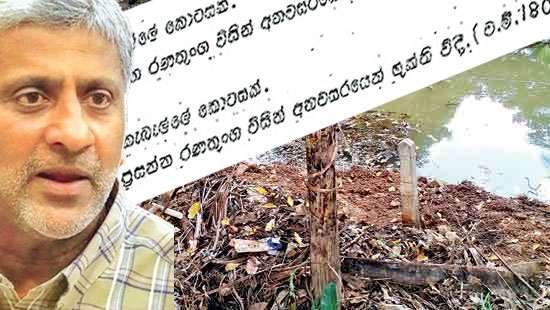
UDA owned land in Thalawathugoda; UDA Minister Prasanna Ranatunga under the spotlight for forceful occupation of reserved land

Loss-making SMIB faces political pressure in recovering loans

Baltimore Bridge Collapse: MV Dali, SL authorities anchored in mystery?
US authorities are currently reviewing the manifest of every cargo aboard MV

Has Sri Lanka become a potential hub for the illegal wildlife trade?
On March 26, a couple arriving from Thailand was arrested with 88 live animal

Spotlight on Moragahakanda Development Project Moragolla villagers lose livelihoods and down to one meal a day
According to villagers from Naula-Moragolla out of 105 families 80 can afford

Ambitious Sri Lankan jobseekers ‘trafficked into Ukraine war zones’
Is the situation in Sri Lanka so grim that locals harbour hope that they coul
Most Viewed in News
Street food vendor arrested for verbally harassing foreigner.

New Visa procedure implemented
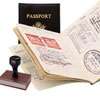
Racing event tragedy leaves seven dead including eight-year-old child

Sri Lankan among NASA’s new crew for next simulated Mars journey

SL on alert on possible genocide allegations by Canada

Two racing drivers arrested over Fox Hill tragedy

MIRROR CRICKET
Is chamari athapaththu sri lanka’s greatest cricketer ever.
24 Apr 2024 - 4 - 877

Athapaththu back atop ICC Women’s ODI Batting Rankings
23 Apr 2024 - 1 - 833

Chamari Athapaththu sets big goal for T20 World Cup
19 Apr 2024 - 6 - 1285

How does CSK get best out of Pathirana?
16 Apr 2024 - 17 - 3668
TODAY'S HEADLINES
Sl took minimal steps to punish officials who committed human rights abuses: us report.
24 Apr 2024
Iranian President’s visit Sri Lanka withstands western pressure
25 tons of solid waste disposed along sri pada route, temperature rises to ‘caution’ level.

Sri Lanka secures third spot in South Asian Kurash Championship 2024
23 Apr 2024

Army forms committee to probe Diyatalawa Fox Hill Supercross accident
Indian cricket manager indicted for legend cricket league match-fixing allegations.
22 Apr 2024
Watch CBS News
U.S. issues travel warning for Israel with Iran attack believed to be imminent and fear Gaza war could spread
By Debora Patta , Tucker Reals
Updated on: April 13, 2024 / 5:25 PM EDT / CBS News
Update: Iran launched drone attacks against Israel on Saturday. Read CBS News' latest coverage here .
Tel Aviv — Israel is bracing for a worst-case scenario that U.S. officials believe could materialize within just hours — the possibility of a direct attack on Israeli soil by Iran in retaliation for a strike almost two weeks ago that killed seven Iranian military officers. Iran has vowed to take revenge for Israel killing its commanders, who were hit by an April 1 strike on the Iranian embassy in Syria's capital.
Two U.S. officials told CBS News that a major Iranian attack against Israel was expected as soon as Friday, possibly to include more than 100 drones and dozens of missiles aimed at military targets inside the country. Sources have told CBS News the retaliation could include attacks carried out both by Iranian forces, and proxy groups around the region that it has been funneling additional arms to for weeks.
The officials said it would be challenging for the Israelis to defend against an attack of that magnitude, and while they held out the possibility that the Iranians could opt for a smaller-scale attack to avoid a dramatic escalation, their retaliation was believed to be imminent.
Asked Friday how imminent he believes an attack is, President Biden responded, "I don't want to get into secure information, but my expectation is sooner than later." The president urged Iran not to move forward, saying his message to Tehran was: "Don't."
Tehran has not indicated publicly how or when it will return fire, so it's unclear how far Iran's leaders will go. If they decide to carry out a direct attack on Israel, there's fear it could blow Israel's ongoing war against Iranian ally Hamas up into a much wider regional conflict.
With the Iranian retaliation expected at any time, the U.S. State Department on Thursday warned Americans in Israel not to travel outside major cities, which are better protected from incoming rocket fire by the country's Iron Dome missile defense system. The latest guidance noted that travel by U.S. government employees in Israel could be further restricted with little notice as things develop in the tinderbox region.
"Whoever harms us, we will harm them," Prime Minister Benjamin Netanyahu vowed Thursday as he visited troops at an Israel Defense Forces airbase. "We are prepared … both defensively and offensively."

On Saturday, all U.S. embassies in the Middle East were put on high alert and required to hold emergency action committee meetings. Diplomats in Lebanon and Israel were specifically told not to travel to certain areas within those countries.
Sima Shine, a security expert and former official with Israel's national intelligence agency Mossad, told CBS News it was a dangerous moment for the region, and the "most worried" she has been. She said anxiety over an all-out war was likely just as high "on both sides, in Israel and in Iran."
If Iran does choose to strike Israel directly, it could involve a complex missile and drone attack similar to the one Iranian forces launched against a Saudi oil facility in 2019 .
"They will try to do it on the military or some military asset," Shine predicted. "But the question will be the damage. If there would be many injured people, killed or injured … I think it has the potential for a huge escalation."
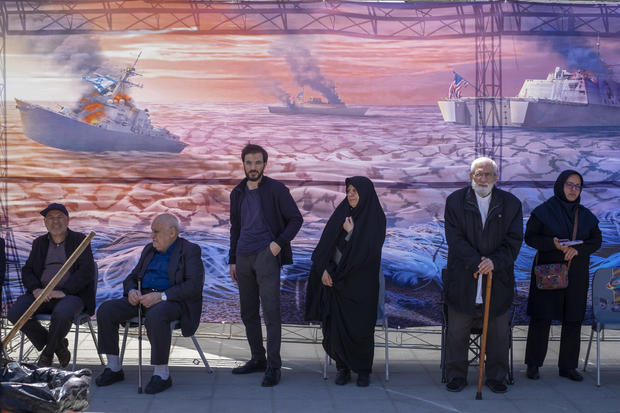
Shine stressed, however, that she still believes neither side actually wants a regional conflict.
U.S. "really trying to avoid war"
The U.S. sent a senior general to Israel this week to coordinate with the close American ally on any response it might make to an Iranian attack. Speaking Friday on "CBS Mornings," America's top military officer said, "we're really trying to avoid war."
"This is part of the dialogue that I have with my counterparts within the region, to include the Israeli chief of defense, who I talked to yesterday," said Joint Chiefs chairman Gen. Charles Q. Brown, Jr., adding that the U.S. military was "doing things not only to prevent a war, but at the same time, one of my primary things is to make sure all the forces in the region are protected."
"My role, as the chairman of the Joint Chiefs, is to plan and prepare," Brown said. "That's one thing we do very well."
Brown's Israeli counterpart, Chief of the General Staff Lt. Gen. Herzi Halevi, "completed a comprehensive situational assessment on the readiness of the IDF for all scenarios," Israel's military said Friday.
"The IDF is very strongly prepared, both offensively and defensively, against any threat," Halevi was quoted as saying in the statement. "The IDF continues to monitor closely what is happening in Iran and different arenas, constantly preparing to deal with existing and potential threats in coordination with the United States Armed Forces."
The IDF said the visiting U.S. general, Central Command chief Gen. Michael Erik Kurilla, was taking part in the IDF's situational assessment.
The dilemma for Iran, said Israeli expert Shine, is to figure out how to deliver its promised response to Israel's attack in Syria, but in a way that does not lead to further escalation. Likewise, Shine said Israel could choose to show restraint when it responds to whatever Iran eventually does.
If either side gets the balance wrong, the consequences for the region, and even the world, could be dire.
Weijia Jiang, David Martin, Margaret Brennan and Olivia Gazis contributed reporting.
- Middle East
- Benjamin Netanyahu
Debora Patta is a CBS News foreign correspondent based in Johannesburg. Since joining CBS News in 2013, she has reported on major stories across Africa, the Middle East and Europe. Edward R. Murrow and Scripps Howard awards are among the many accolades Patta has received for her work.
More from CBS News
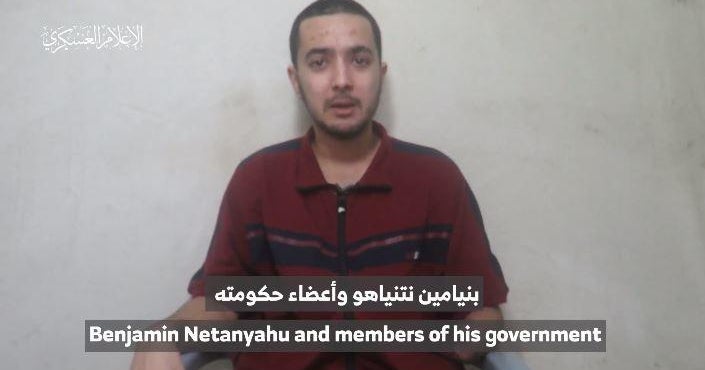
Hamas releases video of Israeli-American hostage Hersh Goldberg-Polin

Pelosi says Netanyahu "should resign"
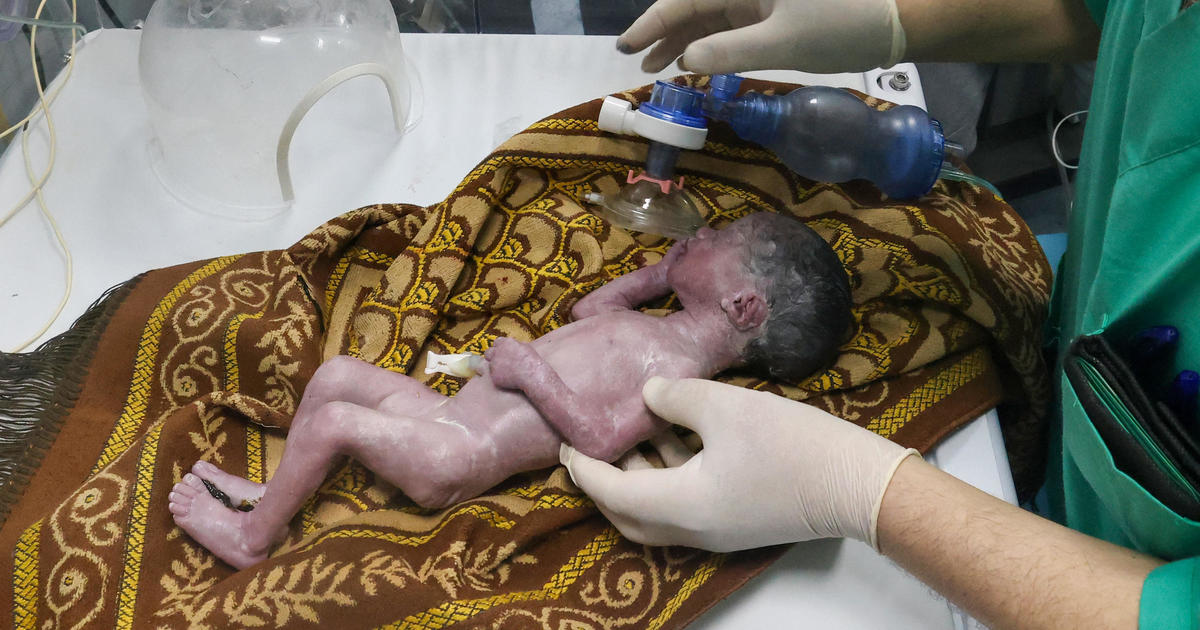
Baby saved from dying mother's womb after Israeli airstrike named in her honor

Why the U.S. is investigating an ultra-Orthodox Israeli army battalion

IMAGES
VIDEO
COMMENTS
Enroll in the Smart Traveler Enrollment Program (STEP) to receive security messages and make it easier to locate you in an emergency. Call us in Washington, D.C. at 1-888-407-4747 (toll-free in the United States and Canada) or 1-202-501-4444 (from all other countries) from 8:00 a.m. to 8:00 p.m., Eastern Standard Time, Monday through Friday ...
Read the country information page for additional information on travel to Iran. If you are currently in Iran: Read the Department of State's COVID-19 page before planning any international travel, and read the COVID-19 page for the U.S. Virtual Embassy in Iran for country-specific COVID-19 information.
COVID-19: All eligible travelers should be up to date with their COVID-19 vaccines. Please see Your COVID-19 Vaccination for more information. COVID-19 vaccine. ... Use the Healthy Travel Packing List for Iran for a list of health-related items to consider packing for your trip. Talk to your doctor about which items are most important for you.
Travel Advisory. January 11, 2024. Iran - Level 4: Do Not Travel. O D K U T. Updated to add the Terrorism Risk Indicator and risk of surrogacy tourism. Do not travel to Iran due to the risk of terrorism, civil unrest, kidnapping and the arbitrary arrest of U.S. citizens. Exercise increased caution due to wrongful detentions.
There are no COVID-19 testing or vaccination requirements for travellers entering Iran. Passport validity requirements If you visit Iran against FCDO advice, your passport should be valid for a ...
April 7, 2022. The Iranian government Wednesday removed coronavirus-related restrictions on citizens entering the country. The Civil Aviation Authority made the decision following a meeting with the Islamic Republic's COVID-19 task force. There are no more travel bans from any country related to the virus. Travelers can enter Iran provided ...
Foreign Nationals. Foreign Nationals travelling to Iran are required to present at the port of entry (POE) a negative Covid-19 (PCR) test result in English (approved by the Iranian Embassy, if in local language) taken maximum 96 hours before arrival.
Iran is to impose a one-week lockdown and a ban on road travel amid a fifth COVID-19 surge in the worst-hit country in the Middle East, state television reported on Saturday.
6 Dec 2021. Tehran, Iran - The Iranian government has launched a "smart protocols" plan that will impose some restrictions on those unvaccinated against COVID-19, as it aims for the country ...
New Covid-19 requirements for entry into Iran. PCR test or vaccination certificate required. All passengers travelling from Greece to Iran are required to present either a negative PCR test (valid for 72 hours after issuance) or a Covid-19 vaccination certificate (undertaken at least two weeks before the trip) upon arrival in Iran.
The COVID-19 pandemic in Iran has resulted in 7,627,186 confirmed cases of COVID-19 and 146,811 deaths.. On 19 February 2020, Iran reported its first confirmed cases of infections in Qom. The virus may have been brought to the country by a merchant from Qom who had travelled to China. In response, the Government of Iran cancelled public events and Friday prayers; closed schools, universities ...
Sea travel. Iran and the United Arab Emirates both claim sovereignty over the islands in the Gulf and the military patrols the waters. Foreigners navigating Iranian waters have been arrested and detained. In September 2019, Iranian authorities specifically called for the seizure of Canadian assets and vessels. ... COVID-19. Coronavirus disease ...
COVID-19 in Iran. Most countries worldwide present a risk of exposure to COVID-19. The risk of COVID-19, public health policy, and travel advice or restrictions may change quickly, therefore travellers should ensure they have access to up to date information on COVID-19 and be prepared for rapid changes in guidance both before and during travel.
Travel requirements by destination. Check back frequently for the latest COVID-19 travel and specific testing requirements for your destination, including any stops for connecting flights. You are required to come to the airport with the appropriate travel documents. To board the flight, you must meet the requirements for every country you will ...
COVID-19 - Airborne - ... A visa is required for all travel to Iran. Visas are given to tour groups or individuals with a sponsor in Iran. Women, and girls over the age of nine, should wear a headscarf in their visa application photos. Passports must have at least six months validity. Proof of yellow fever vaccination may be required if you ...
If you need consular assistance you should contact the British Embassy in Tehran . FCDO advises against all travel to Iran. British and British-Iranian dual nationals are at significant risk of ...
The Iran COVID-19 Self Declaration Form is a travel document that offers you valid entry into Iran. It does not replace a visa, but it is a lot easier to get than a paper visa and you can apply for it at iVisa.com by doing the following: Step 1: Complete the online questionnaire with your private information and select a processing speed.
If despite our advice you plan to travel to Iran, you'll need a specialised travel insurance policy that covers travel to high-risk destinations. Most Australian policies won't cover you for travel to Iran. ... COVID-19; Serious outbreaks sometimes occur. To protect yourself from illness: drink boiled water or bottled water with sealed lids;
The Department of Foreign Affairs strongly advises against all travel to Iran at this time due to the risk of arbitrary arrests of European citizens by the Iranian authorities. Iran does not recognise dual nationality. If you are an Irish citizen with Iranian nationality, or a dual Irish citizen who enters Iran on a non-Irish passport, our ...
What are the current COVID-19 entry restrictions to enter Iran? These travel restrictions are often changing depending on certain circumstances like your country of origin, so be sure of reading our Iran COVID-19 Self Declaration Form page to get the most updated information about this topic and thereby travel to Iran safely.
But, aside from the self-declaration form, you also have to keep in mind the Iran Covid quarantine and other travel requirements. Luckily, there are few restrictions to visiting this country. Still, we recommend you read the lines below to learn more about the Iran Covid quarantine and the Iran COVID-19 Self Declaration Form.
The U.S. issues new travel guidelines, warning that Iran will avenge the killings of senior commanders. The State Department has barred its employees from traveling to large parts of Israel.
This is the fourth major event that has disrupted international travel — the first being Covid-linked travel restrictions in 2020, followed by the Russia-Ukraine war in 2022, and the Israel ...
April 12, 2024, 4:44 AM PDT. By Yuliya Talmazan. The United States has restricted travel for its staff in Israel, as fears grow of an imminent retaliatory attack by Iran. The U.S. Embassy in ...
Oliver Dowden and Angela Rayner stand in for Rishi Sunak and Sir Keir Starmer at PMQs; the PM heralds his defence spending commitment on a trip to Germany.
According to him, Iran is currently having projects in 20 countries. The Uma Outa project, valued at $514 million, was started in 2010 under the Mahinda Rajapaksa government.
Catch the top stories of the day on ANC's 'Top Story' (18 April 2024)
Americans in Israel have been warned to limit their travel as U.S. officials say Iran is expected to launch an attack on the country as soon as Friday.